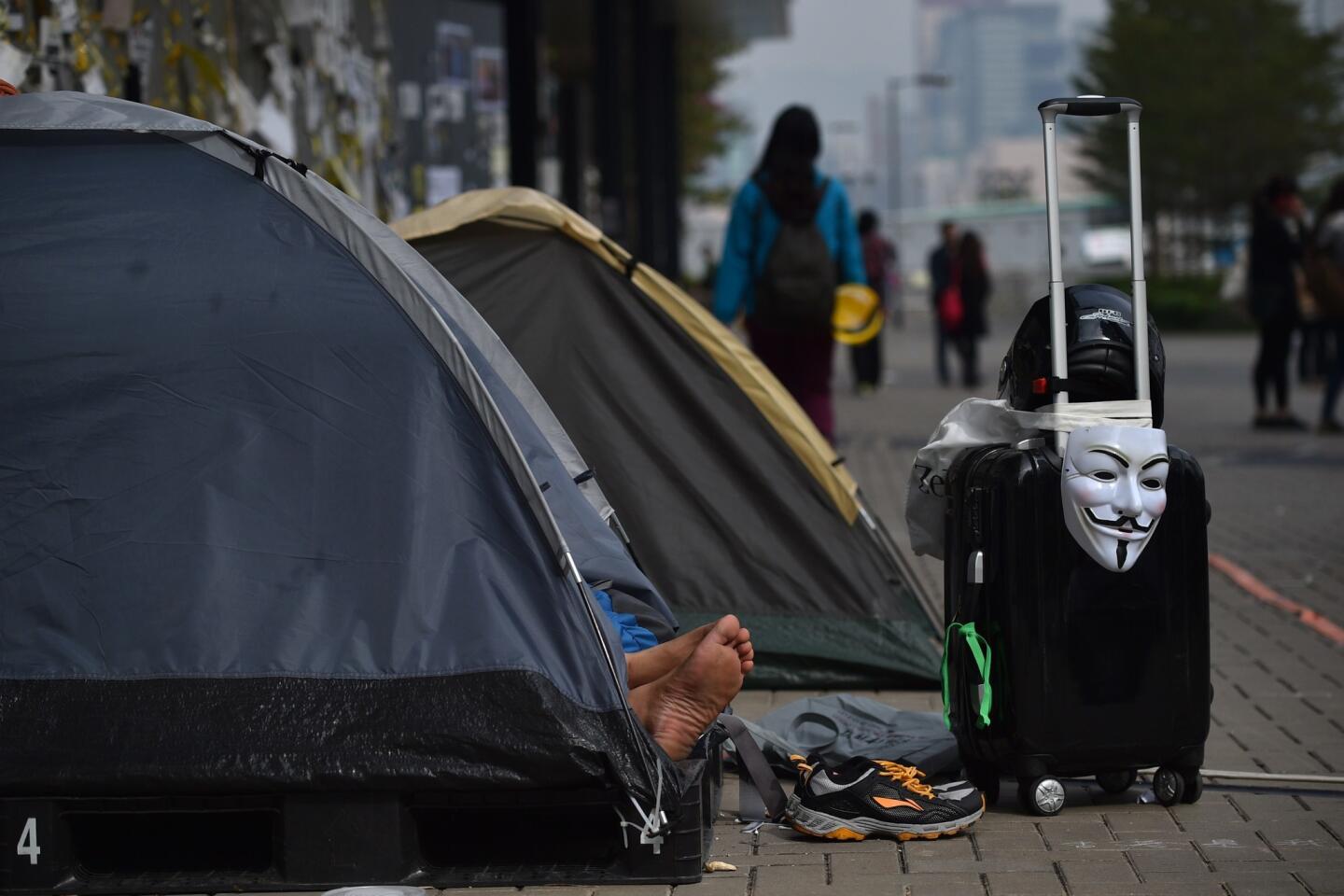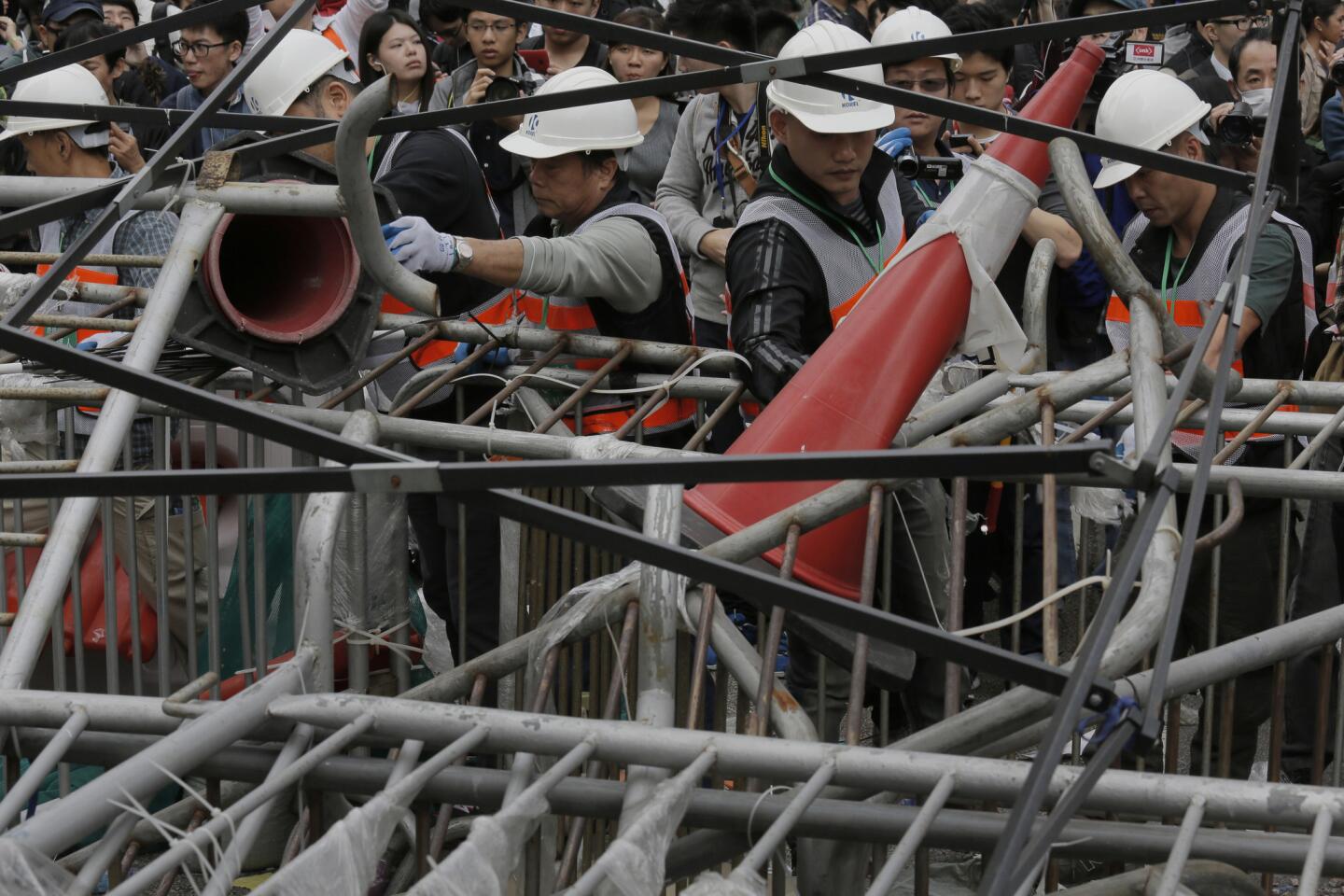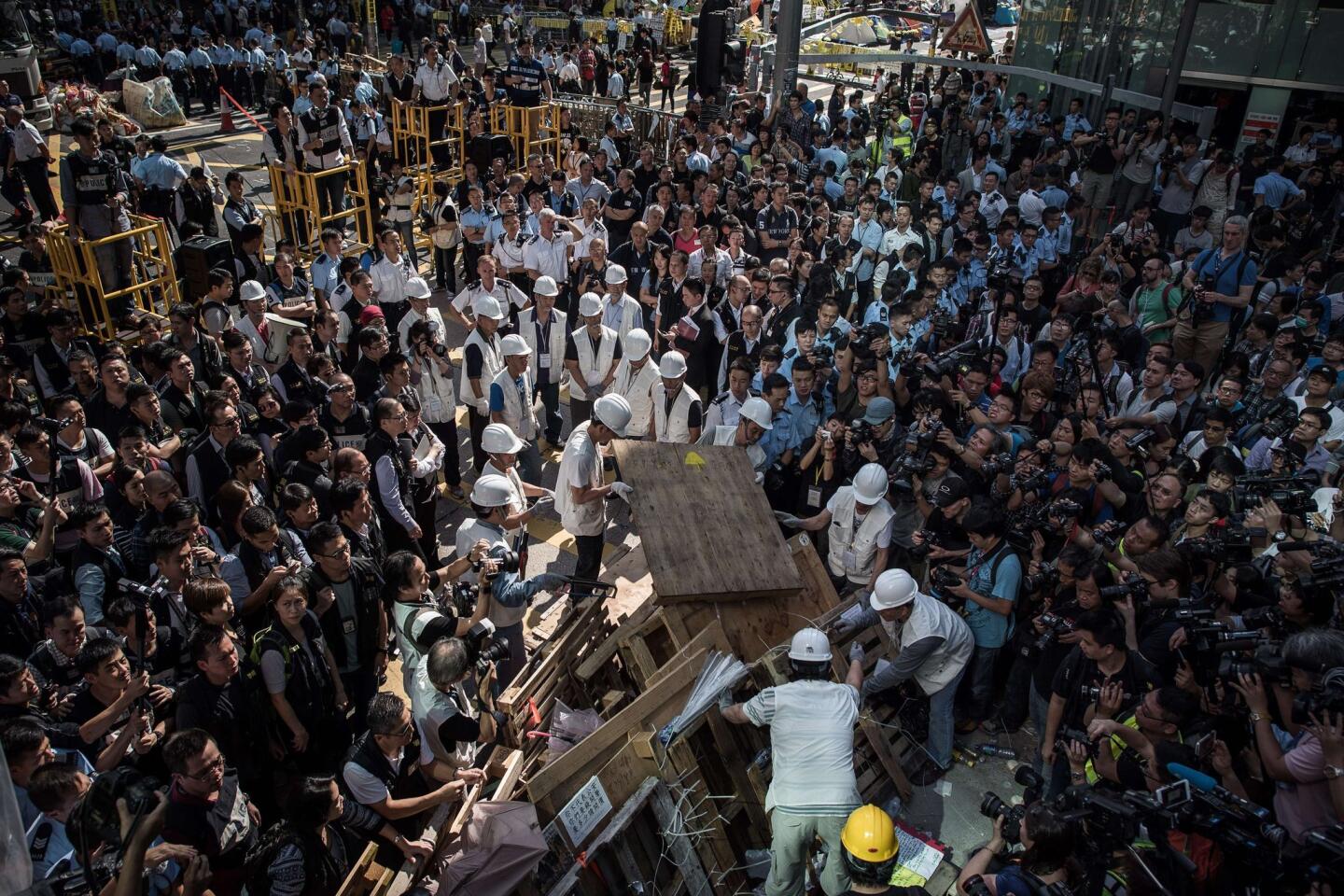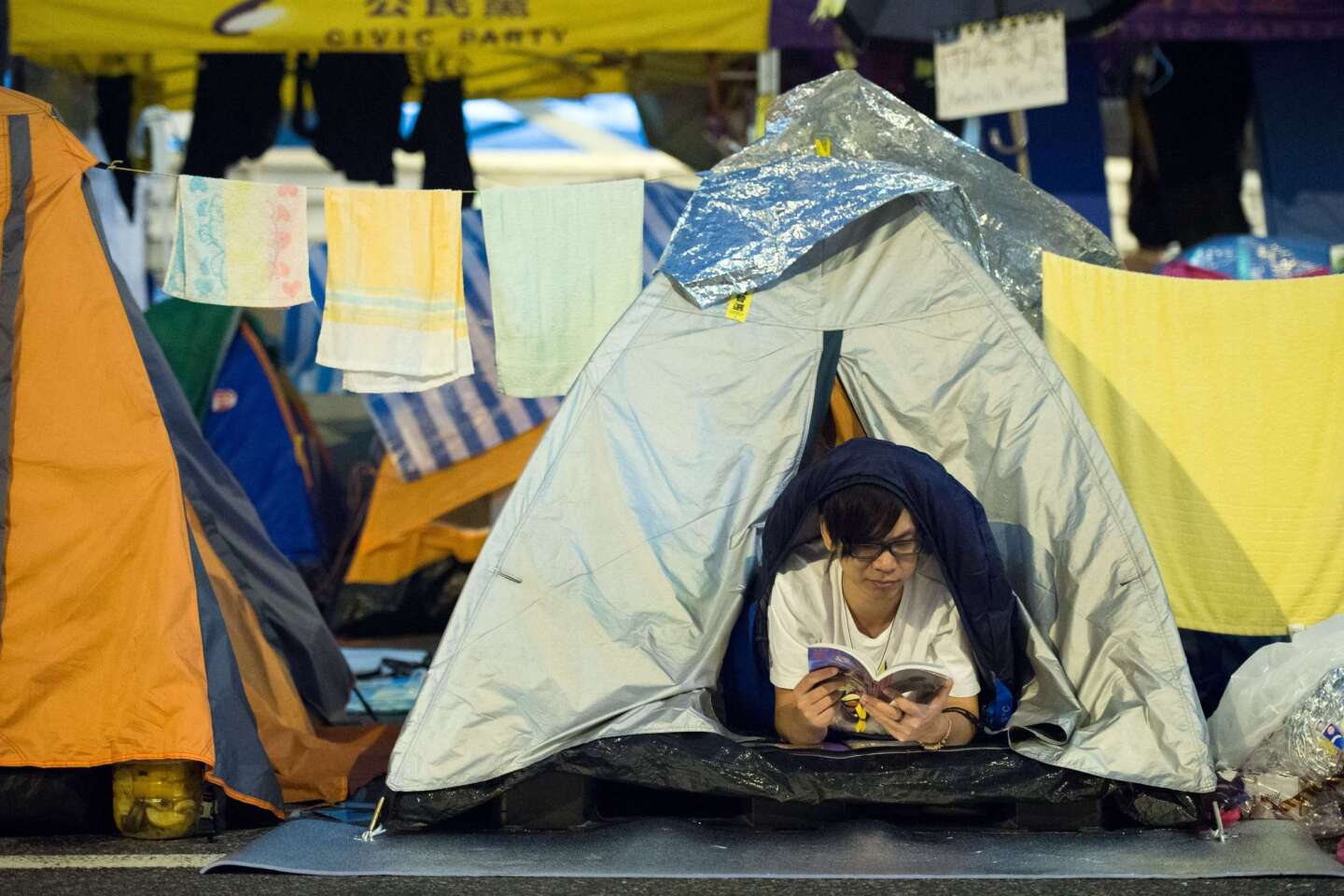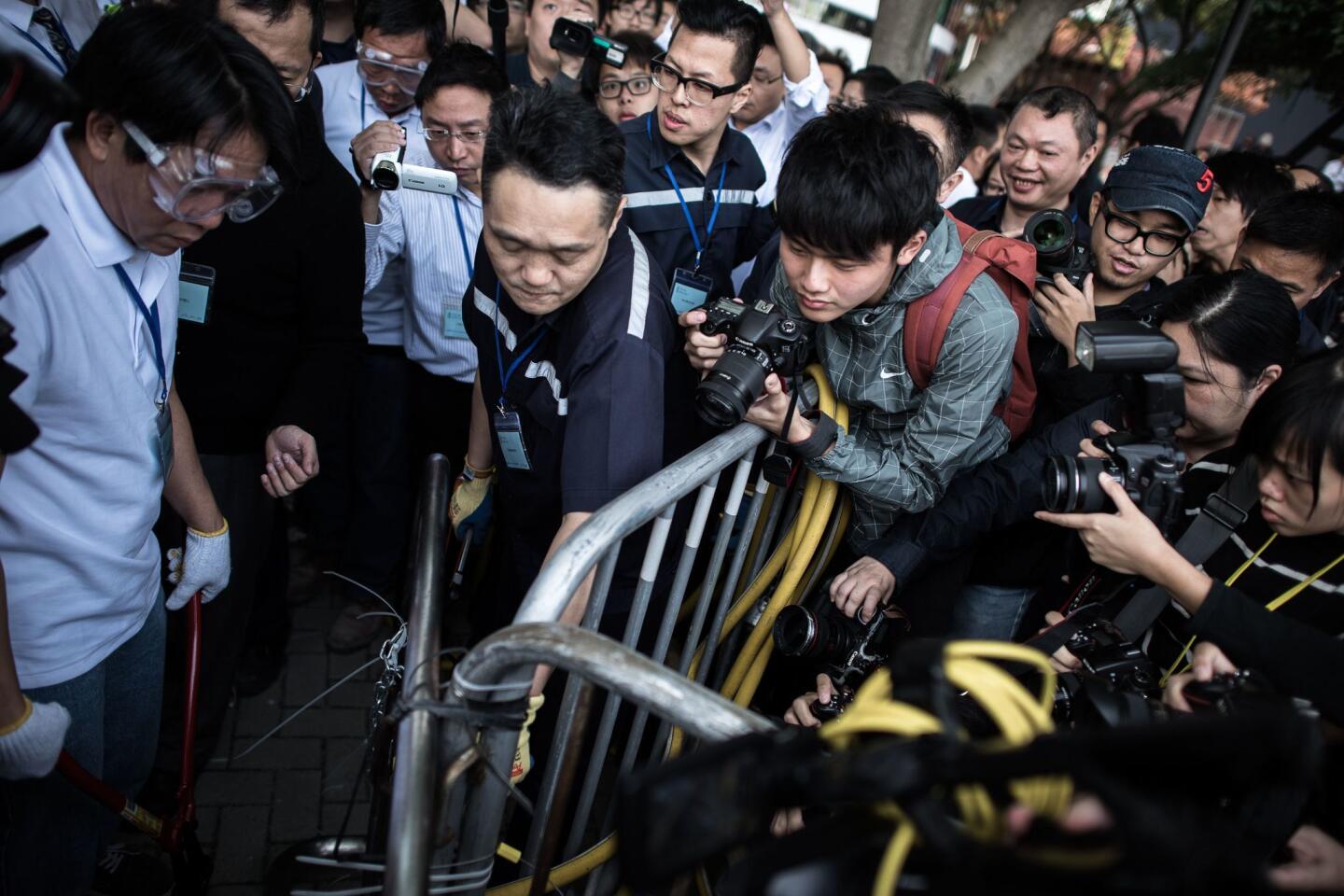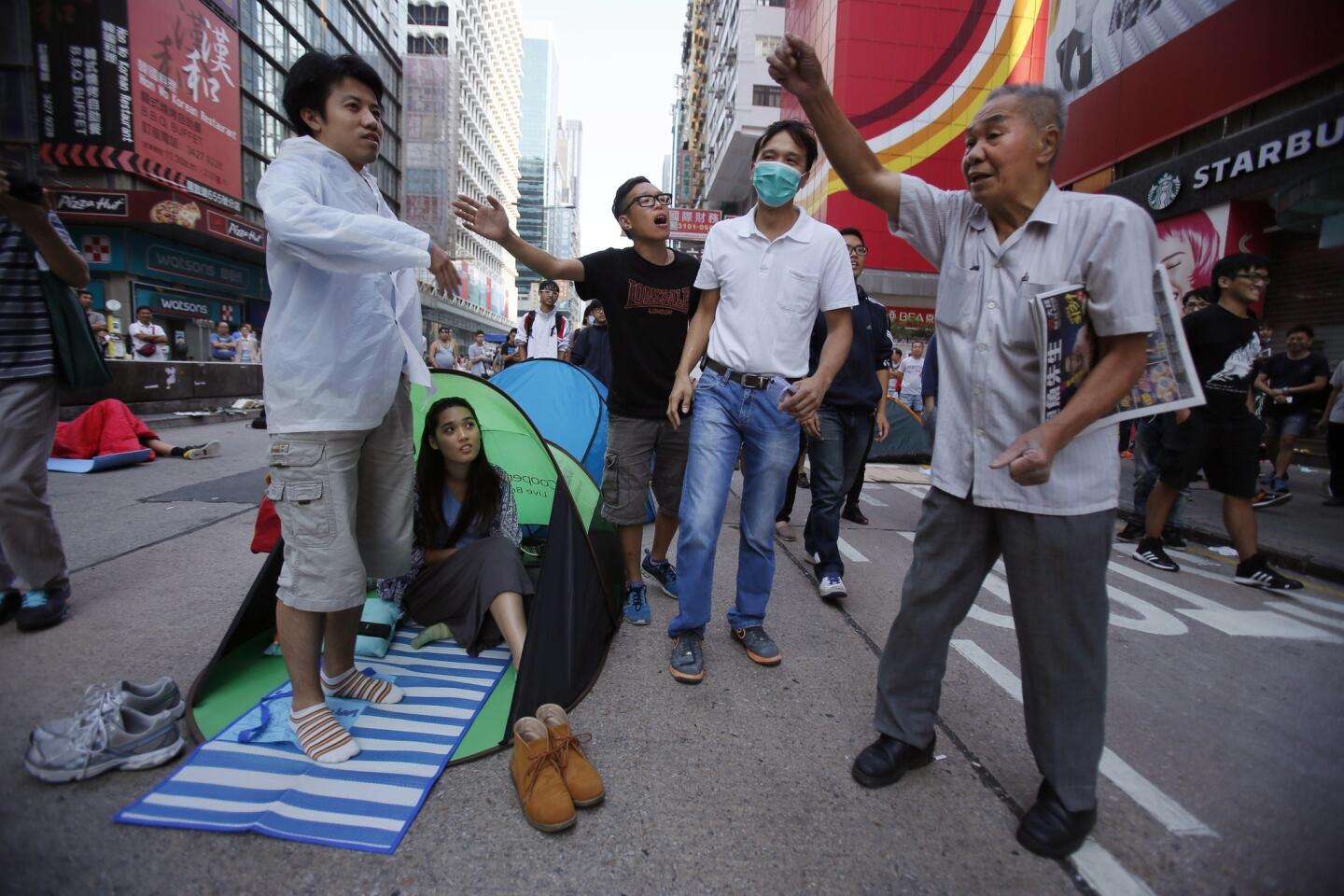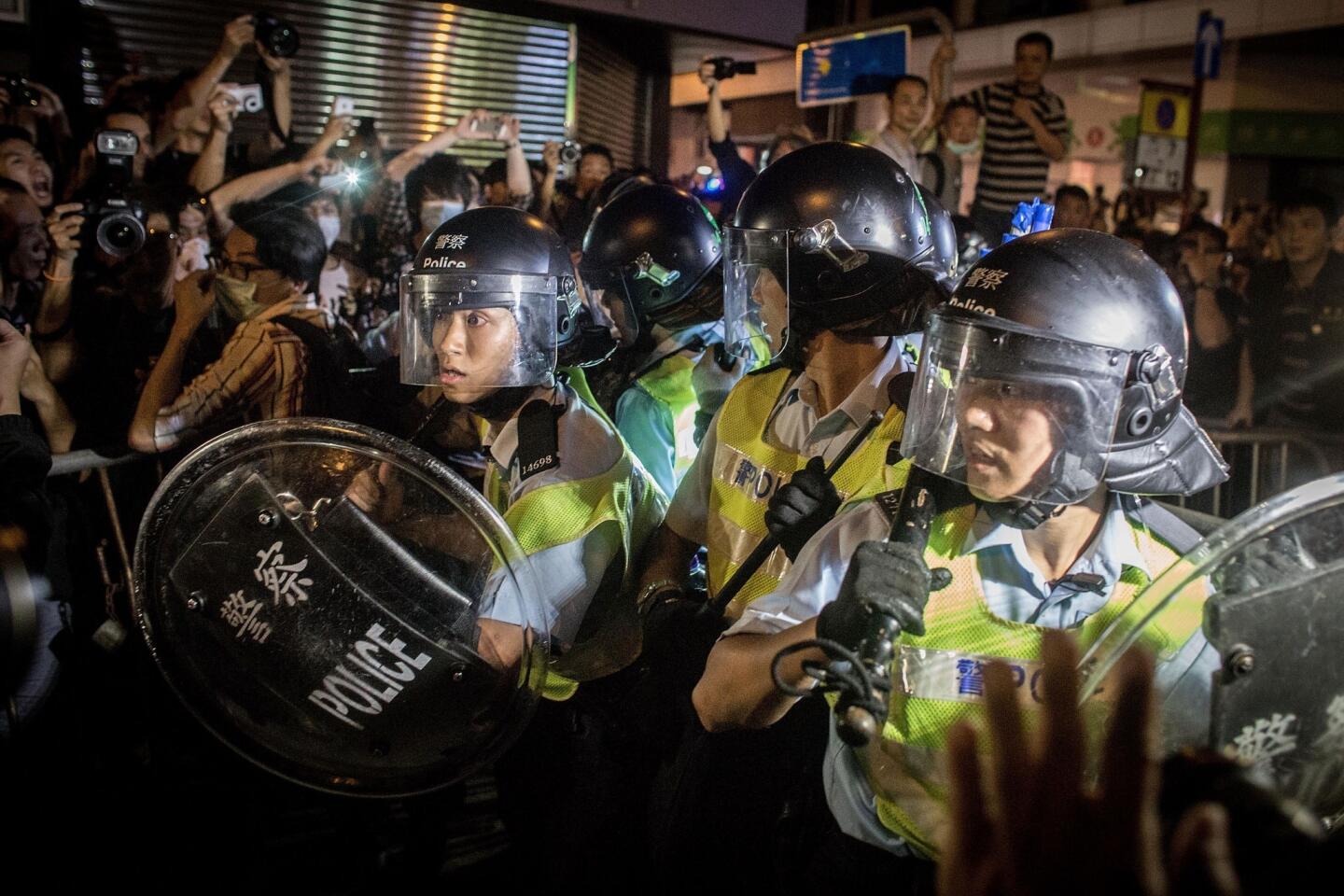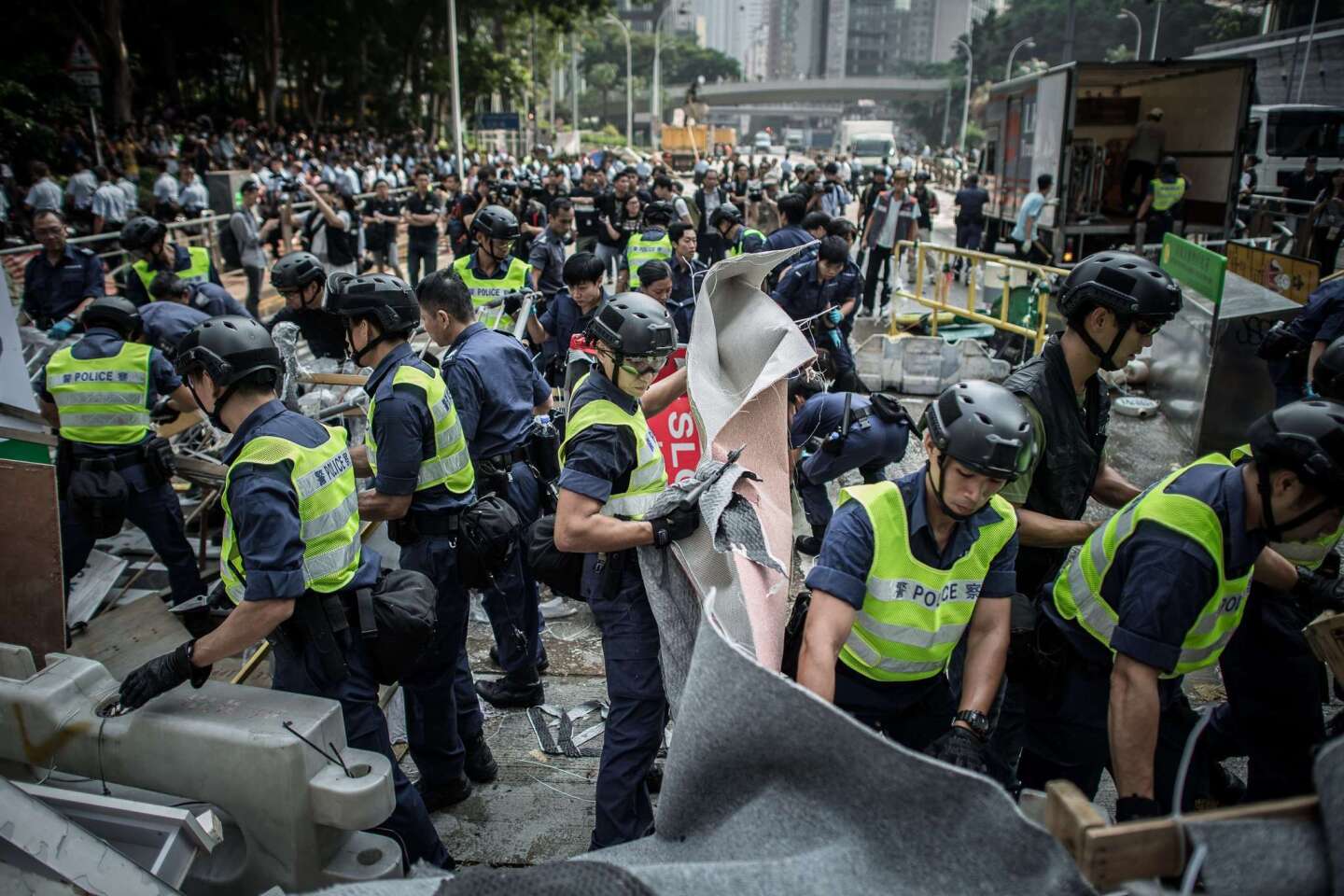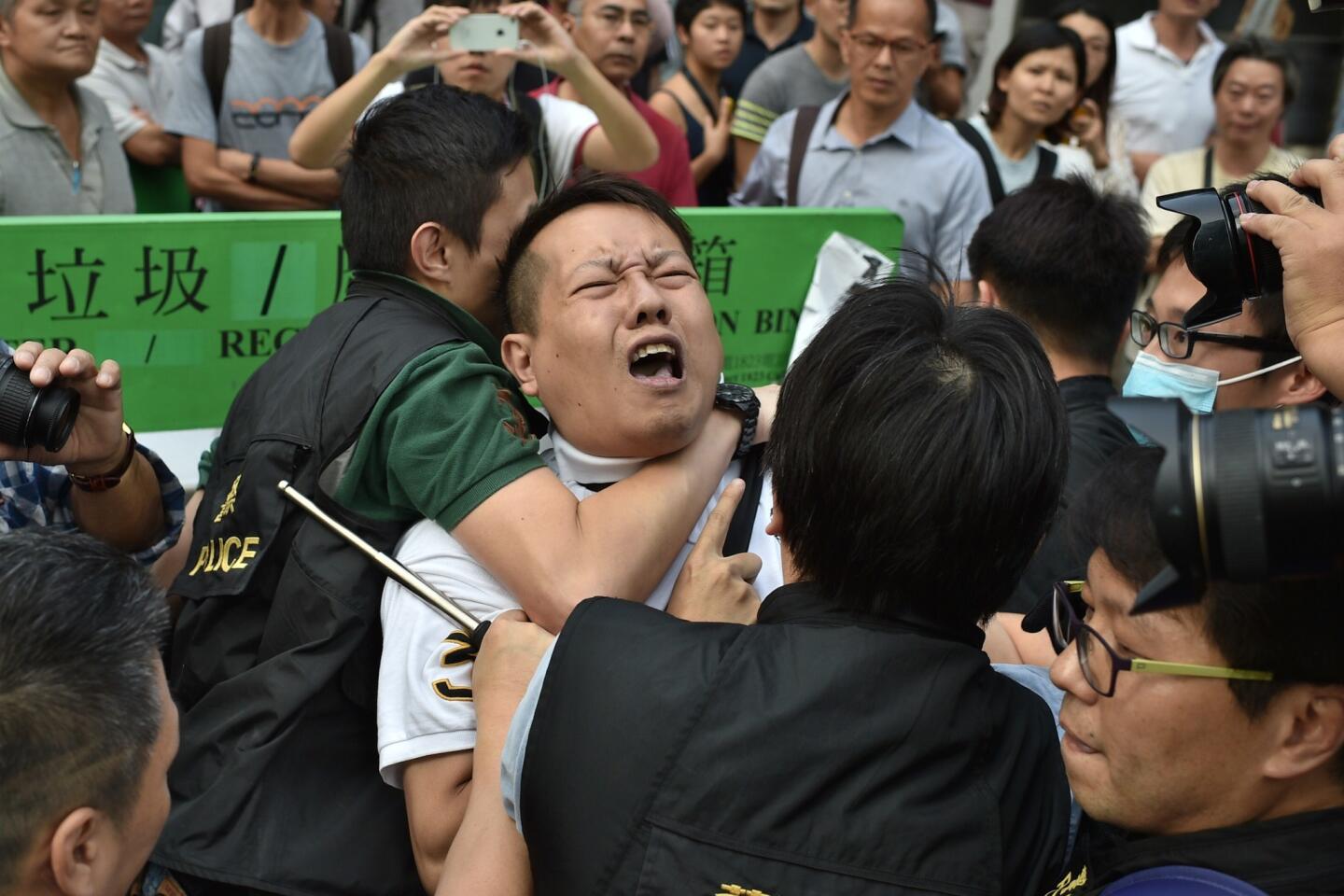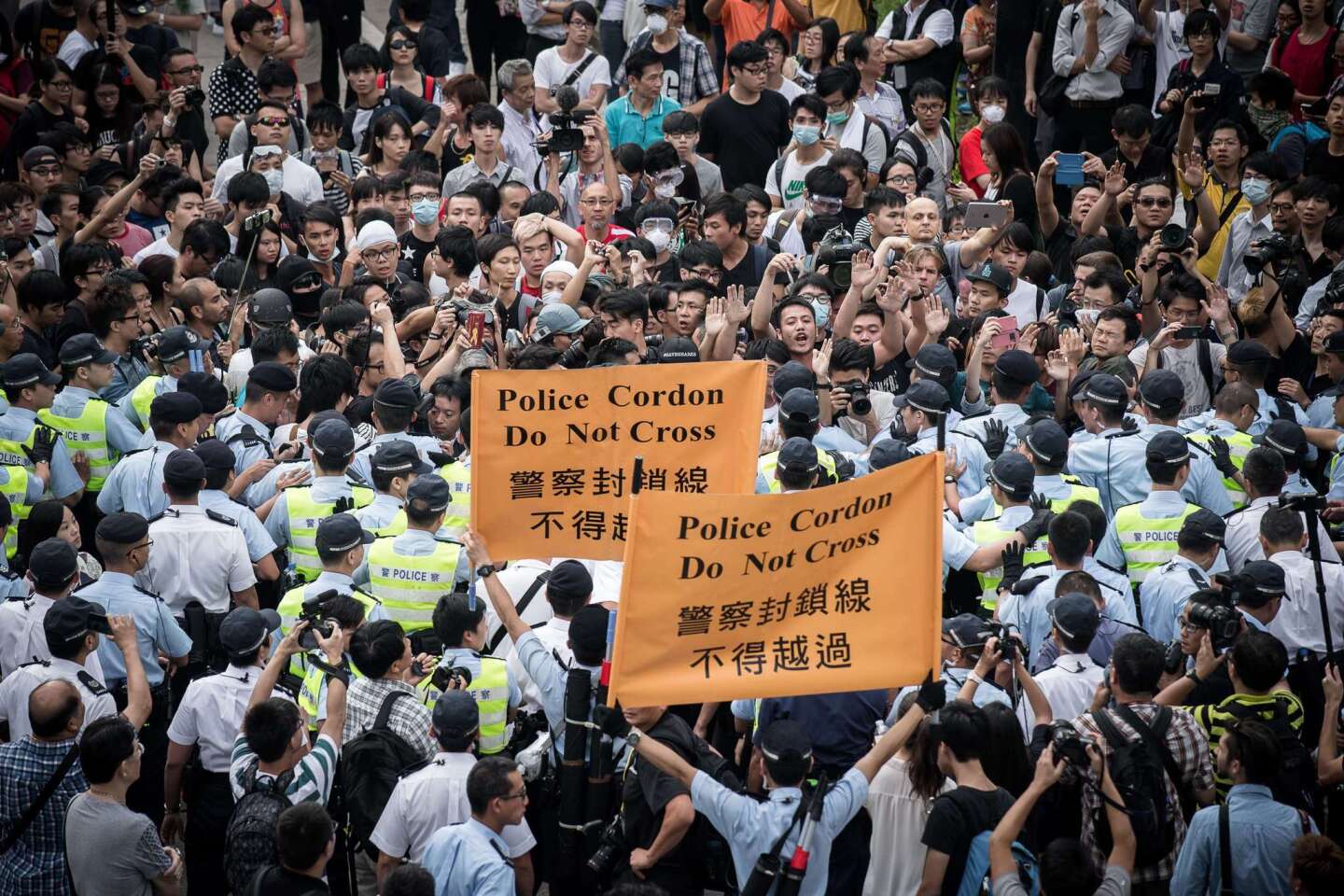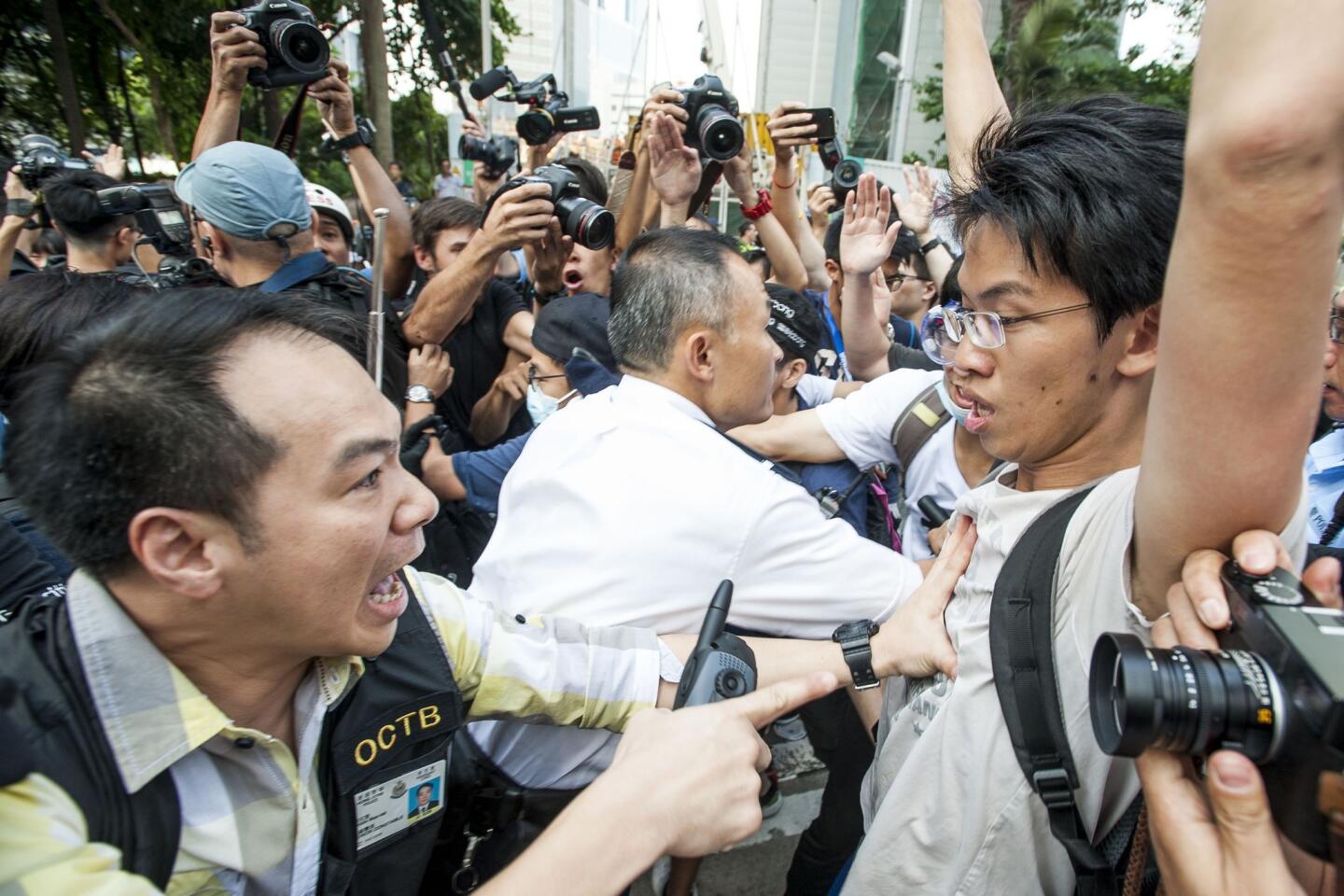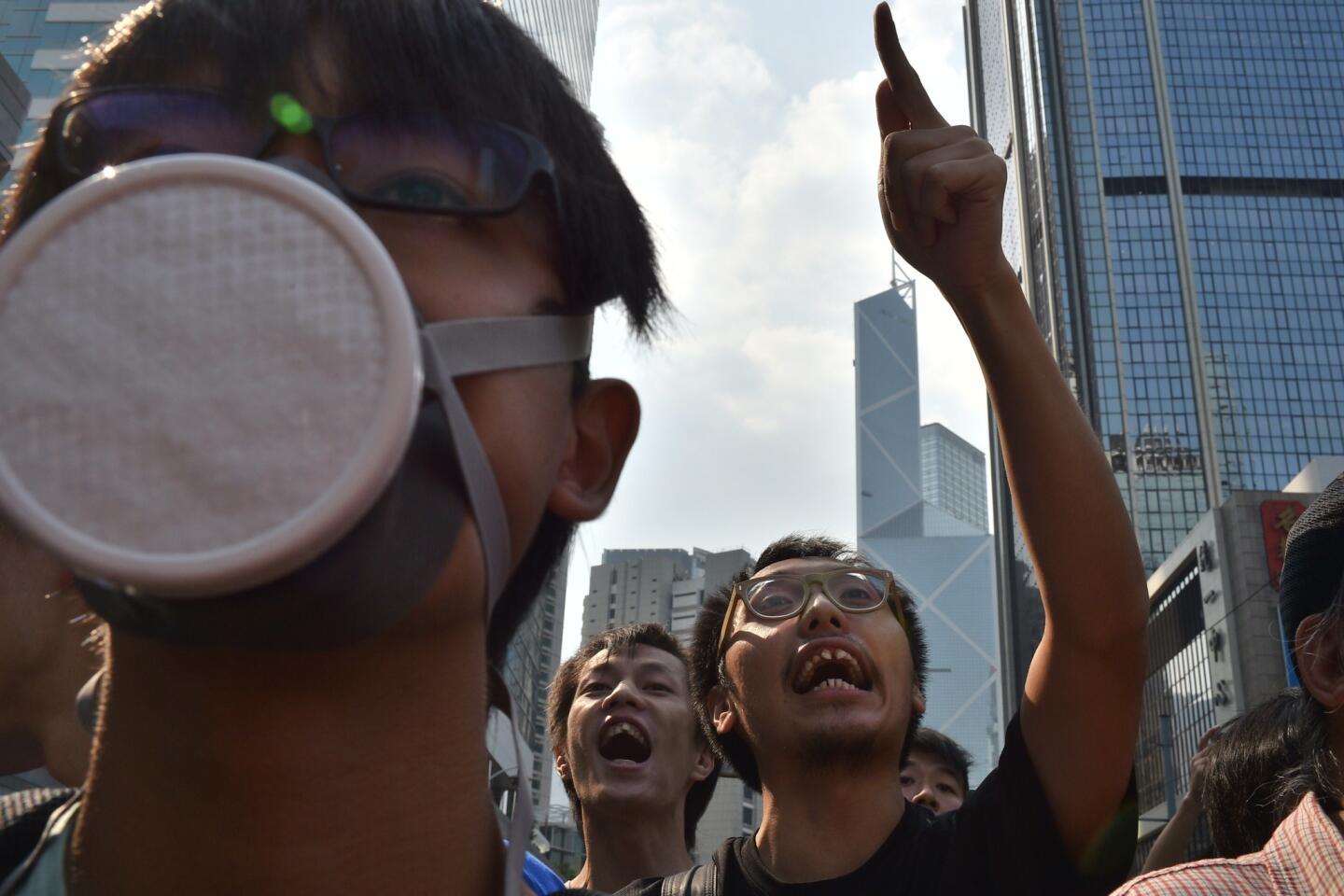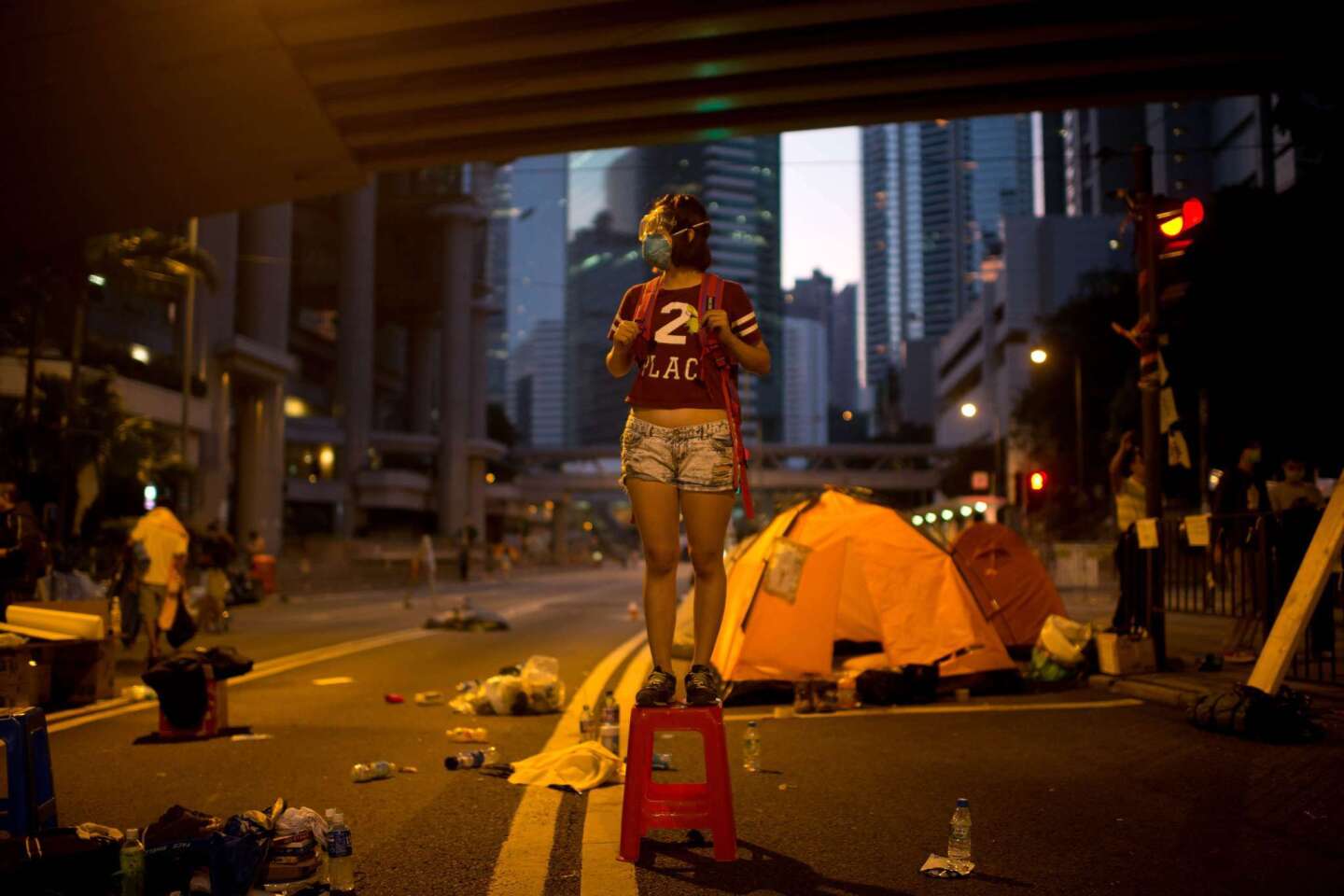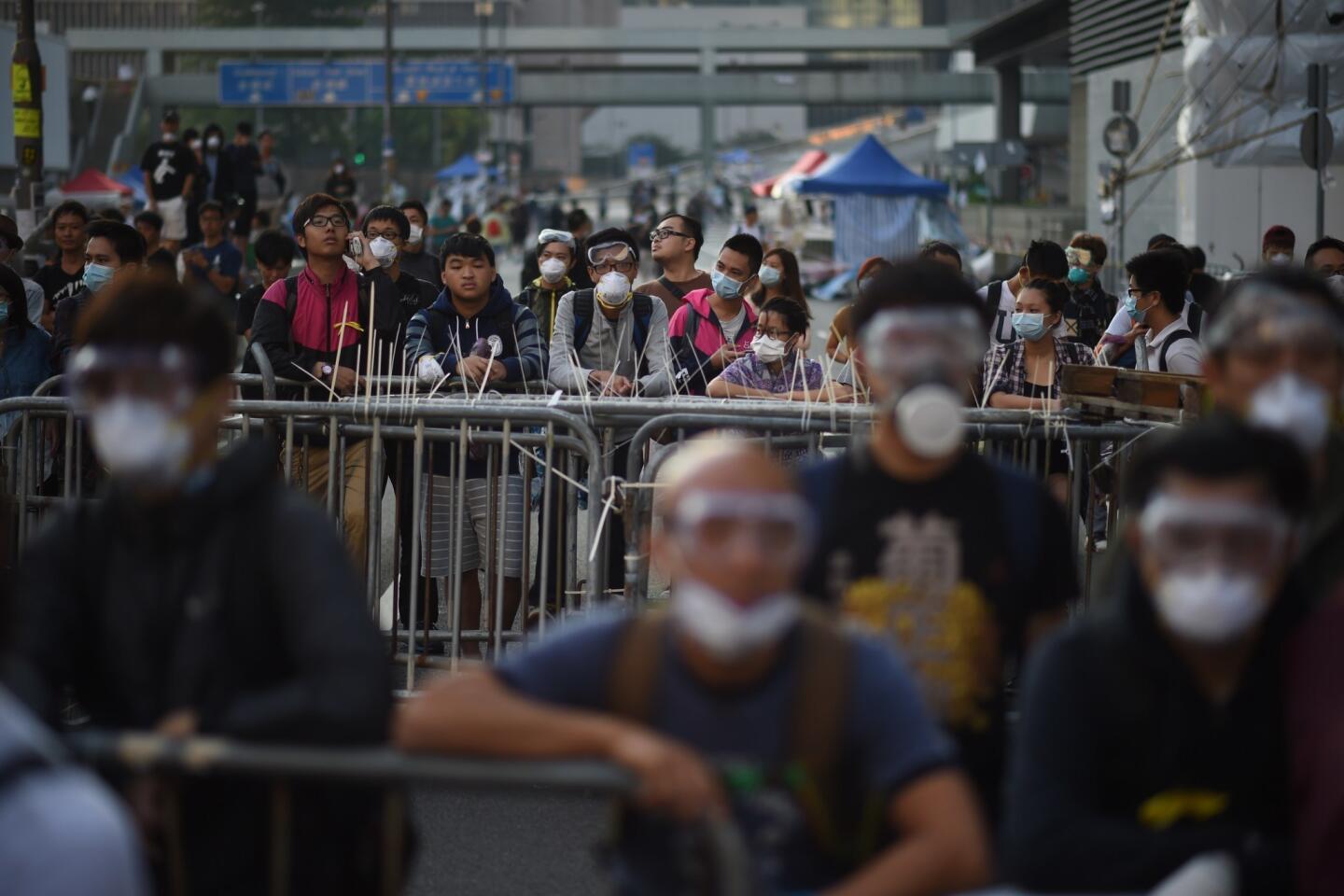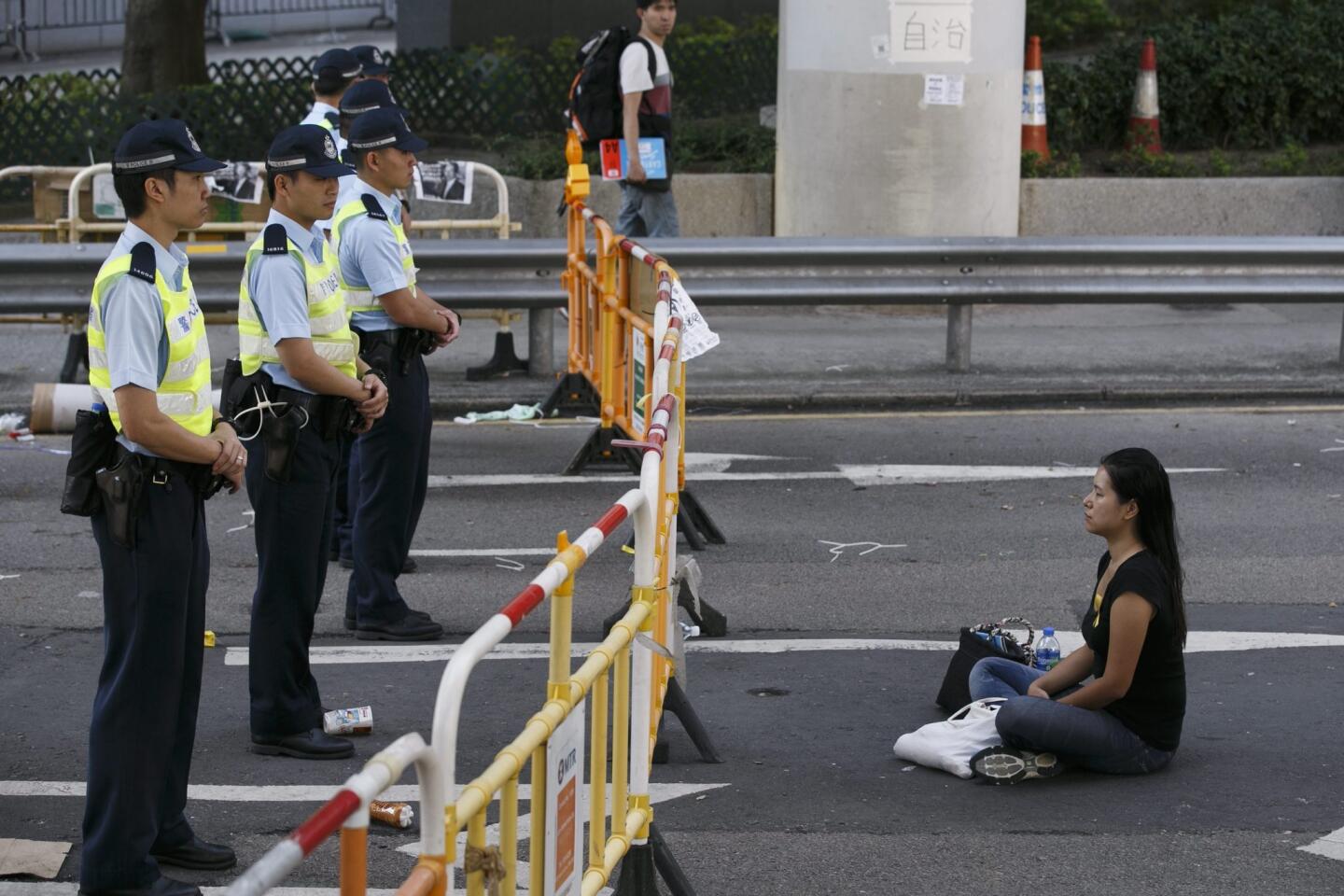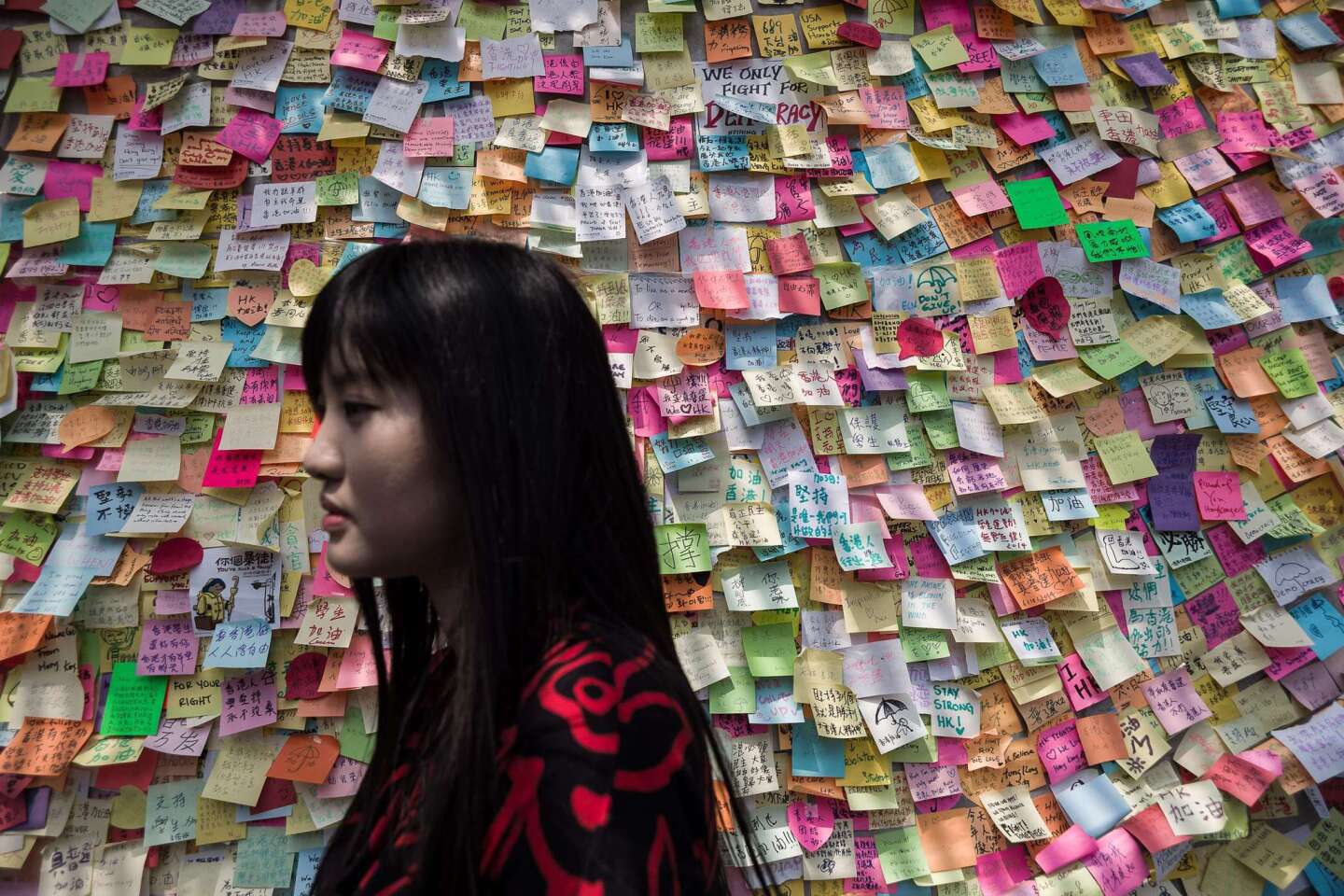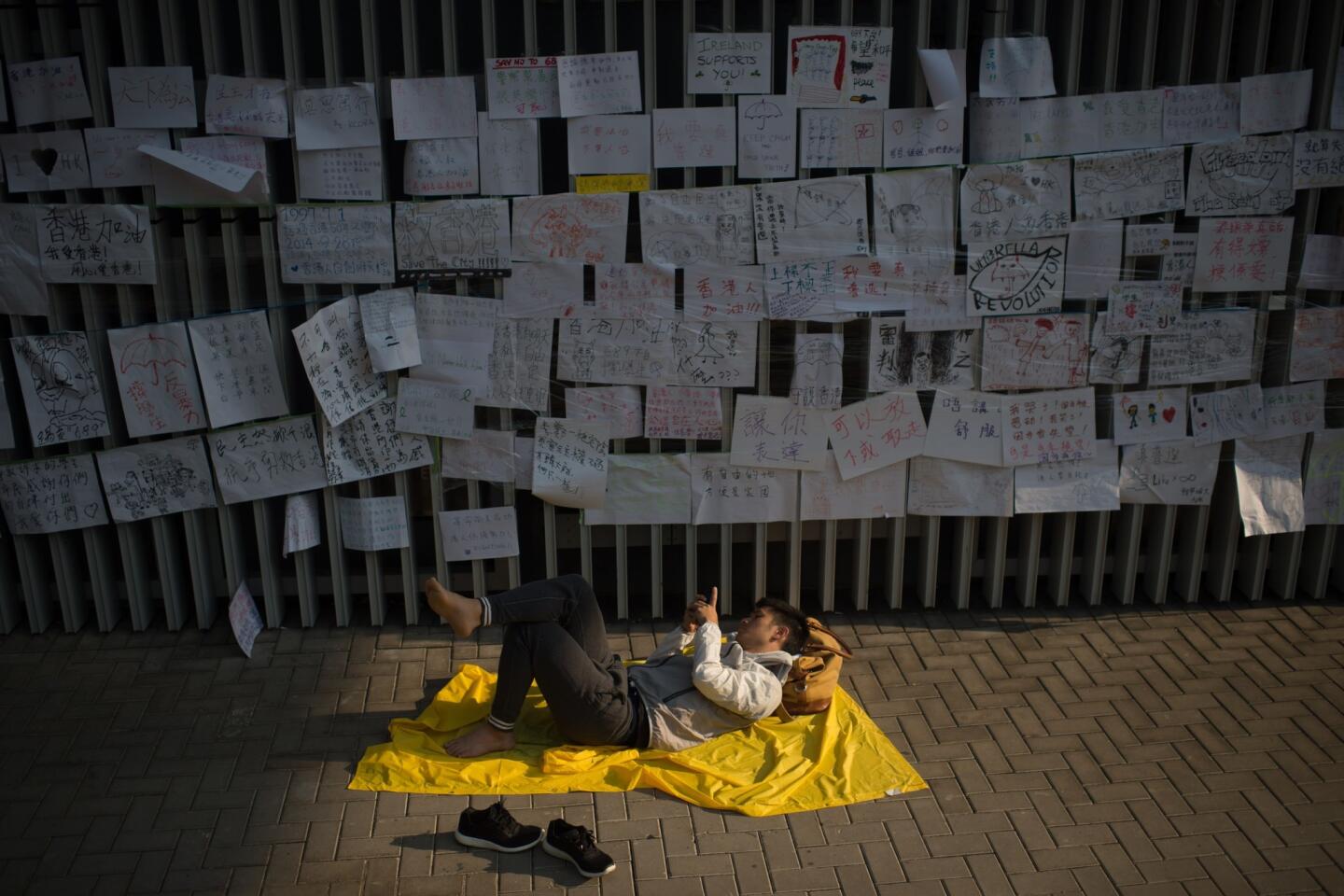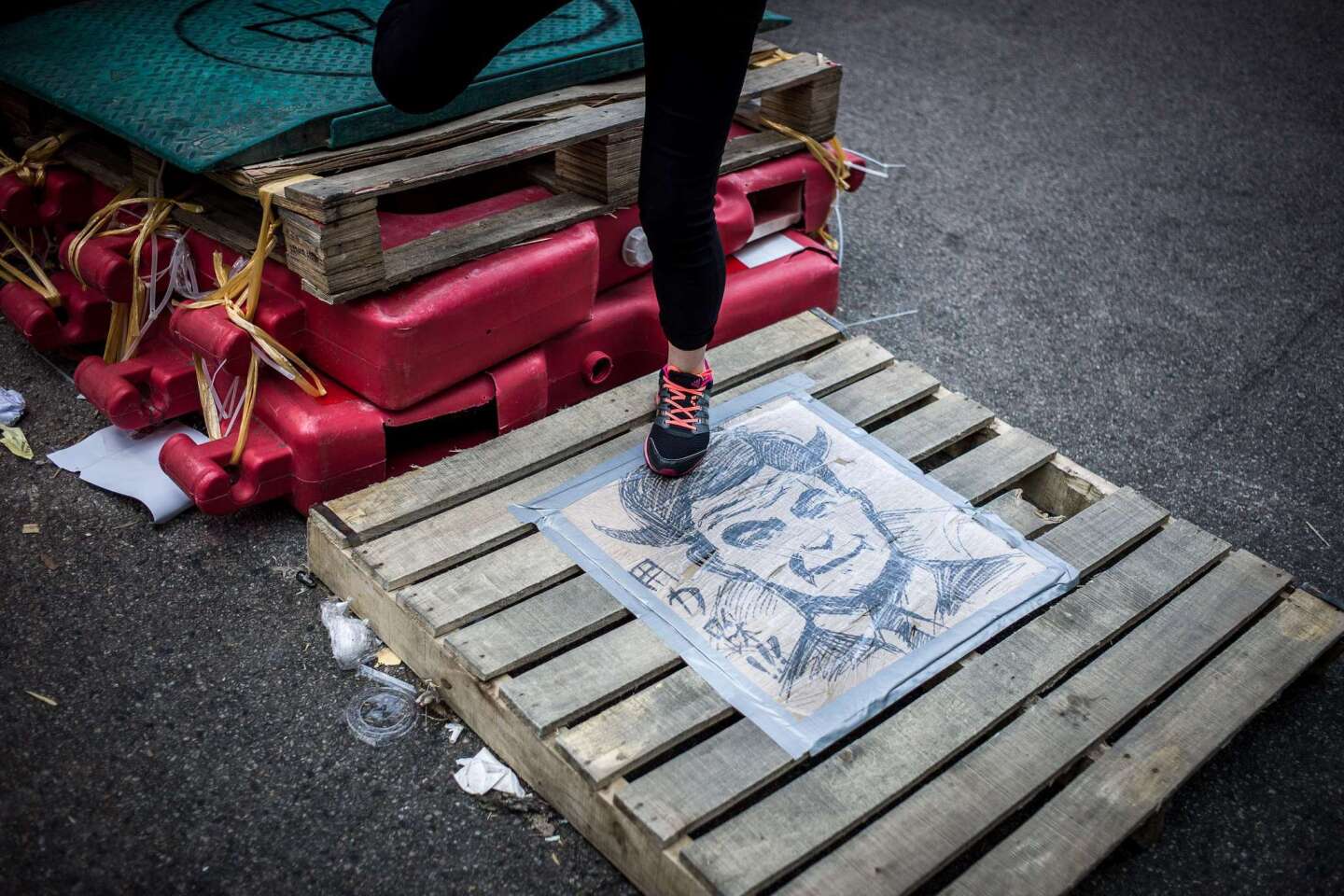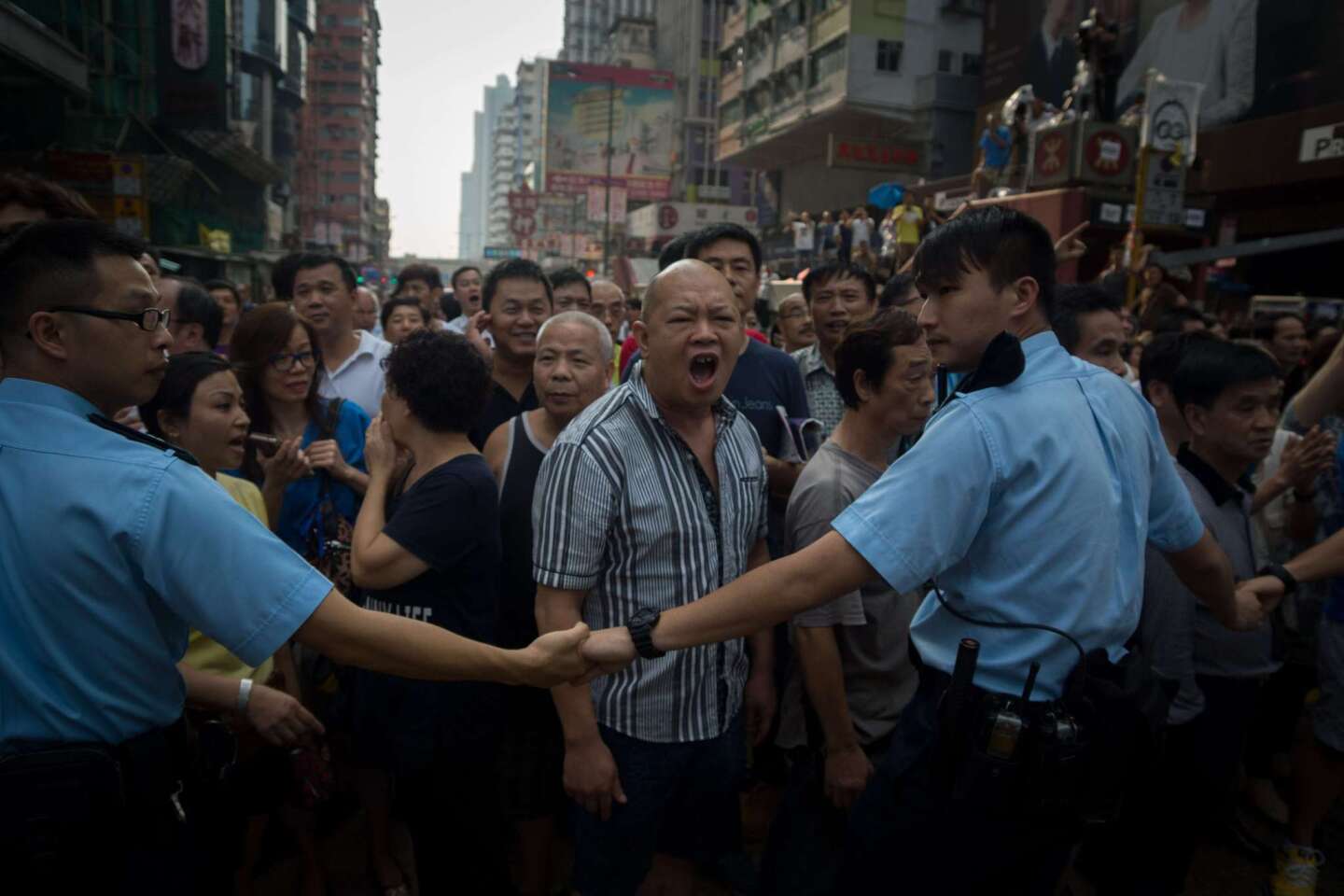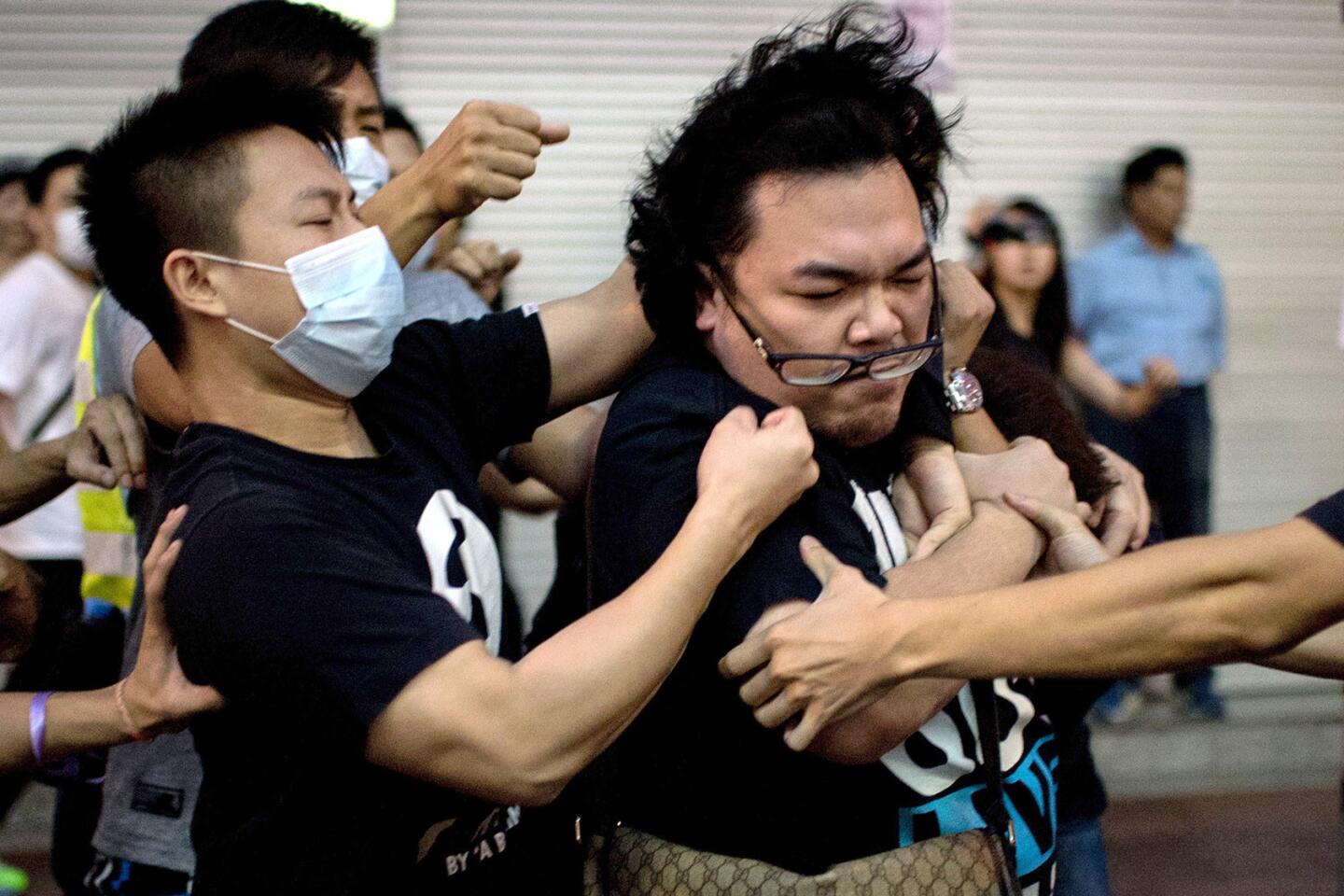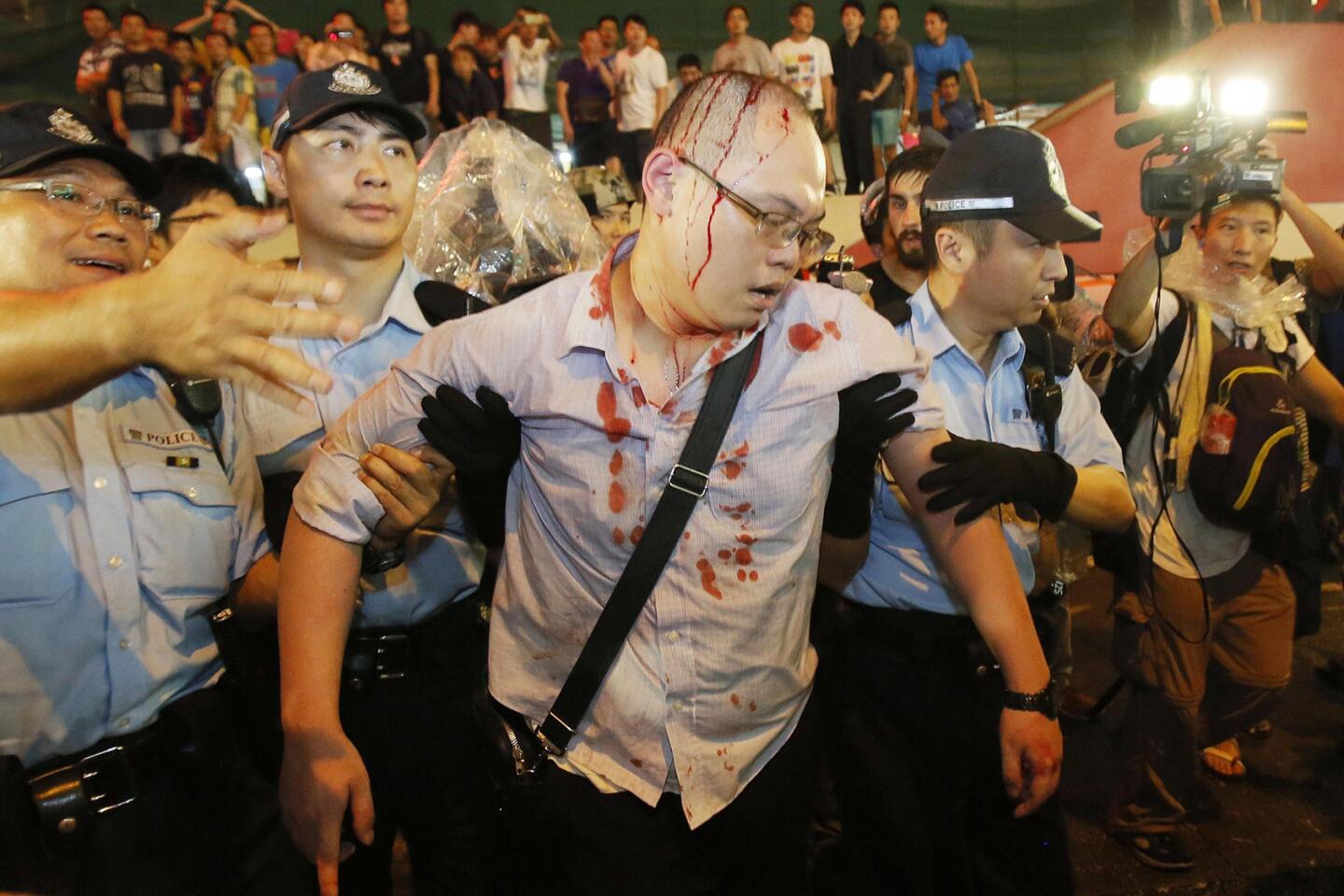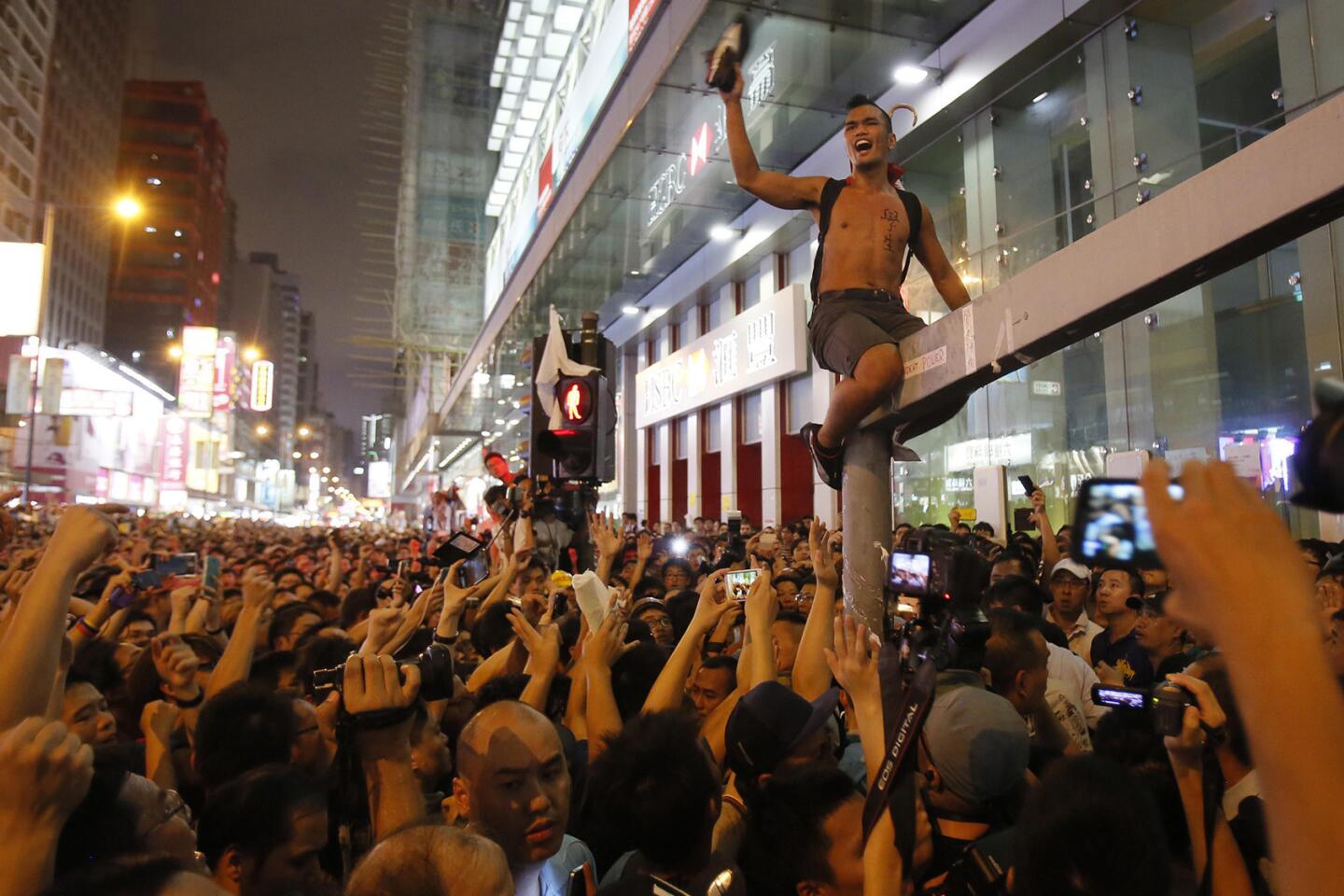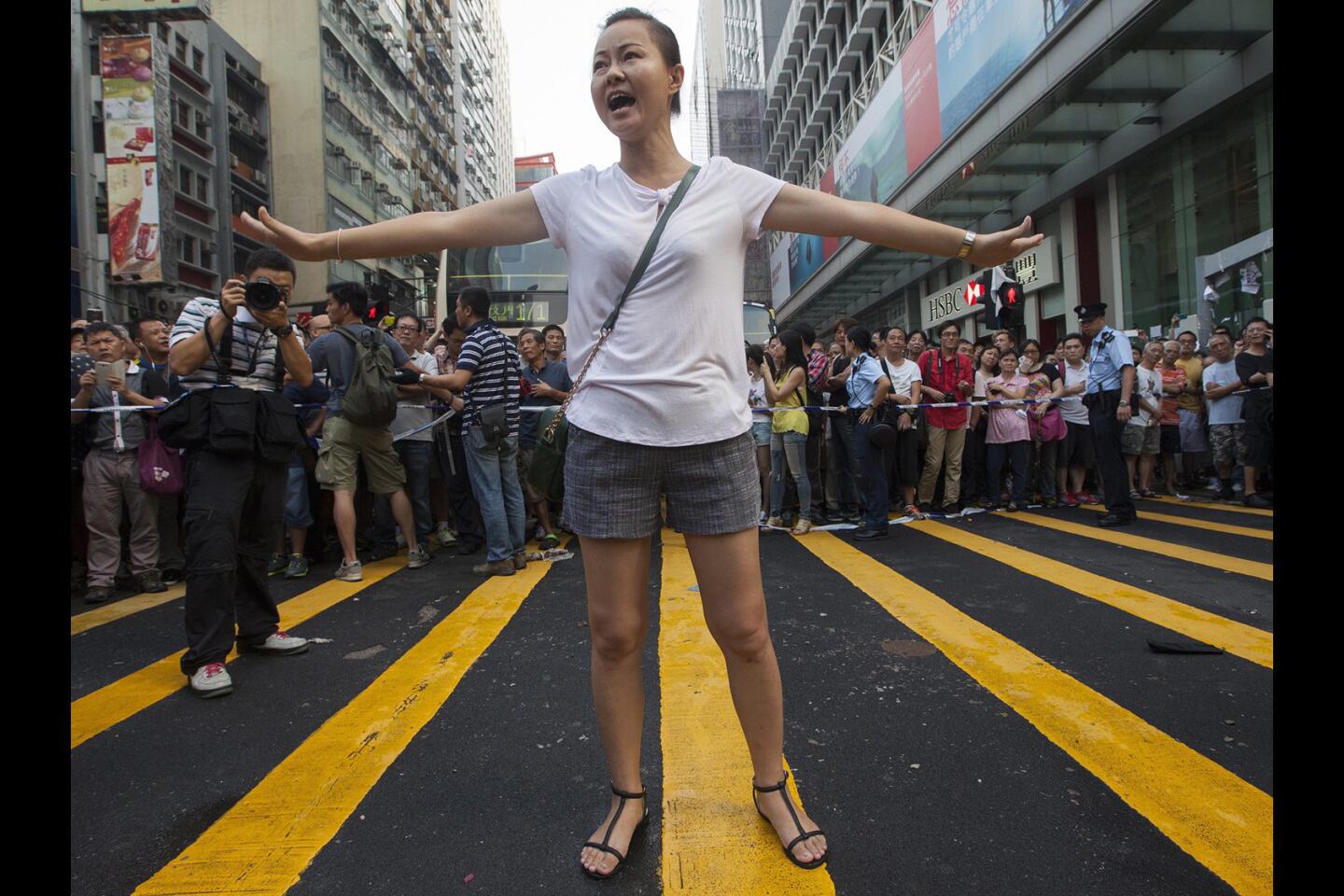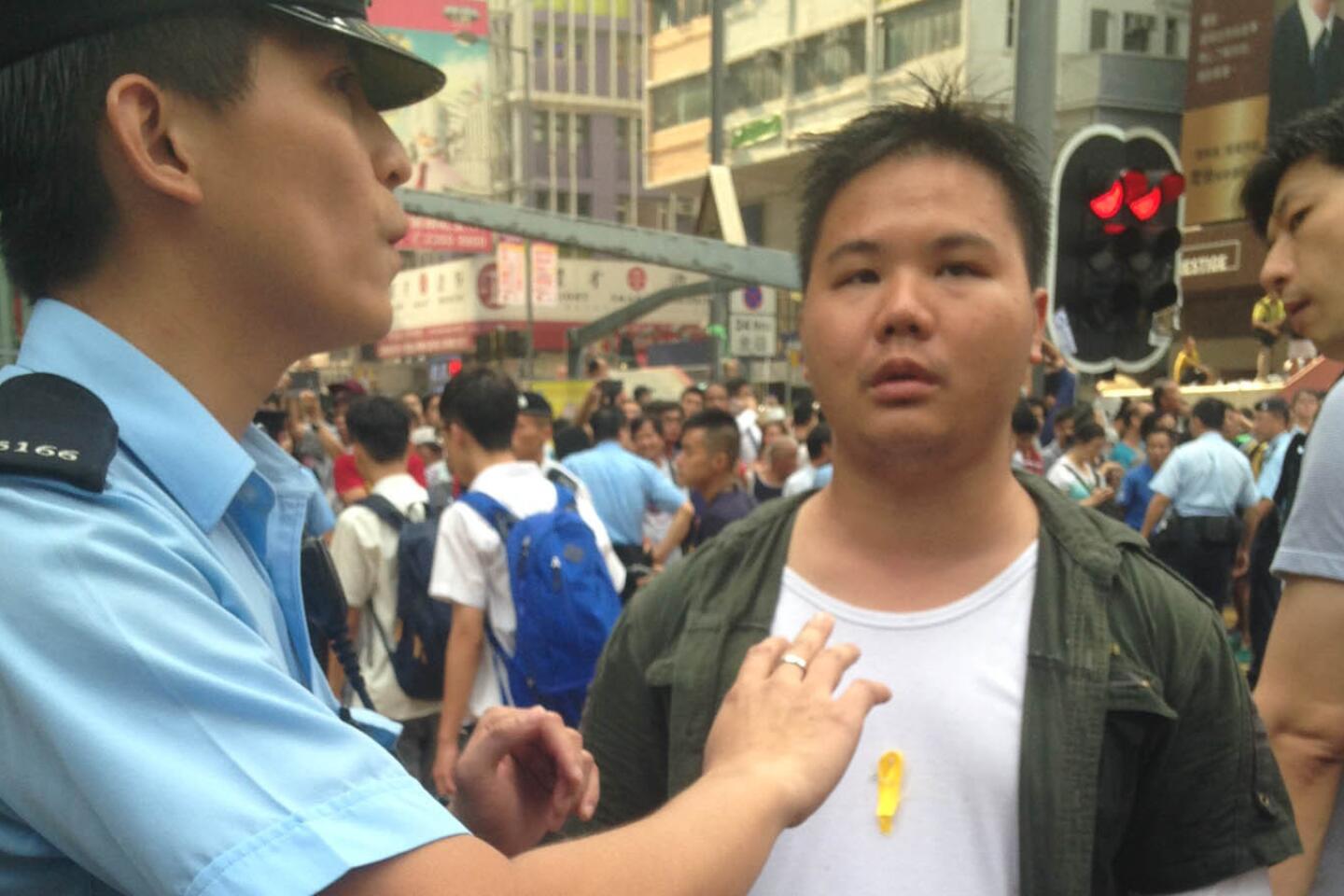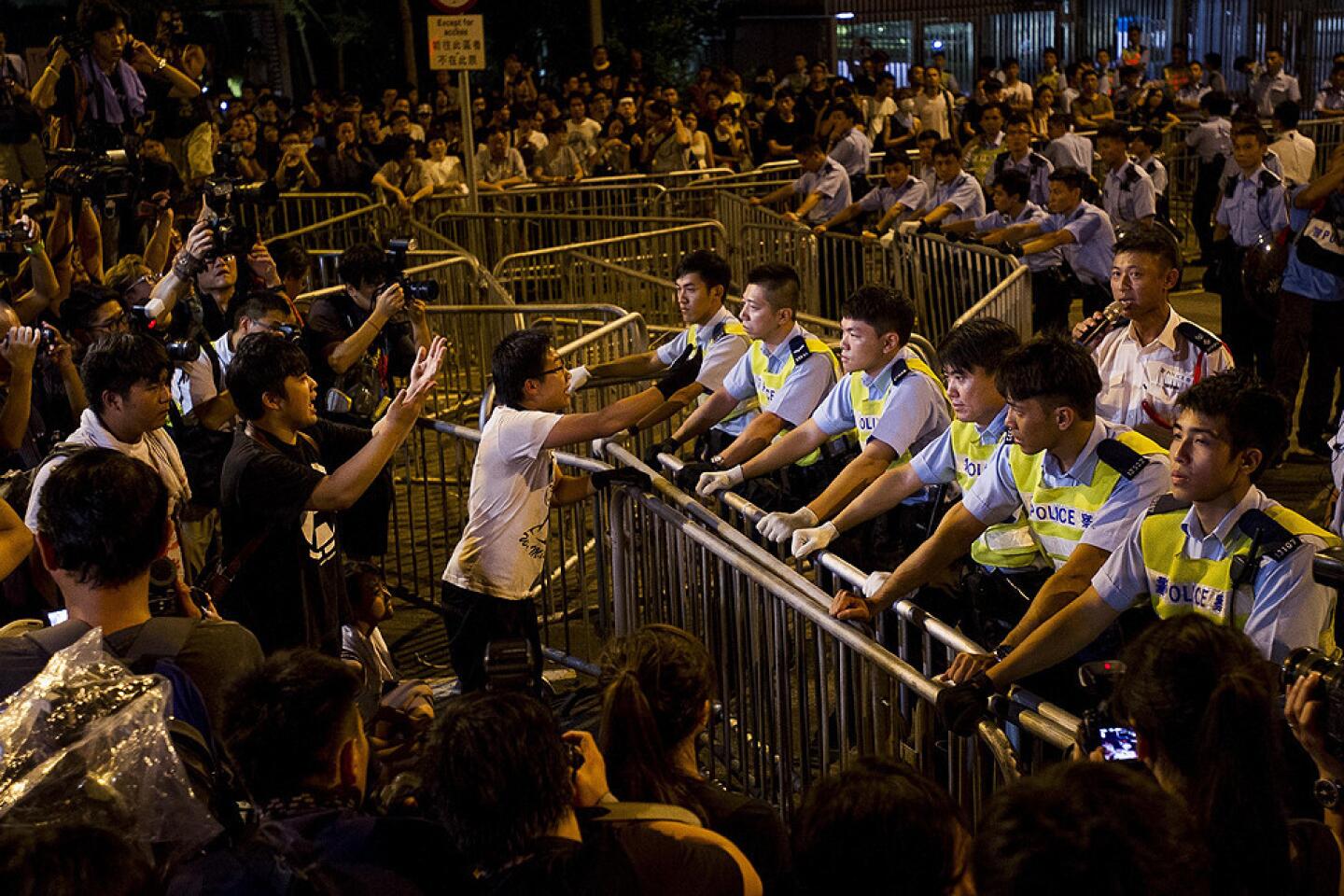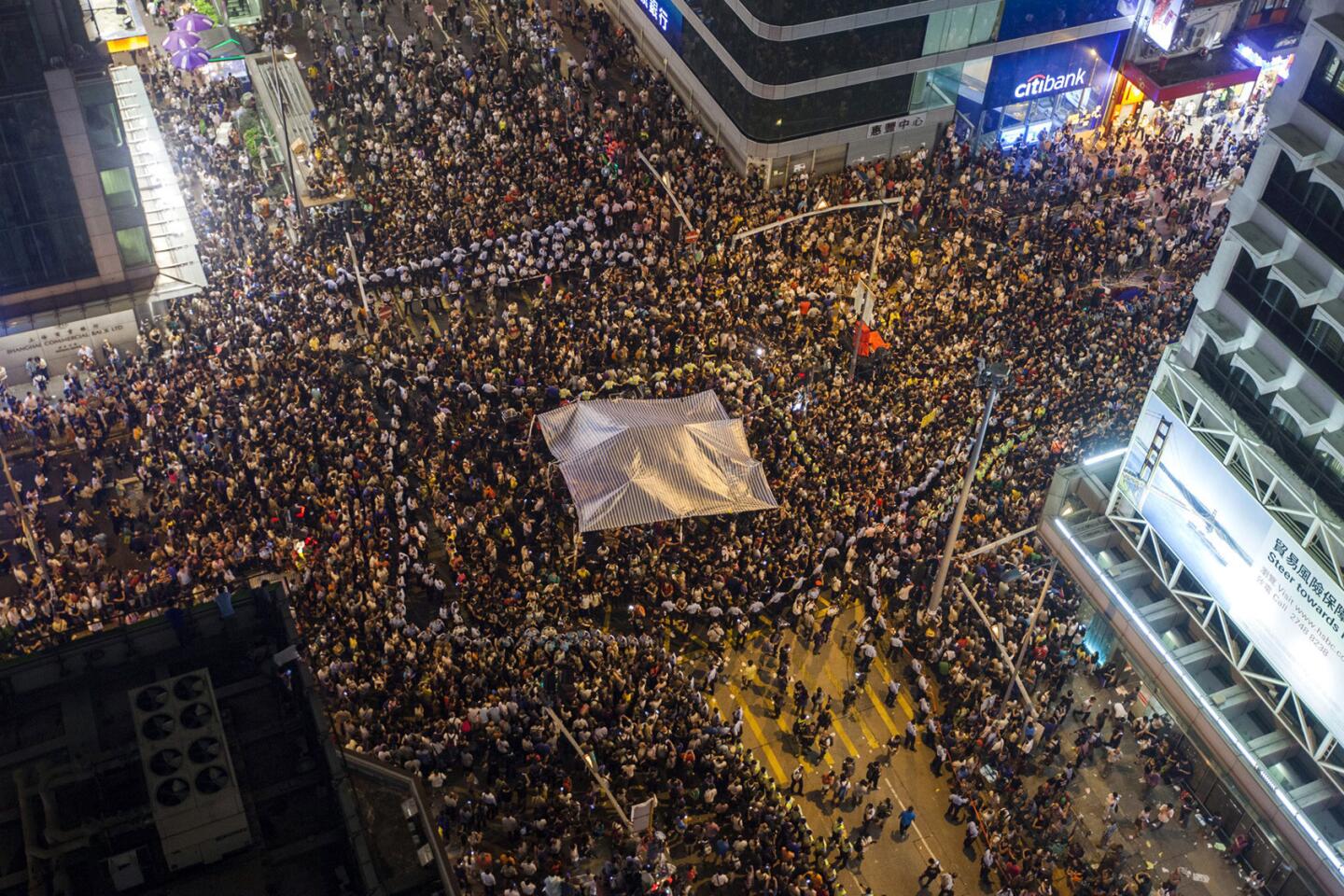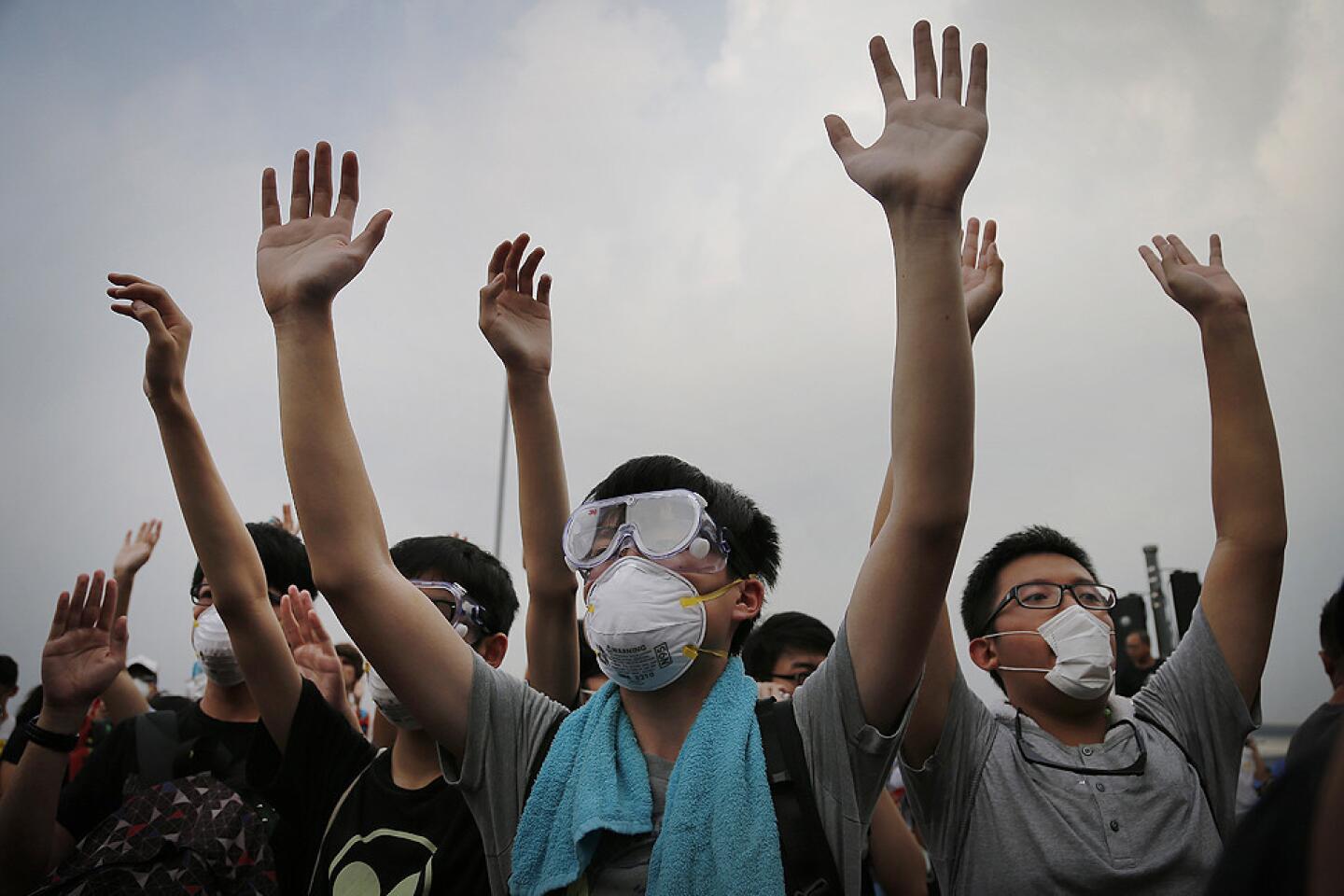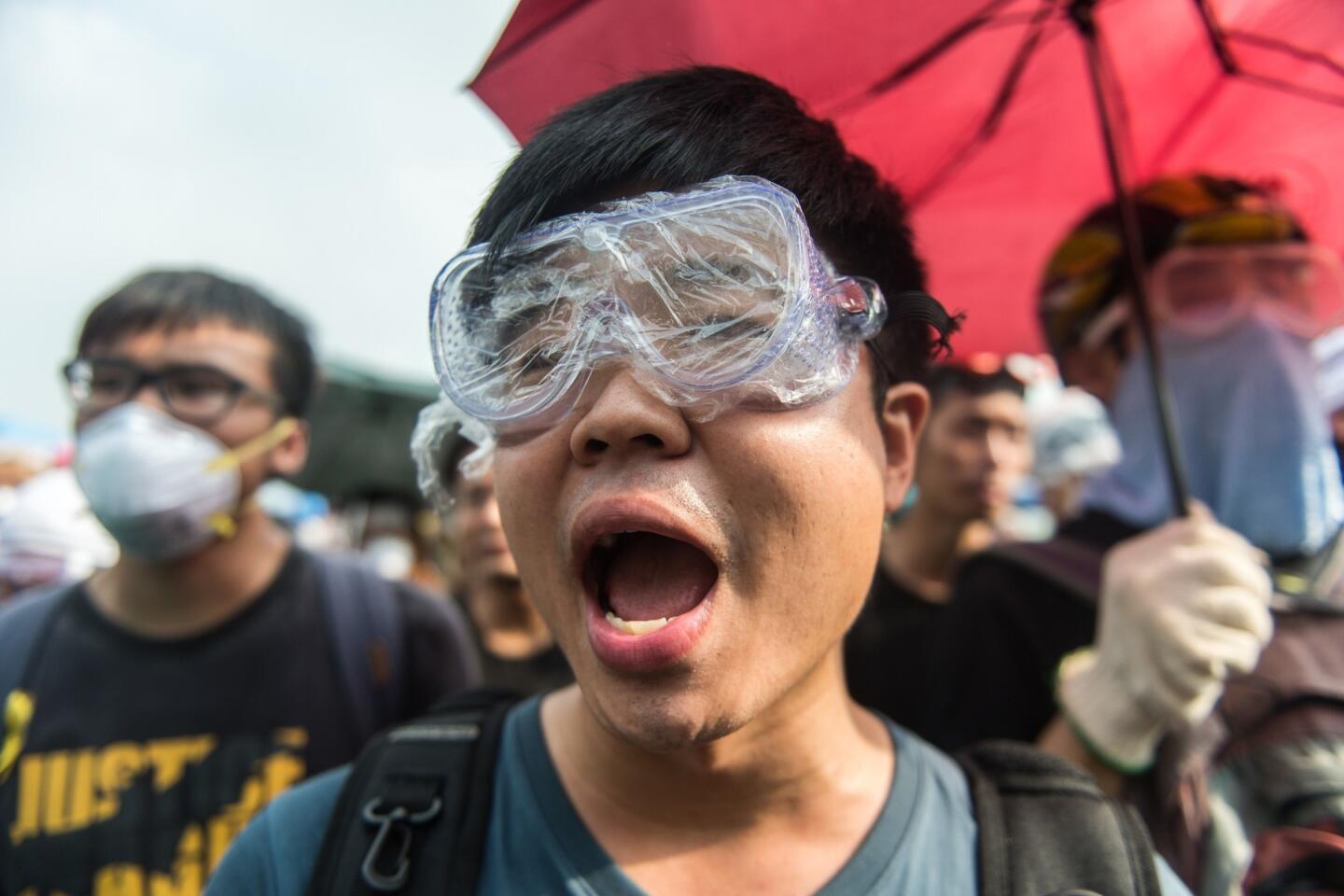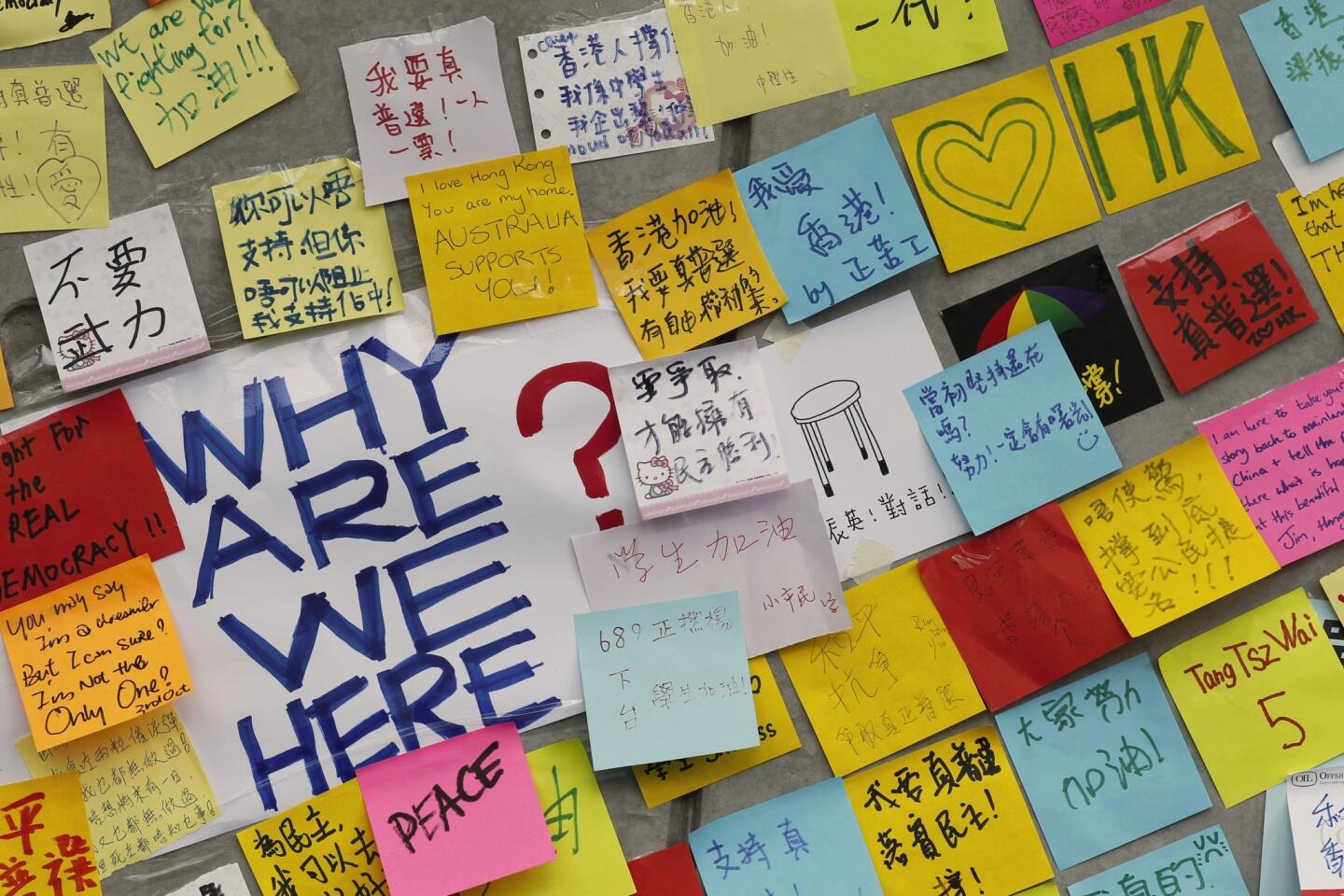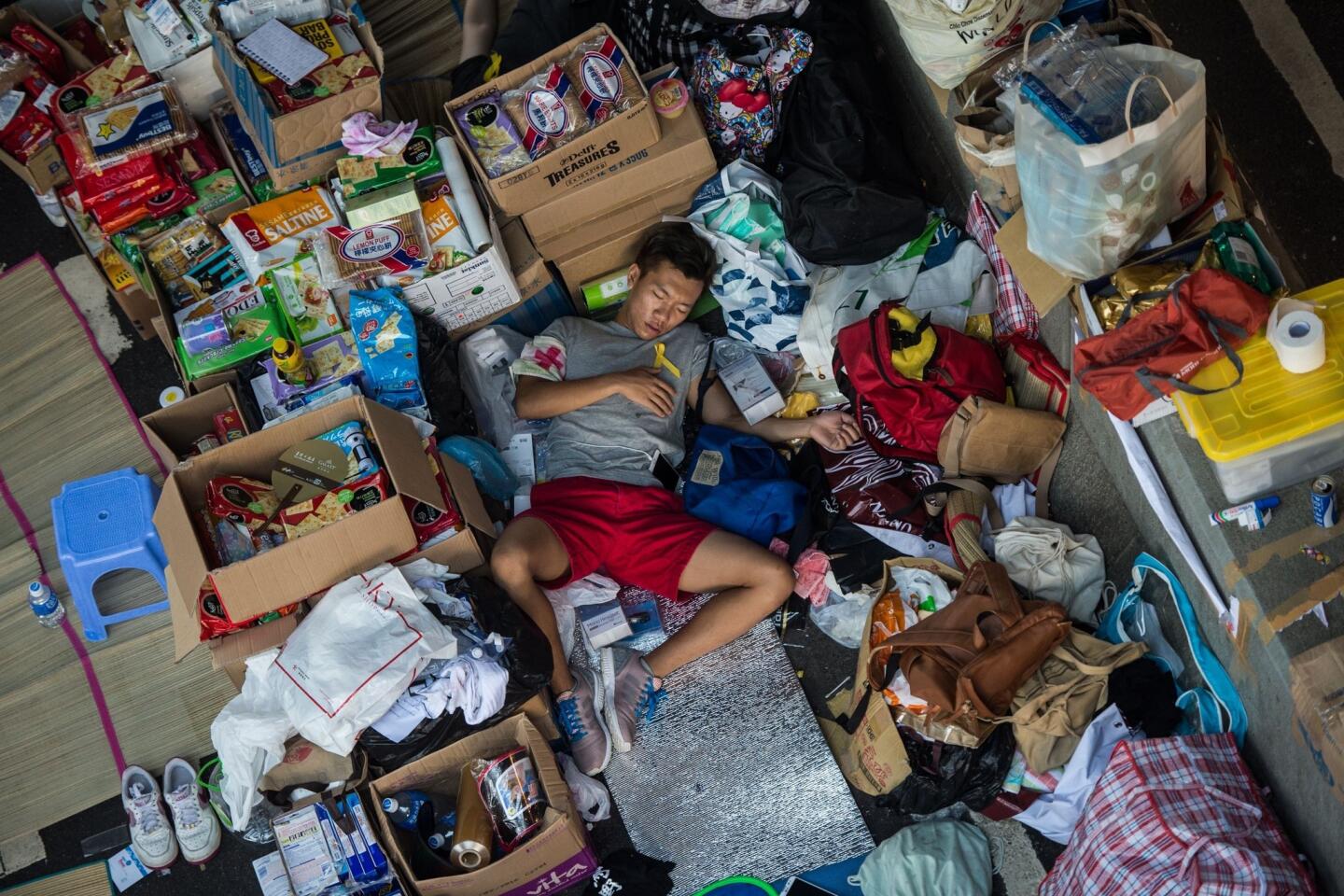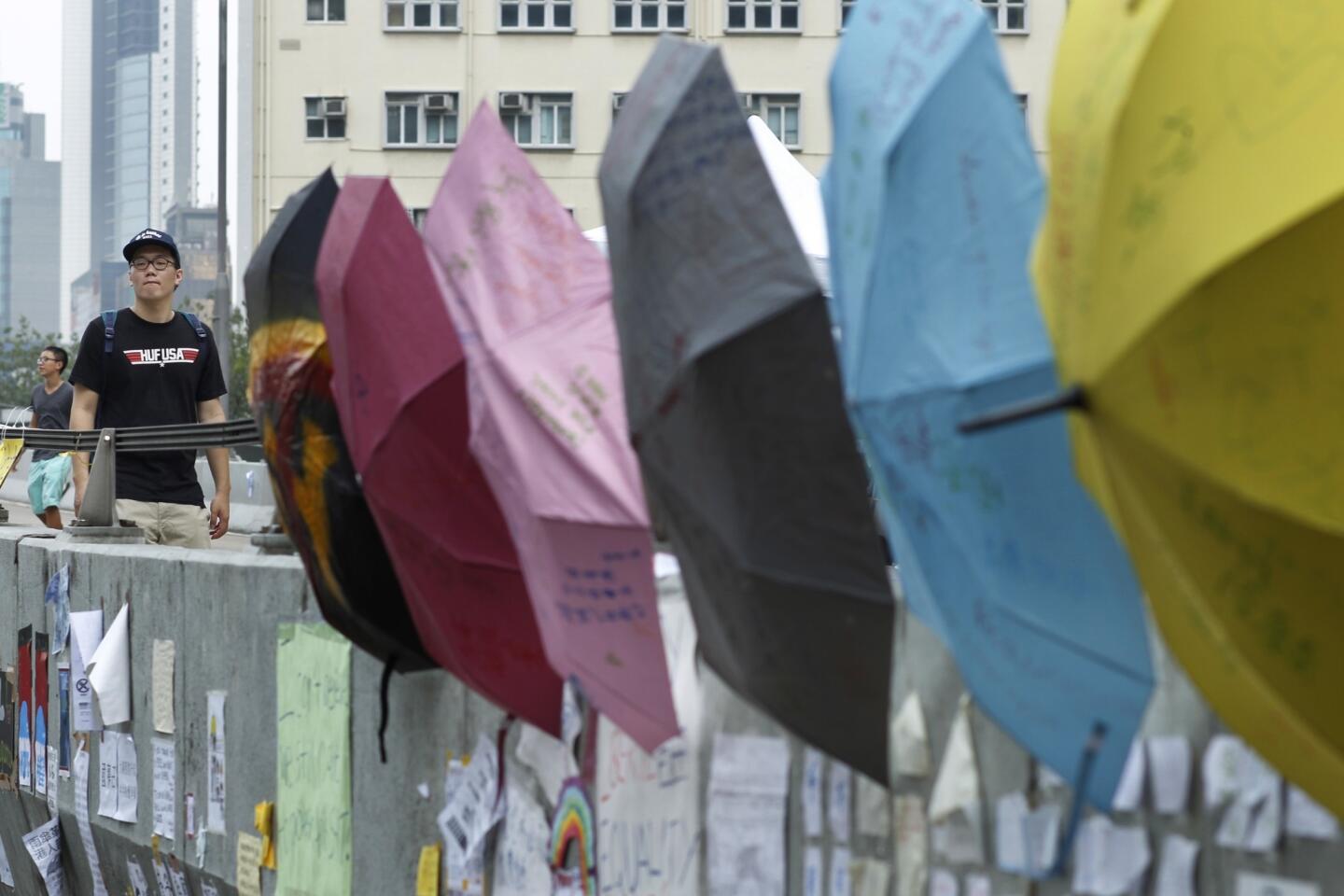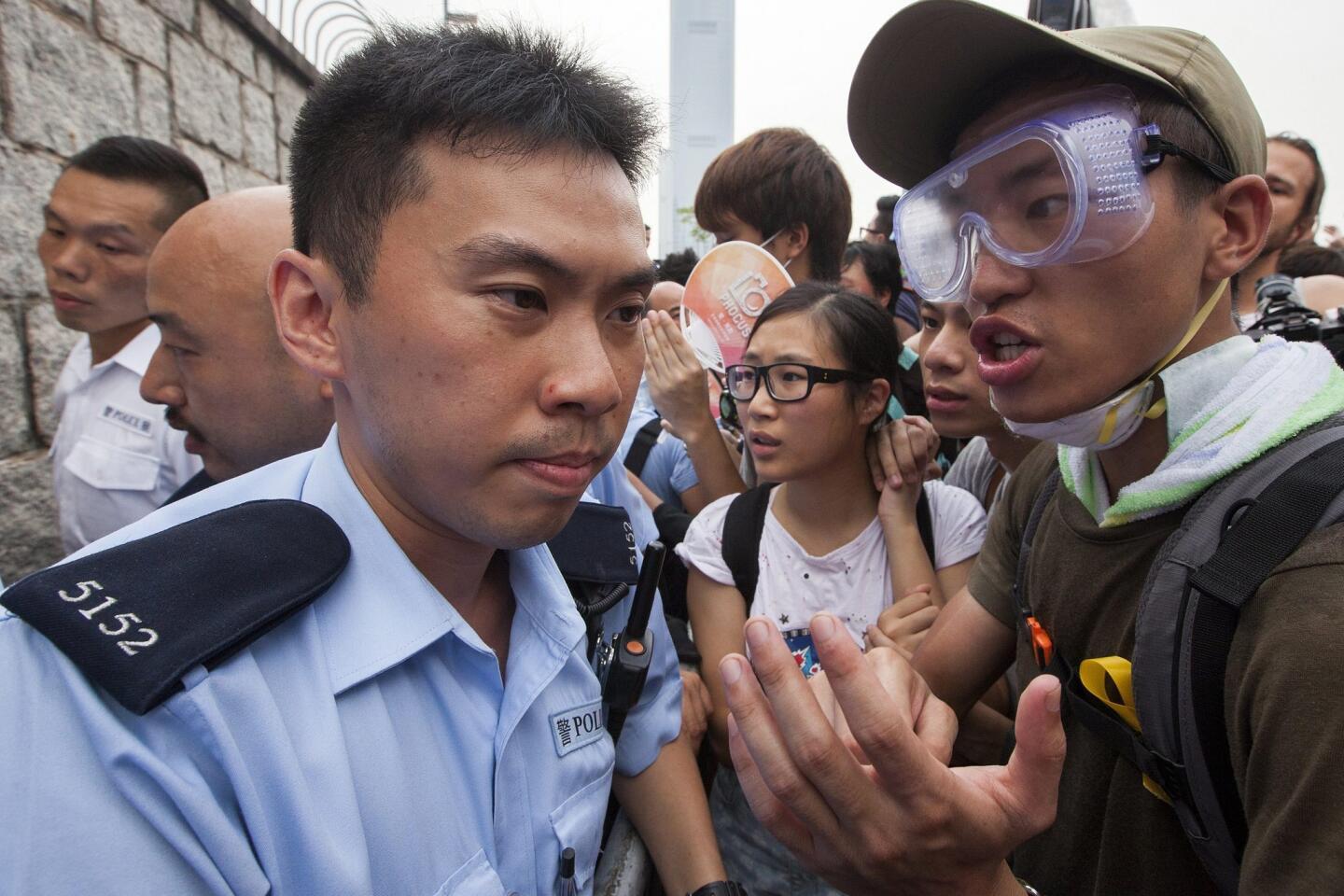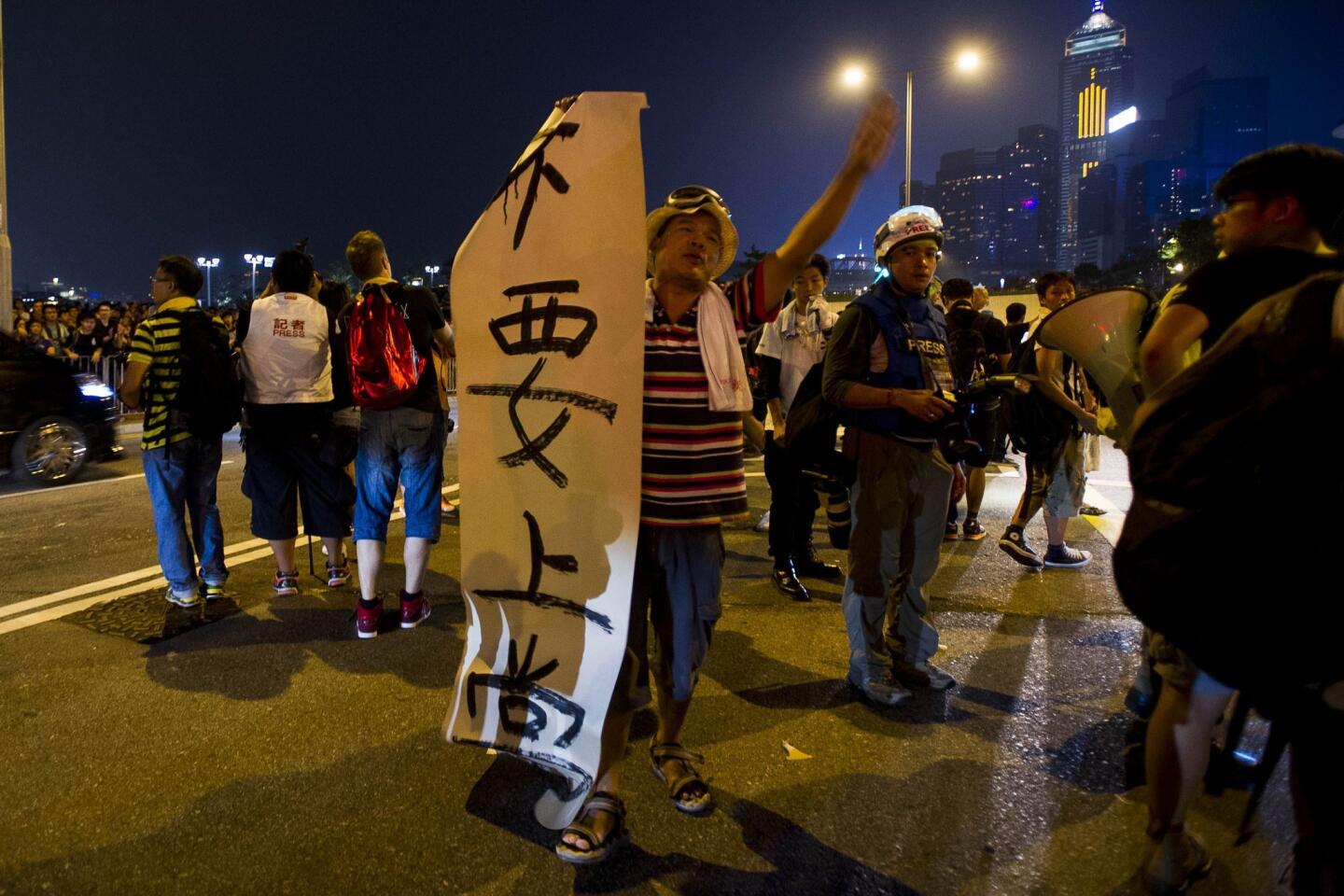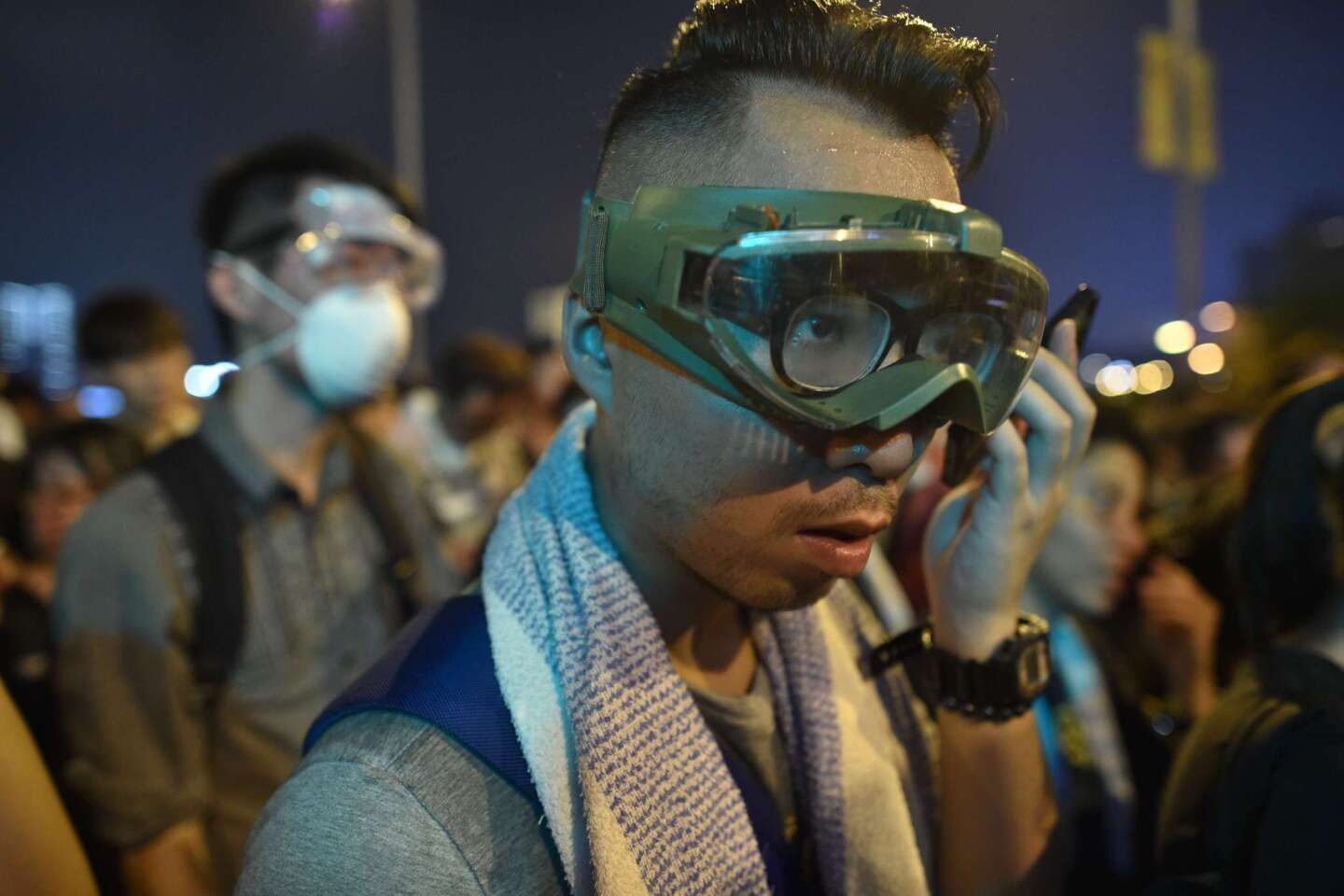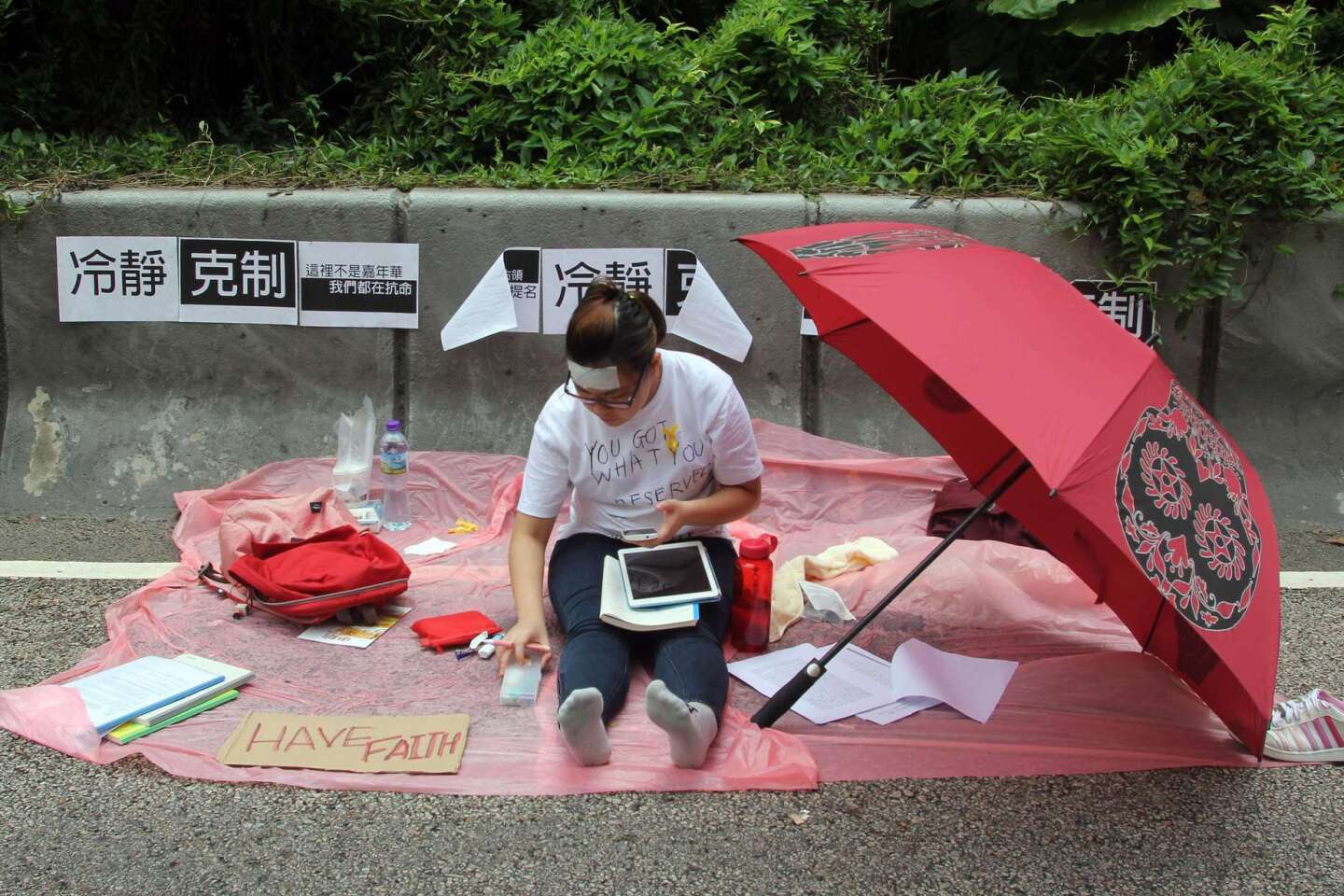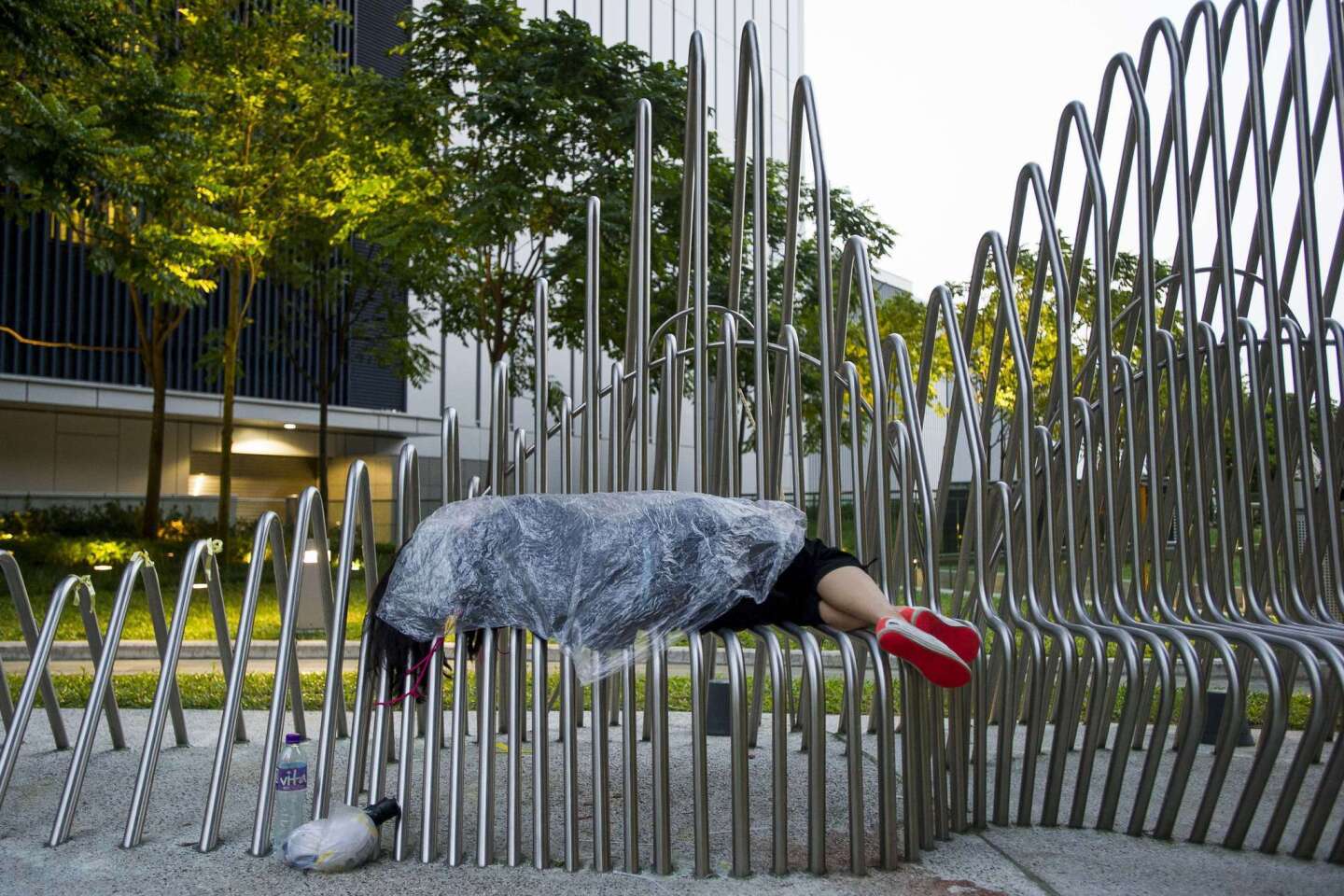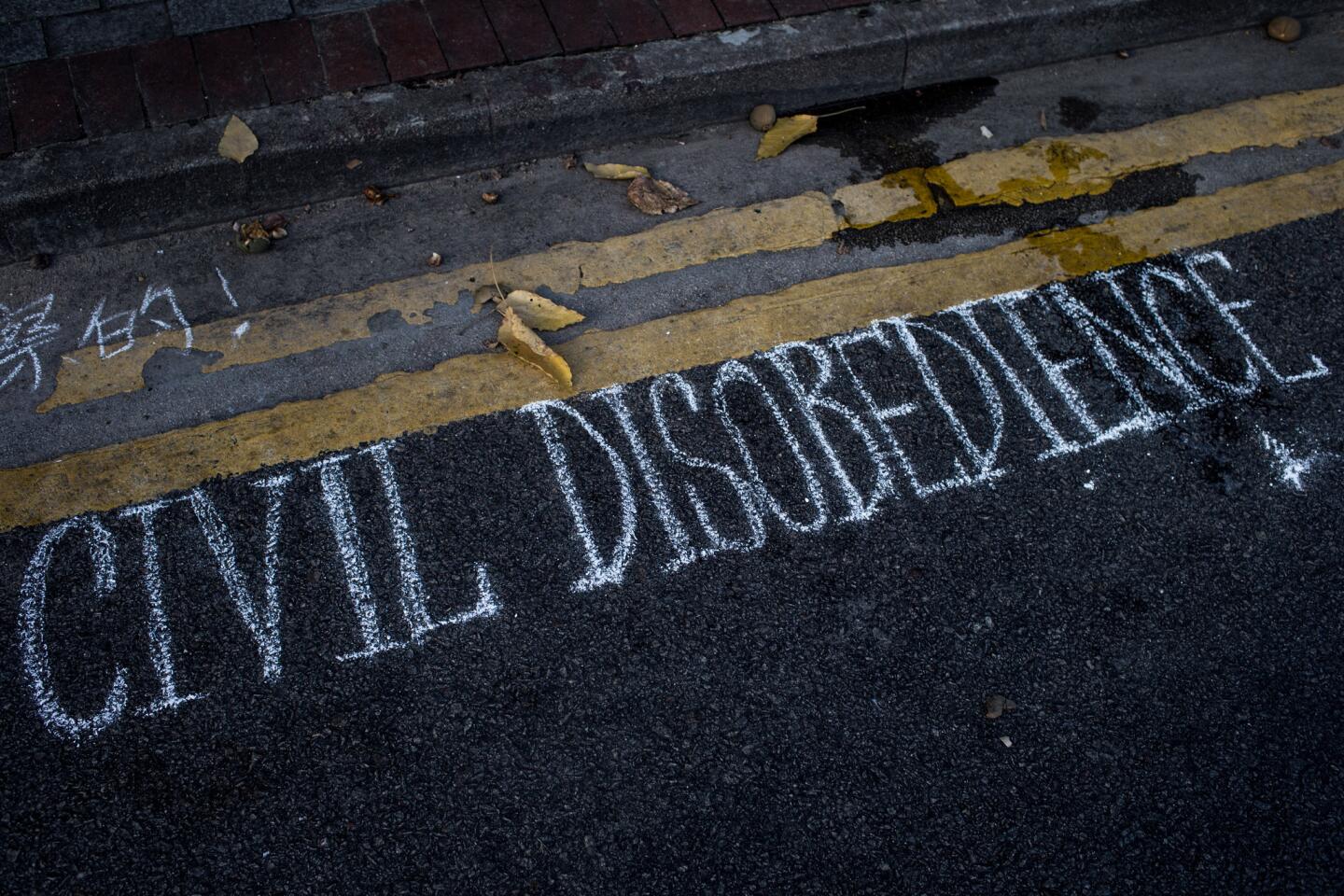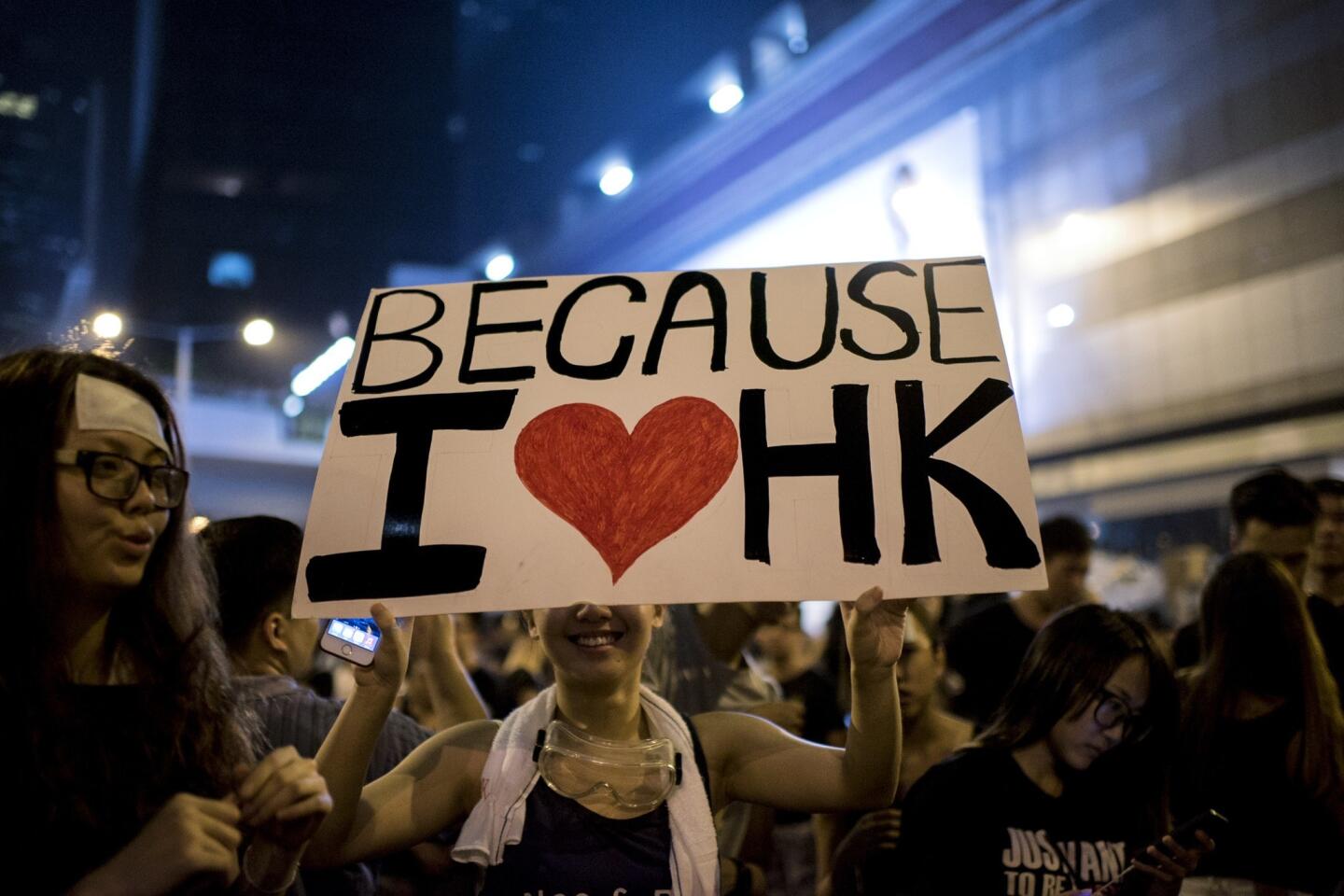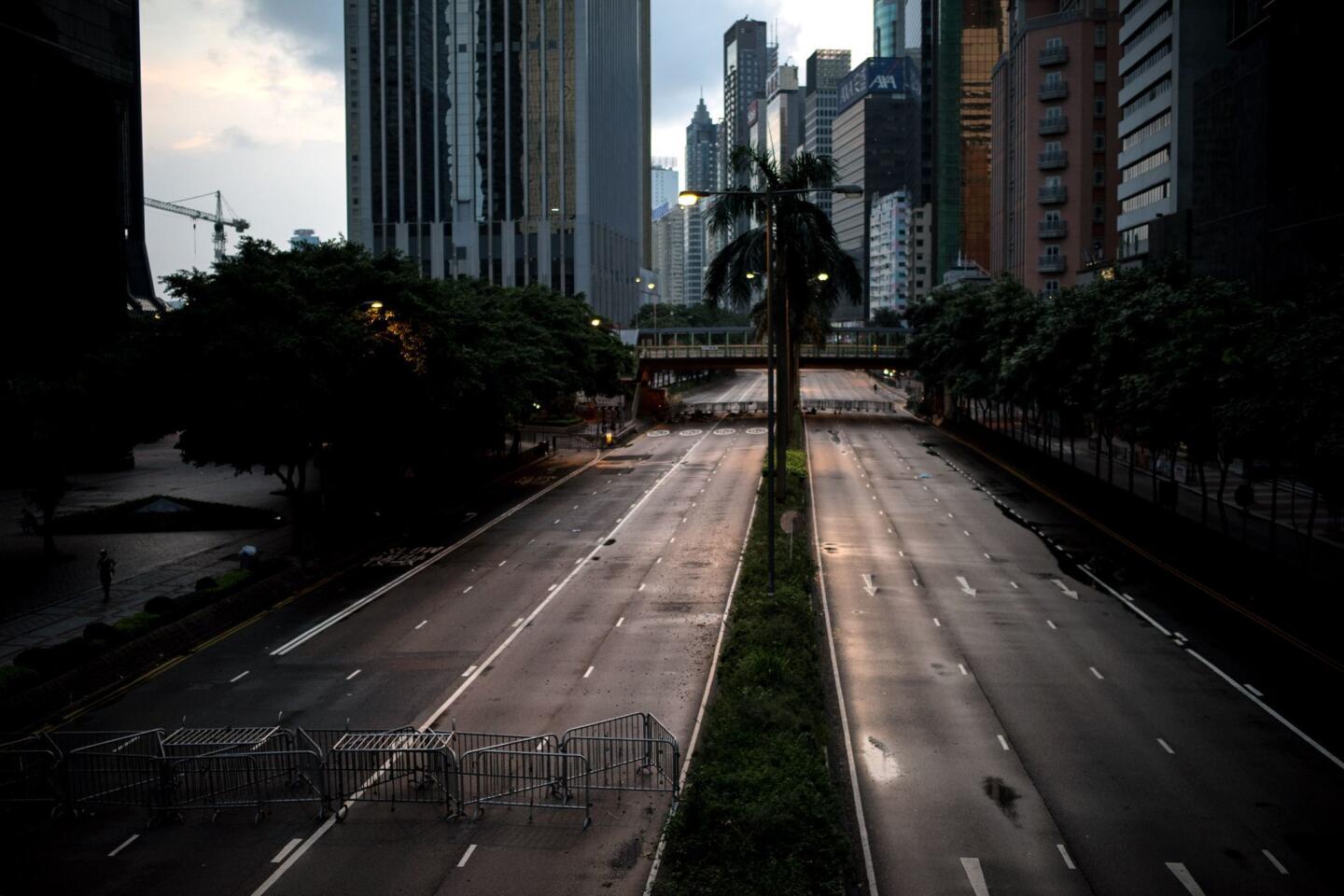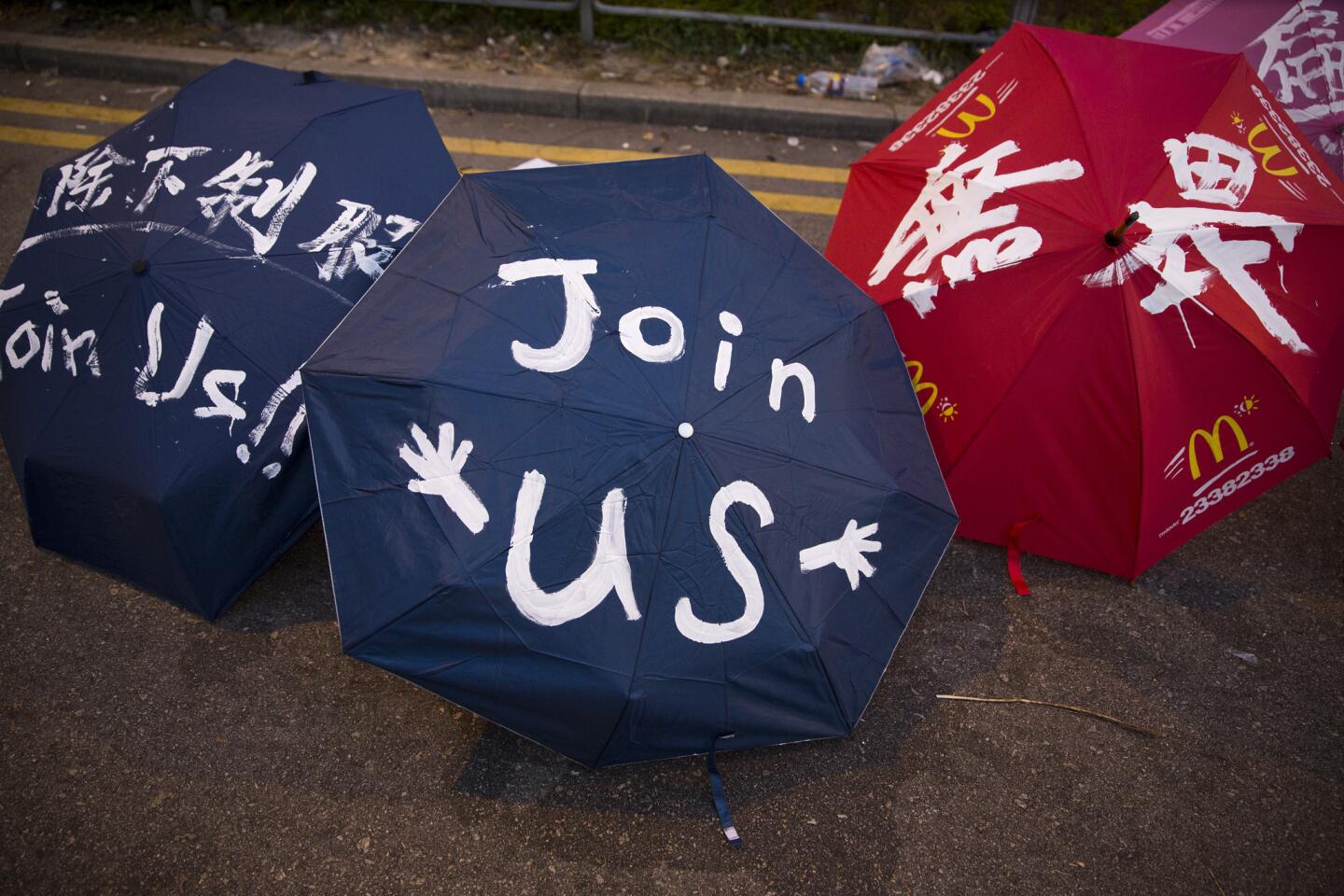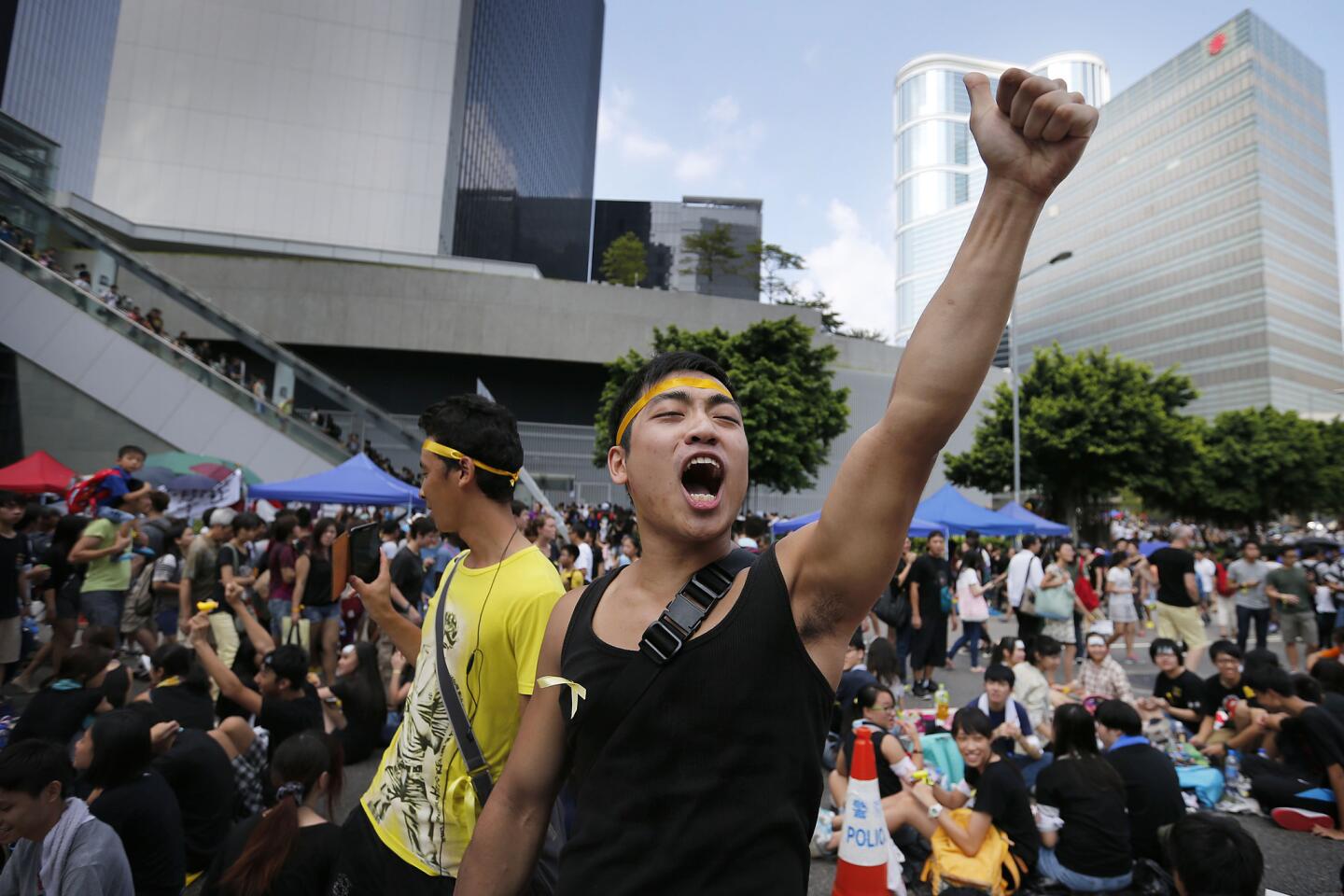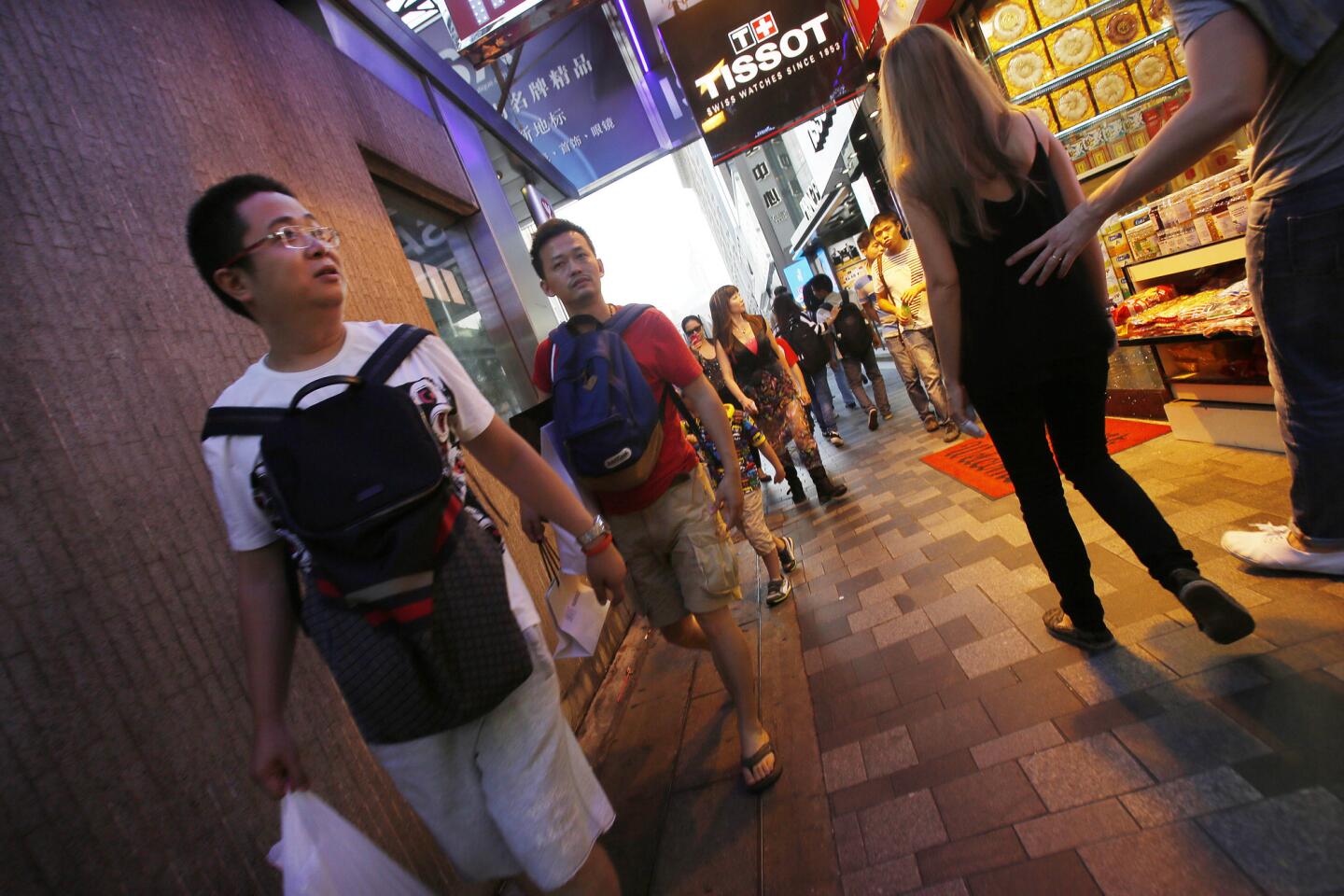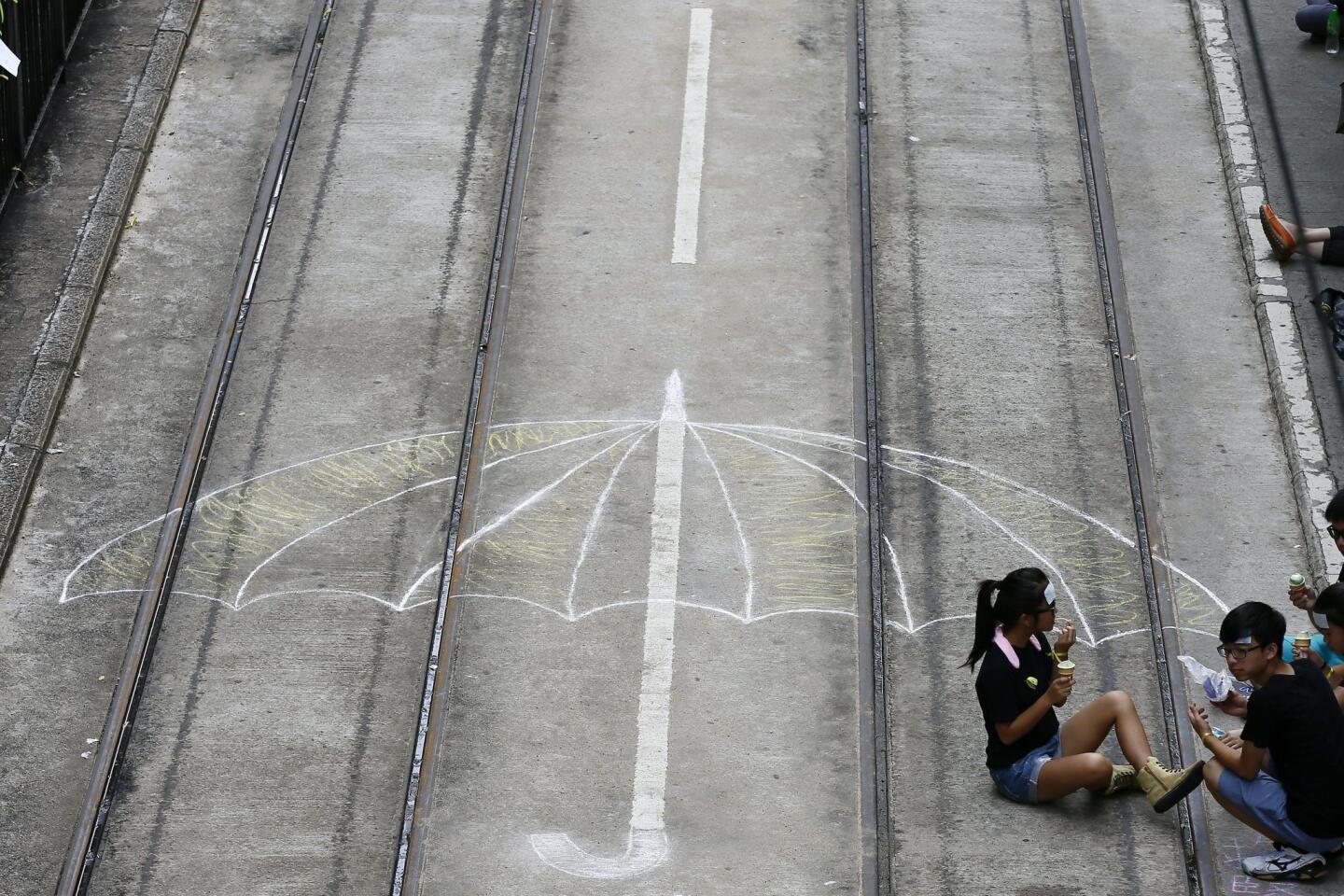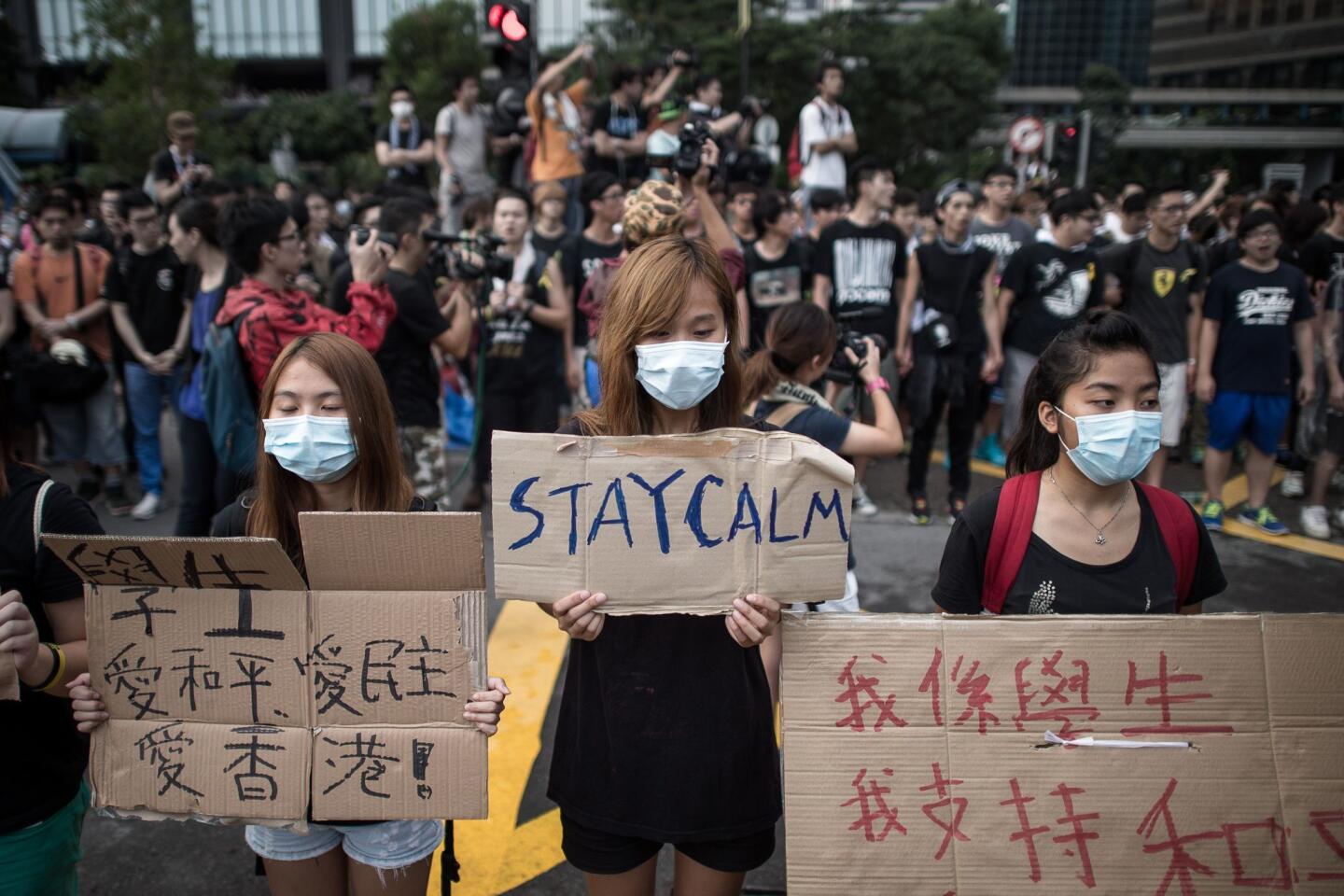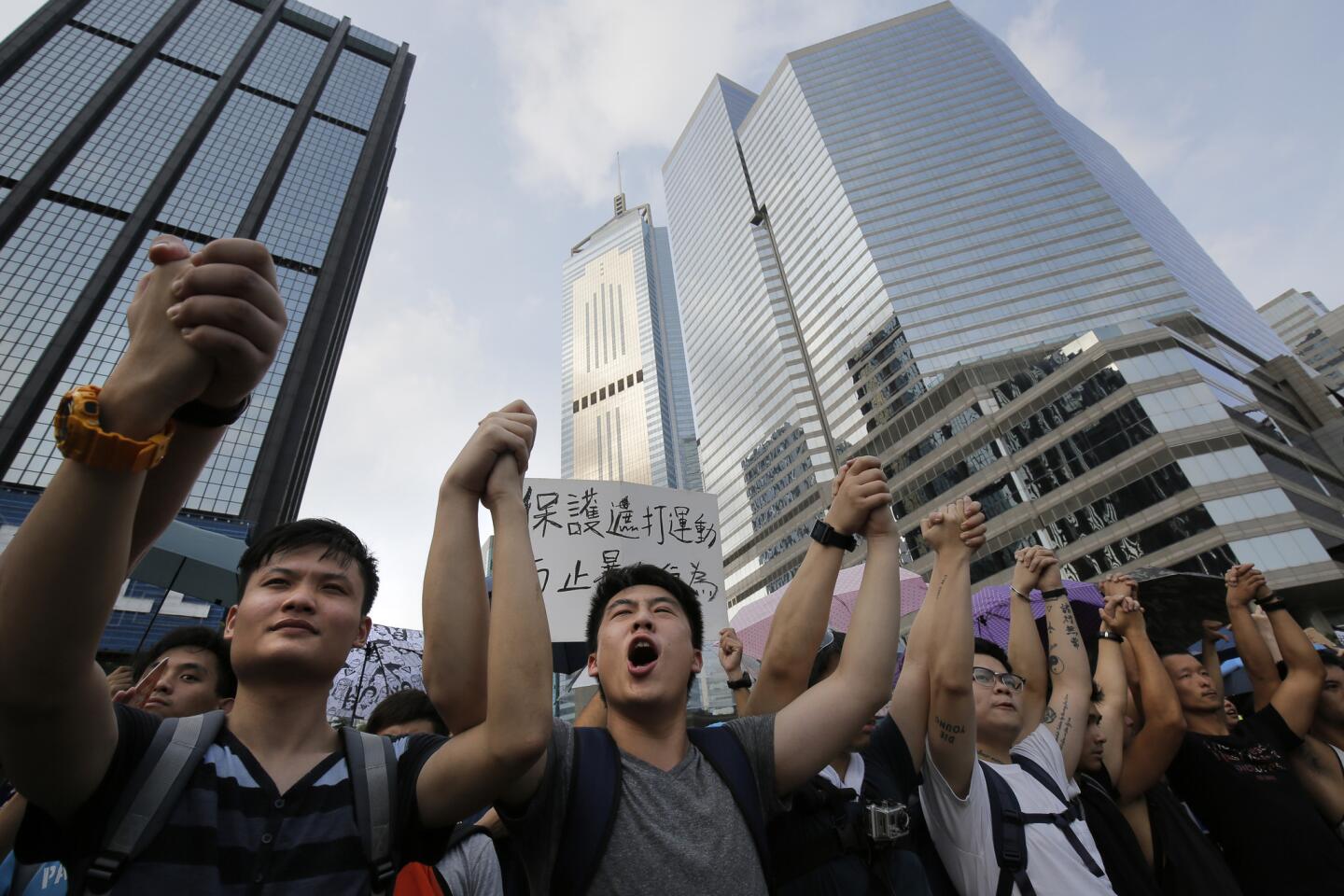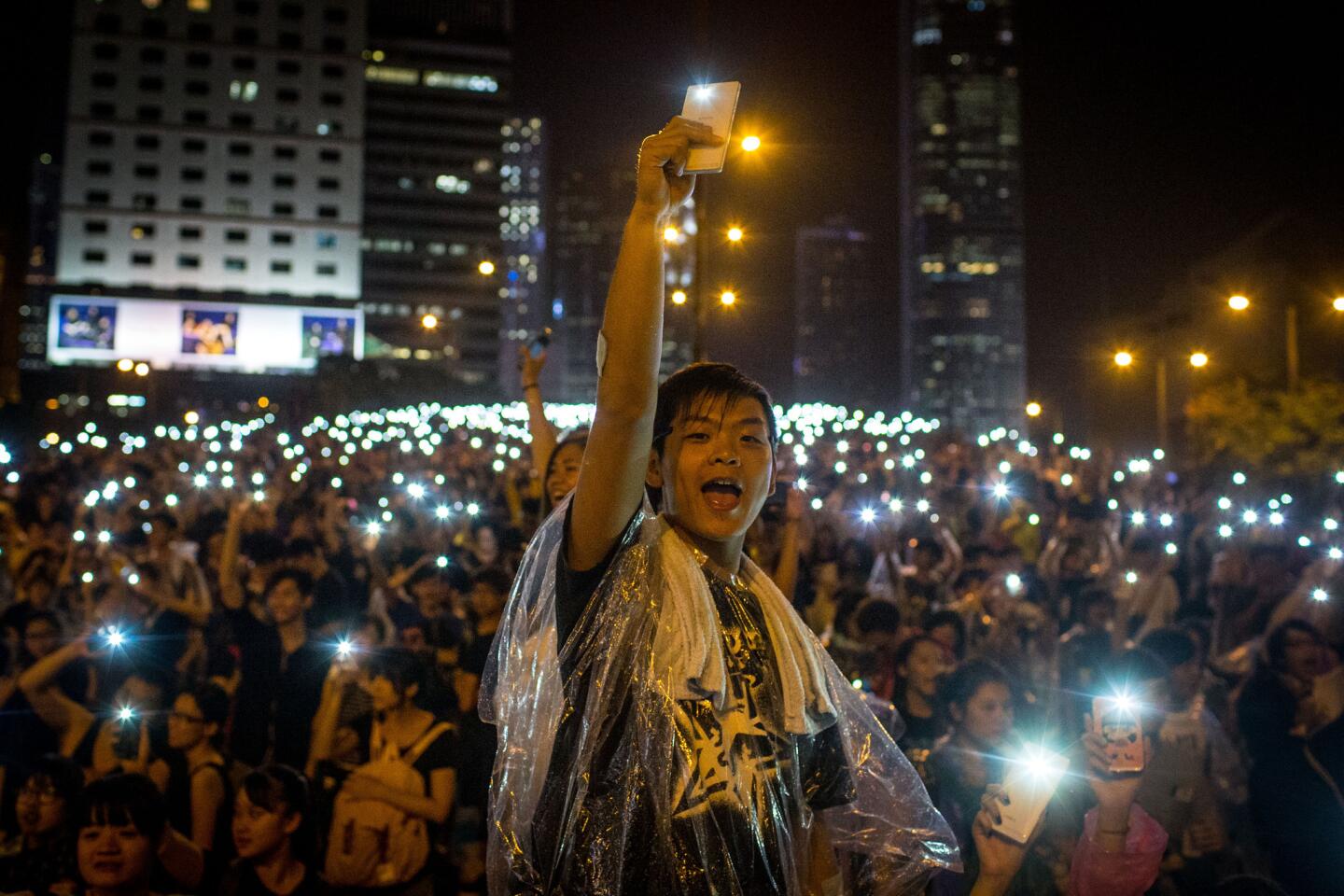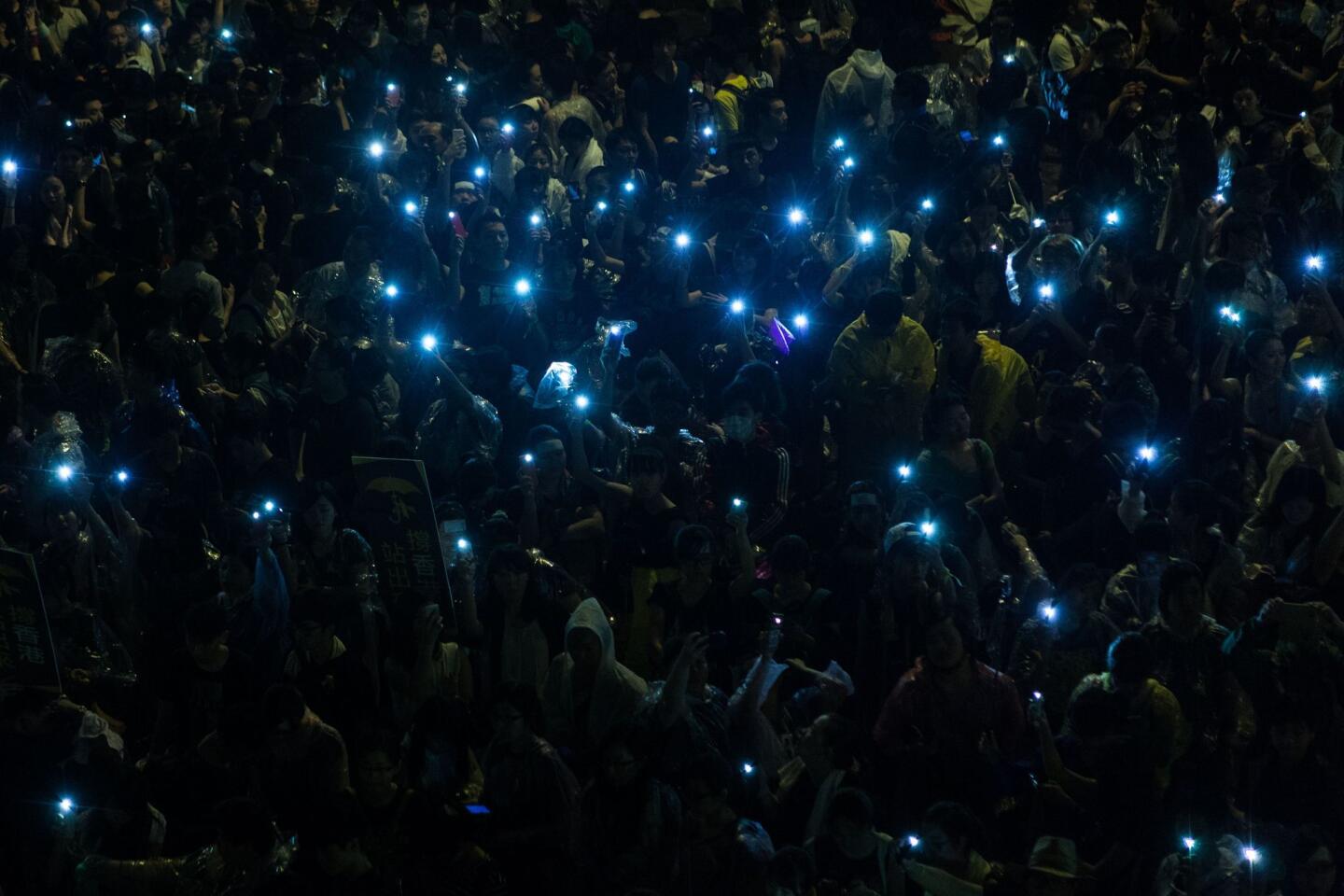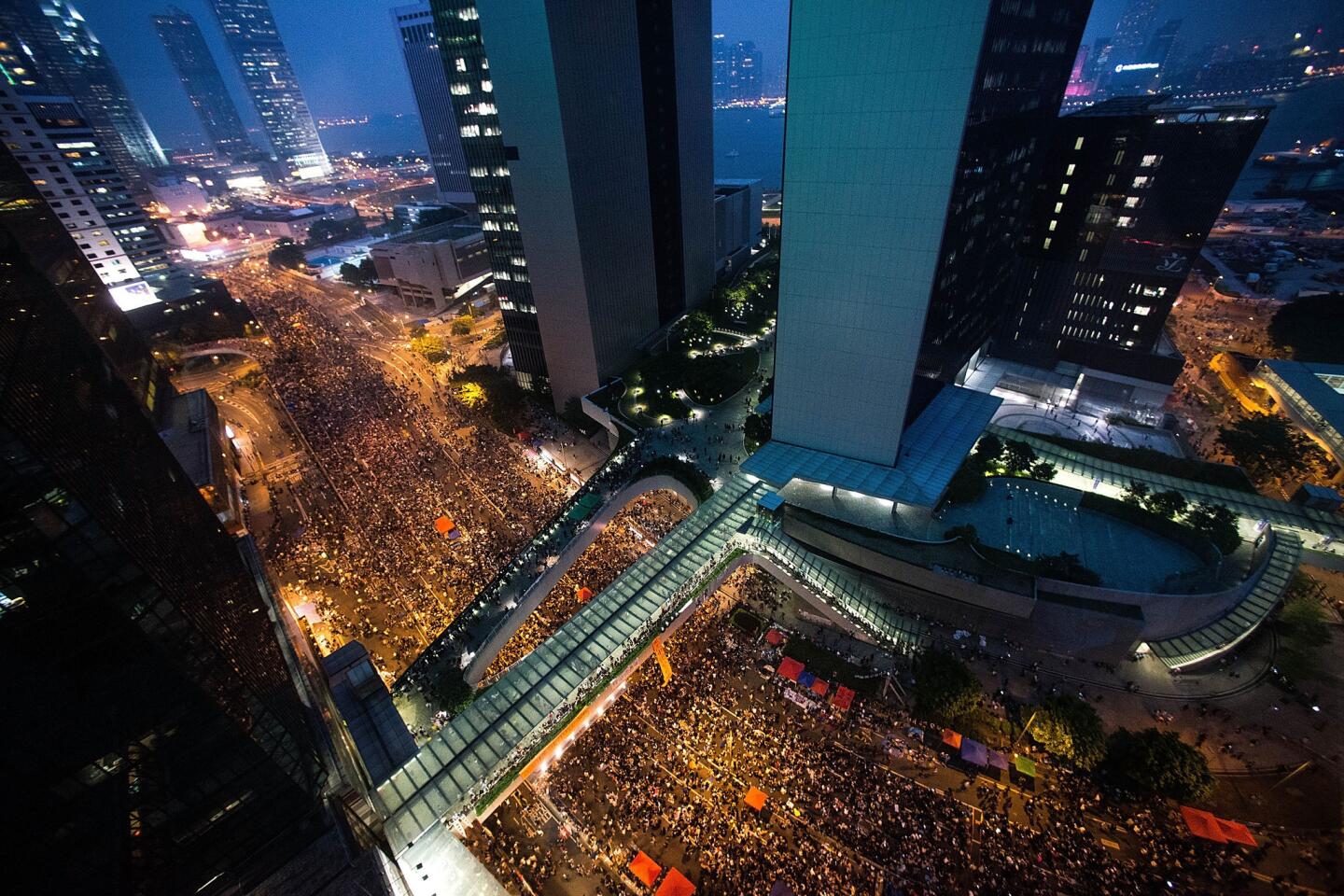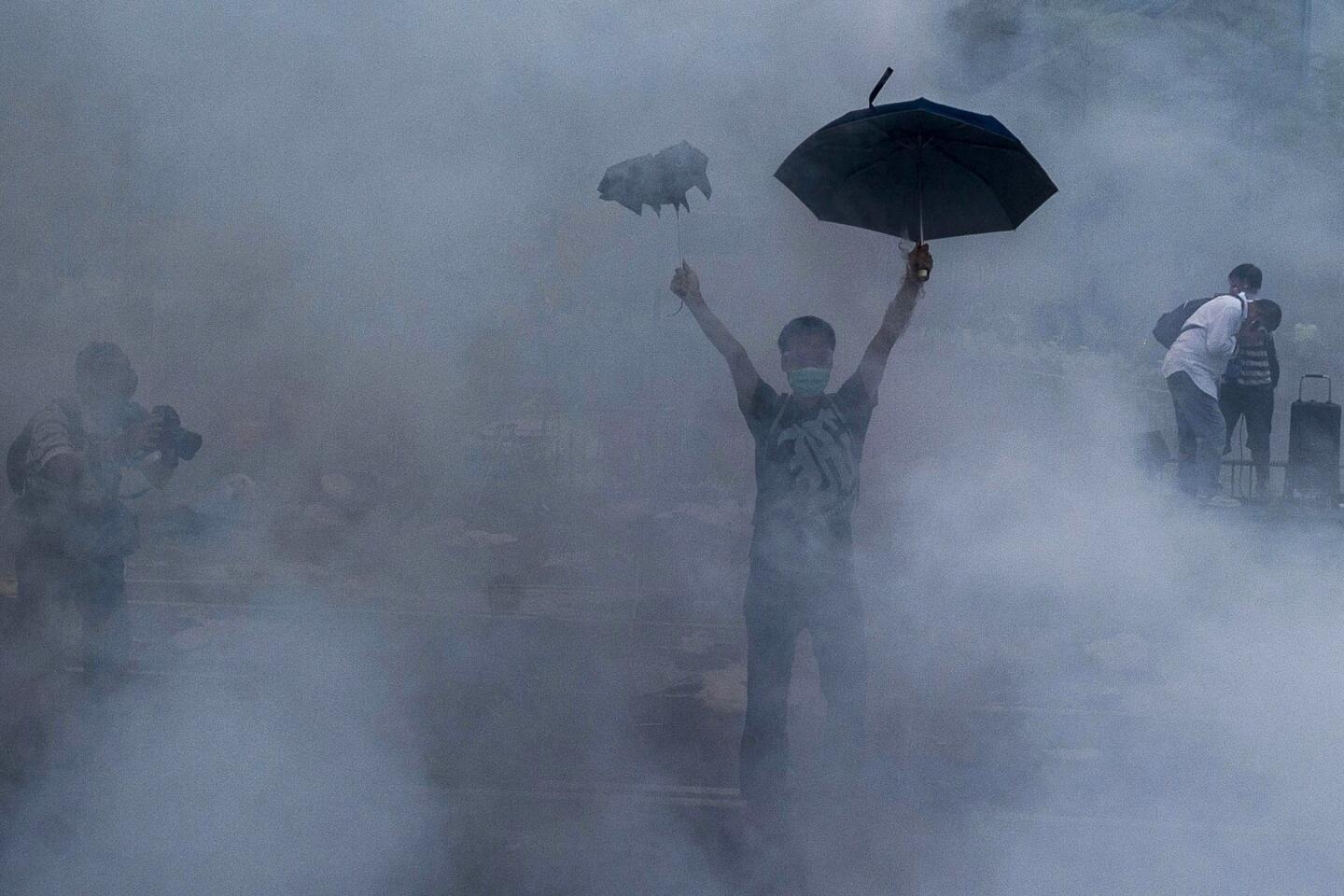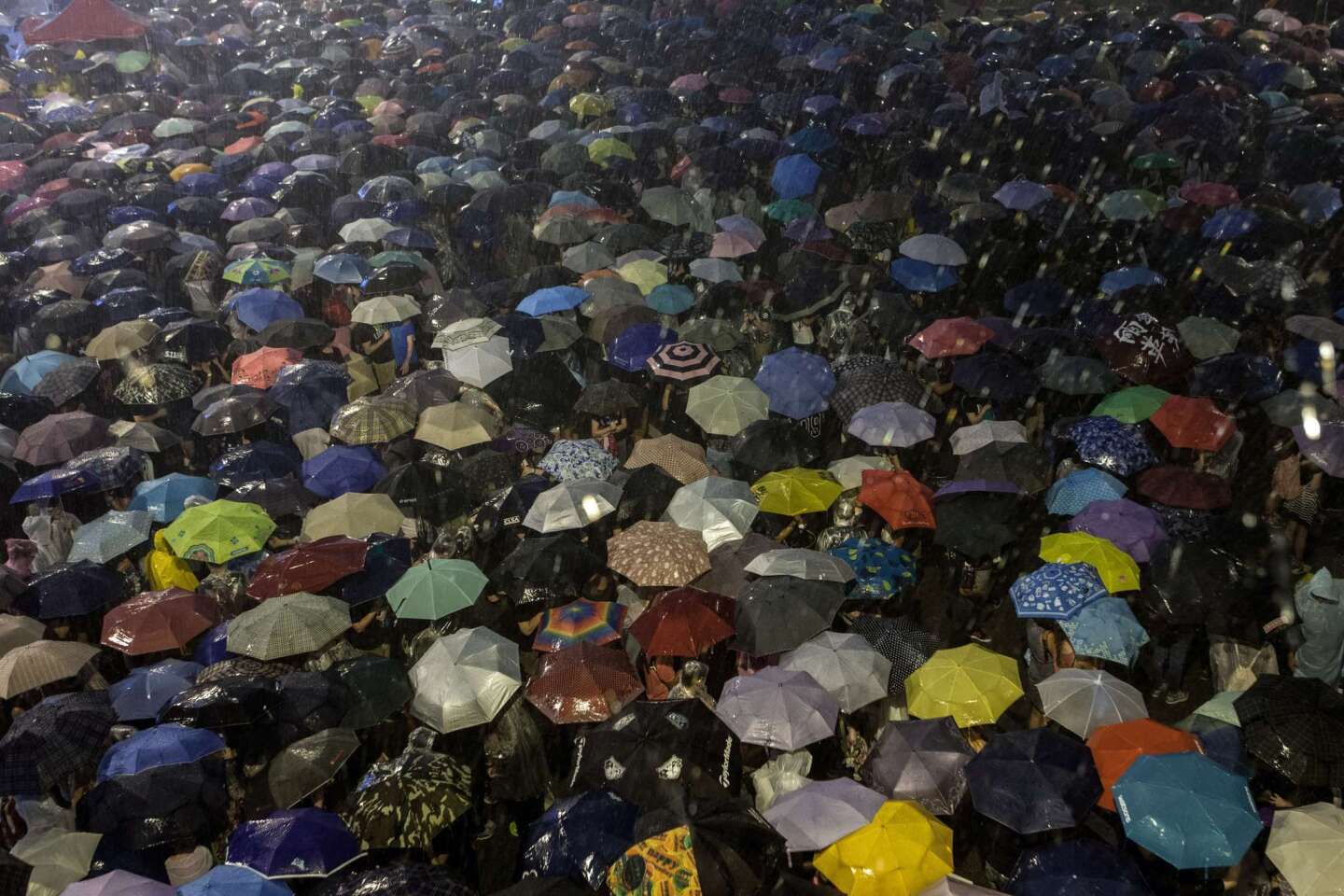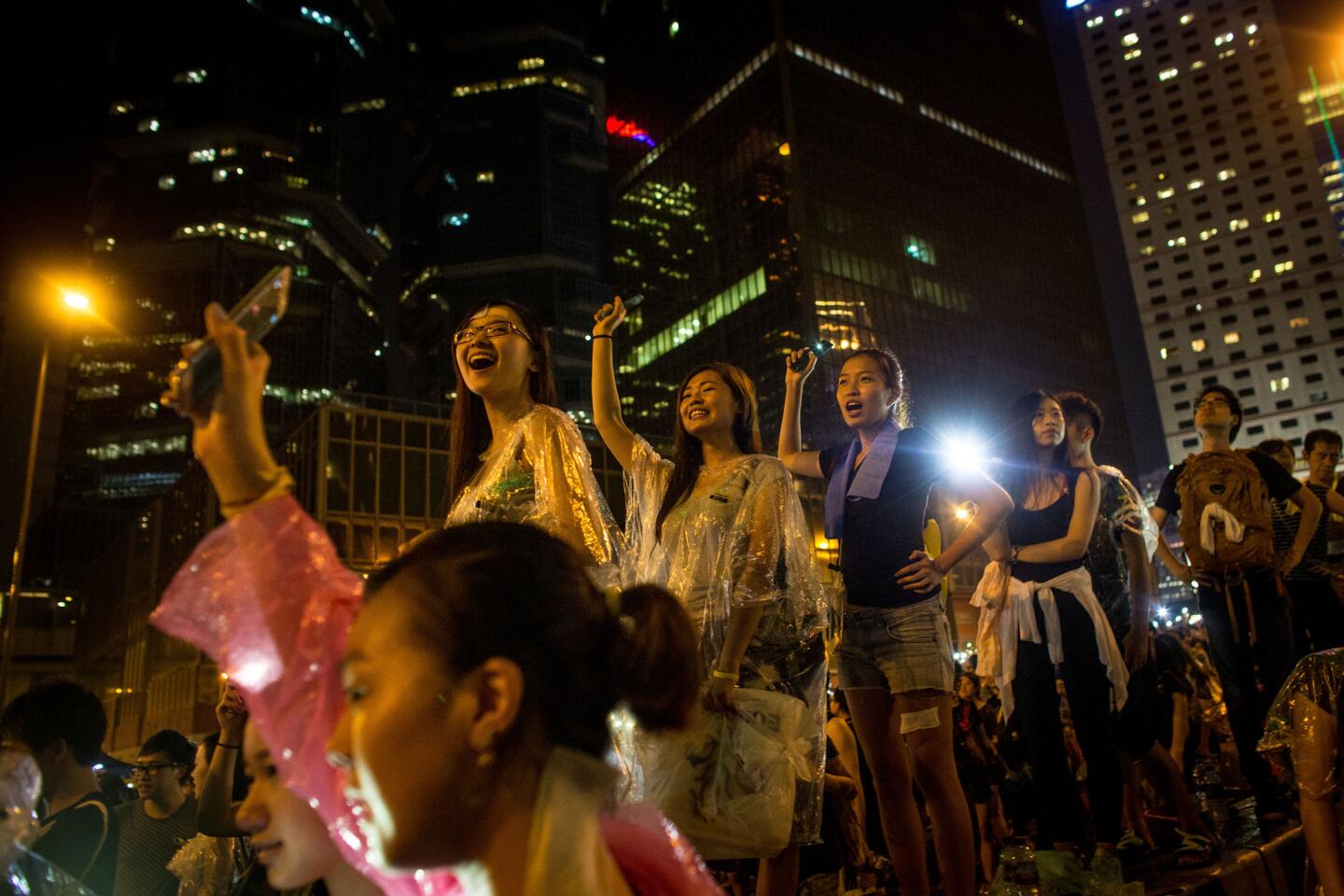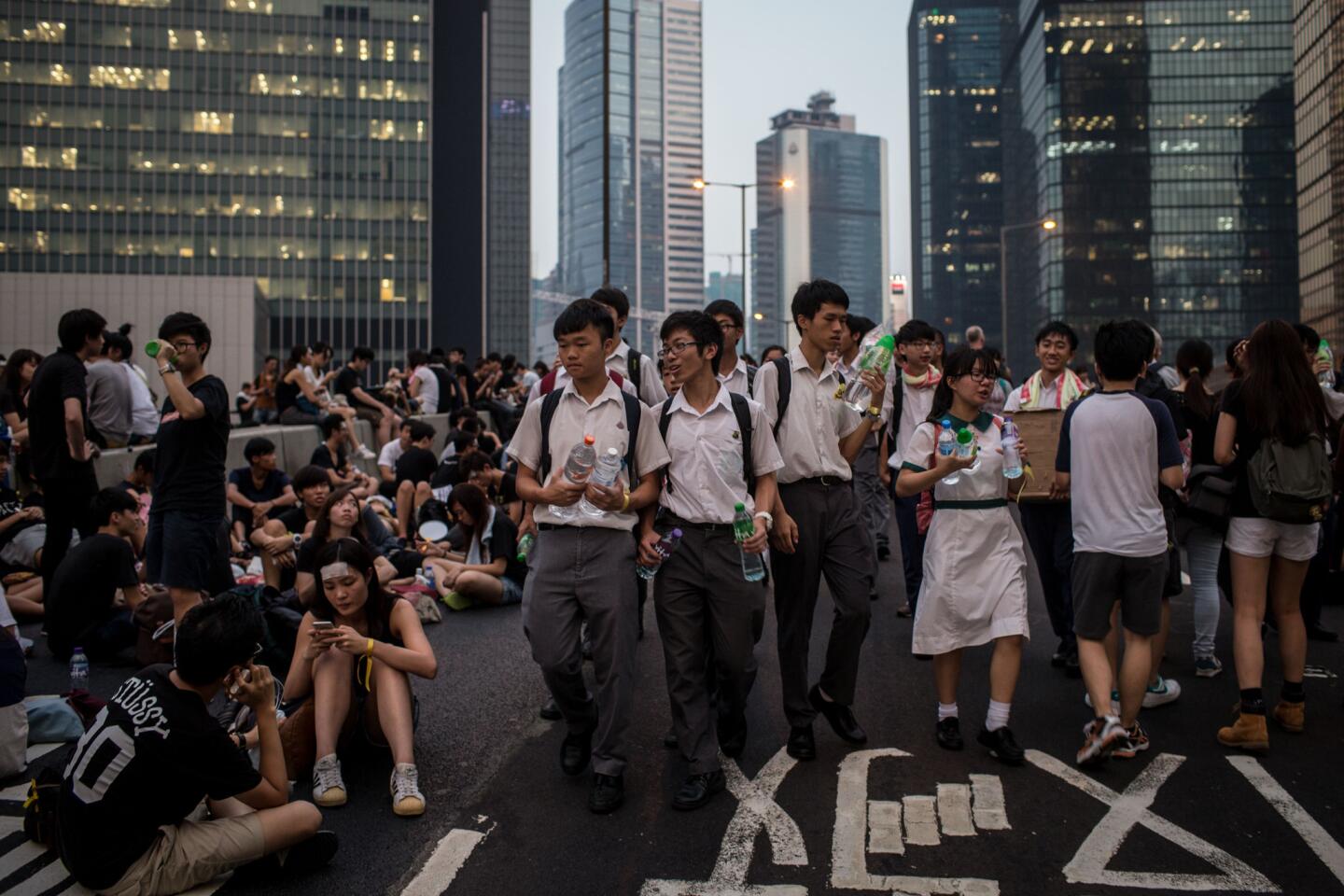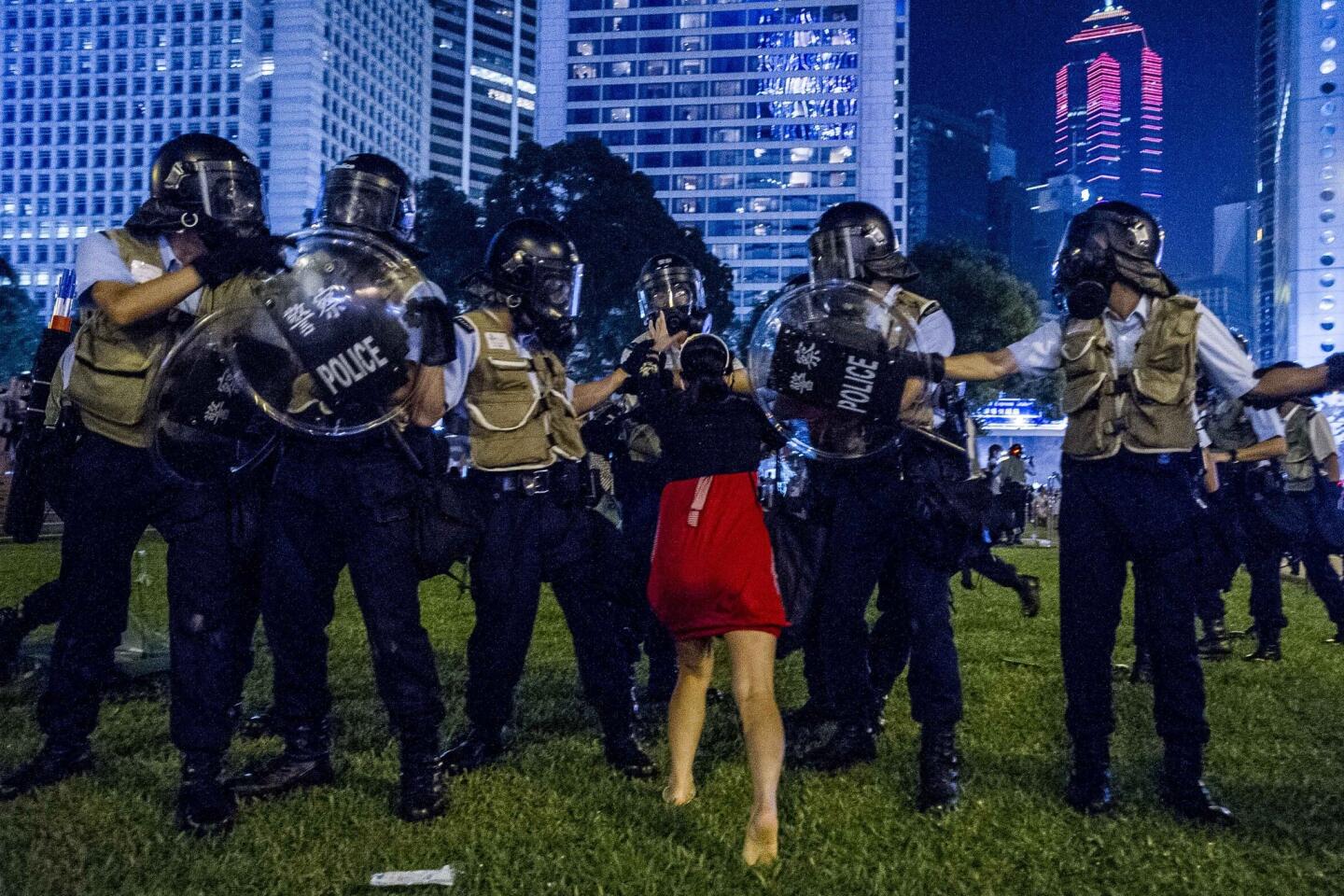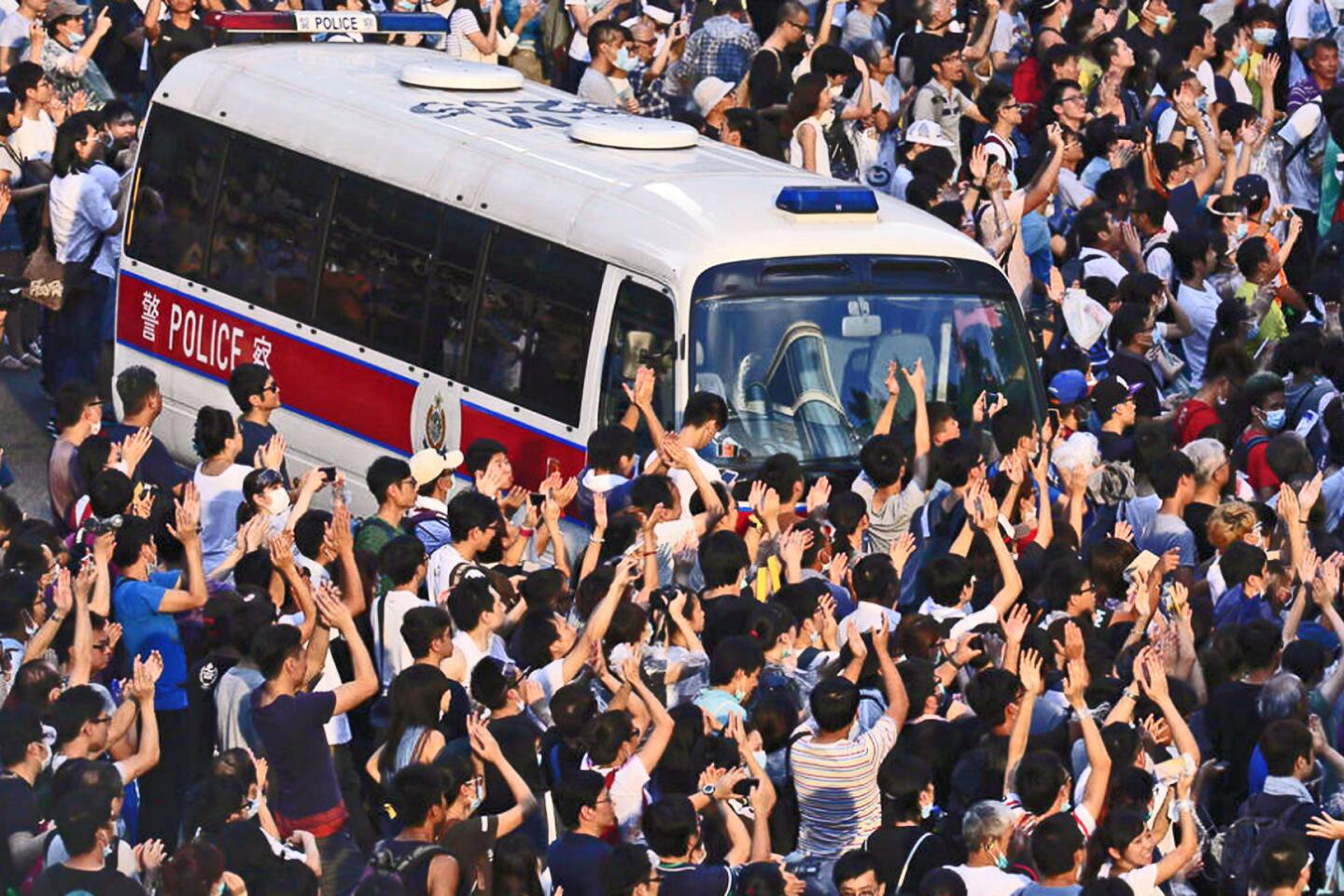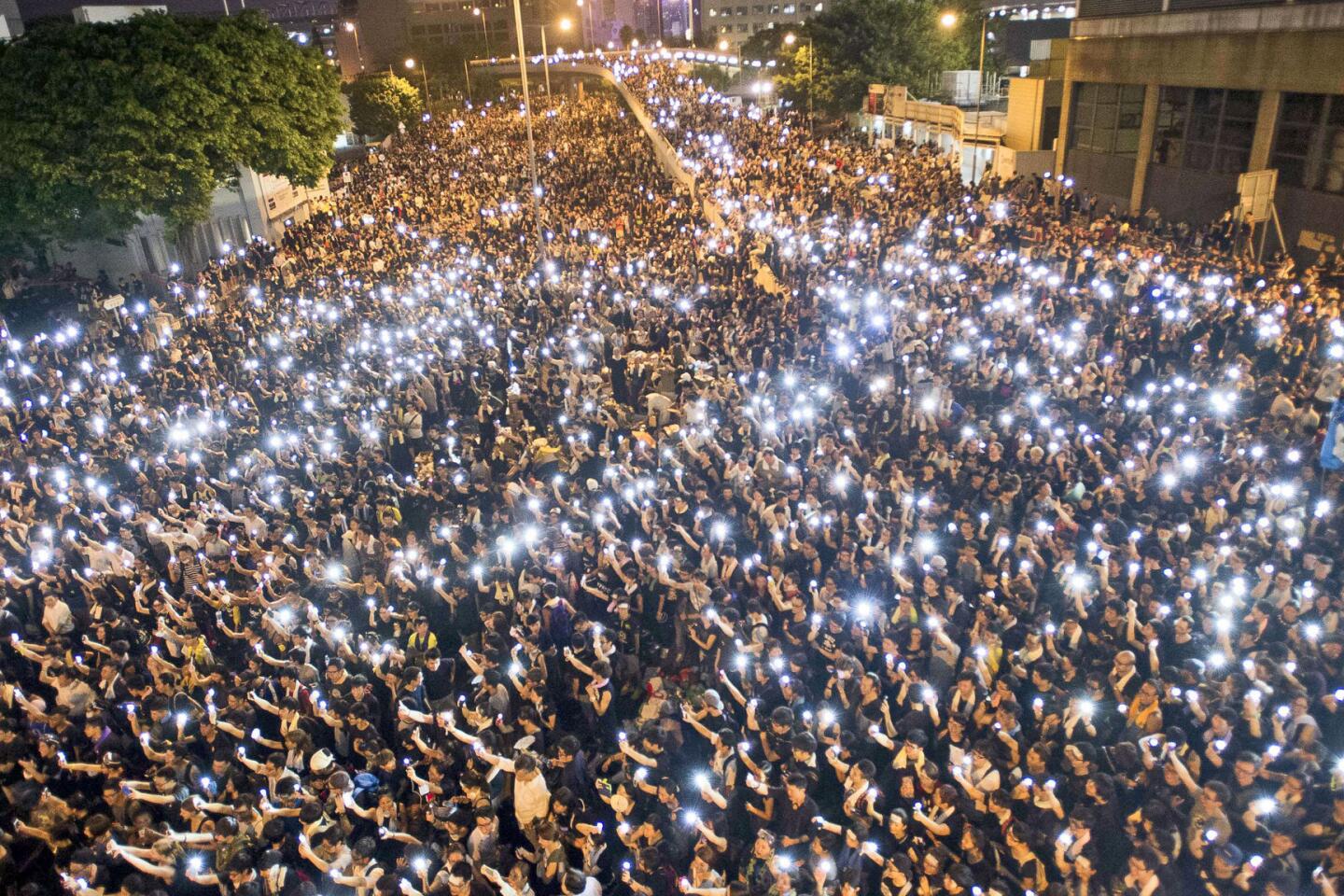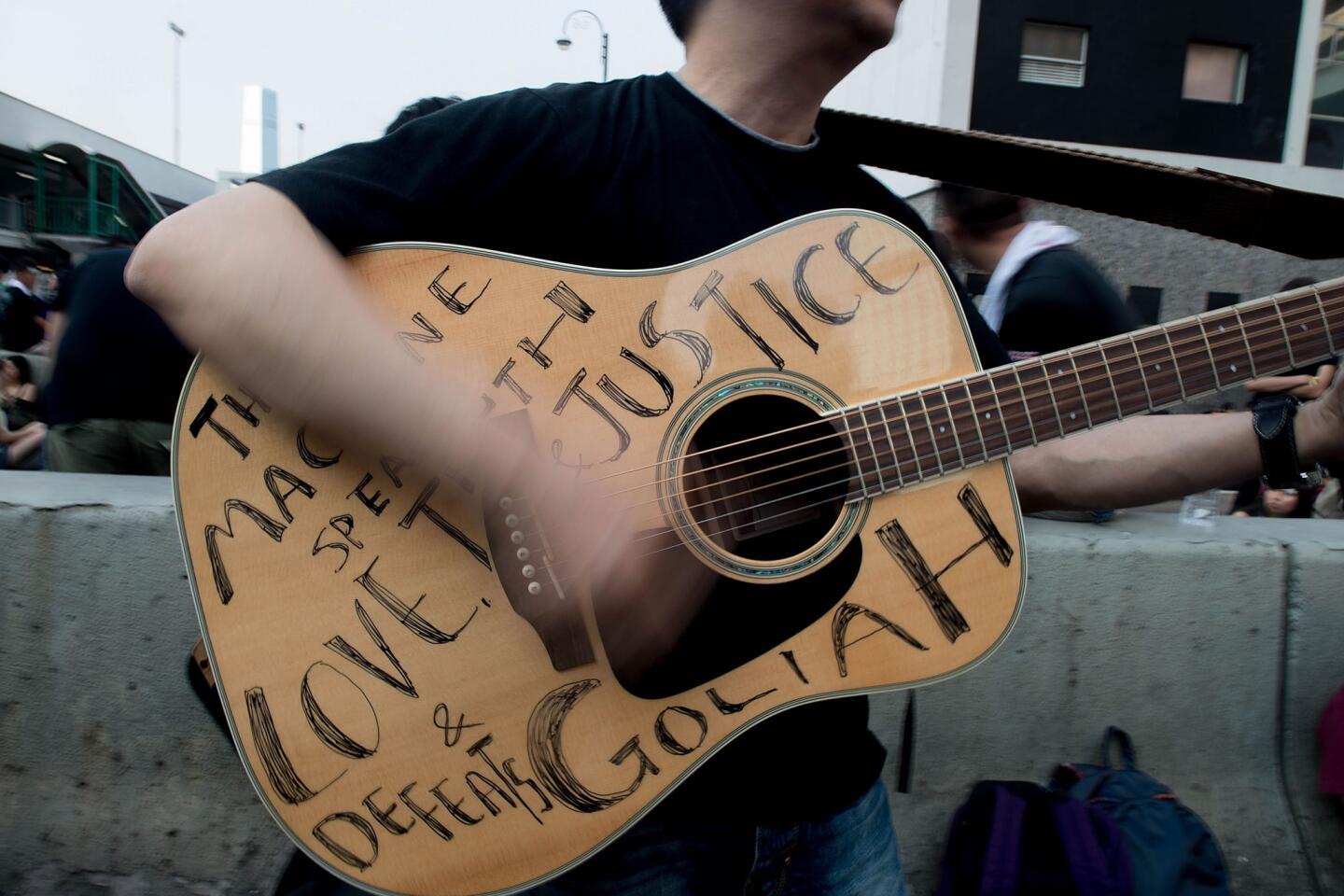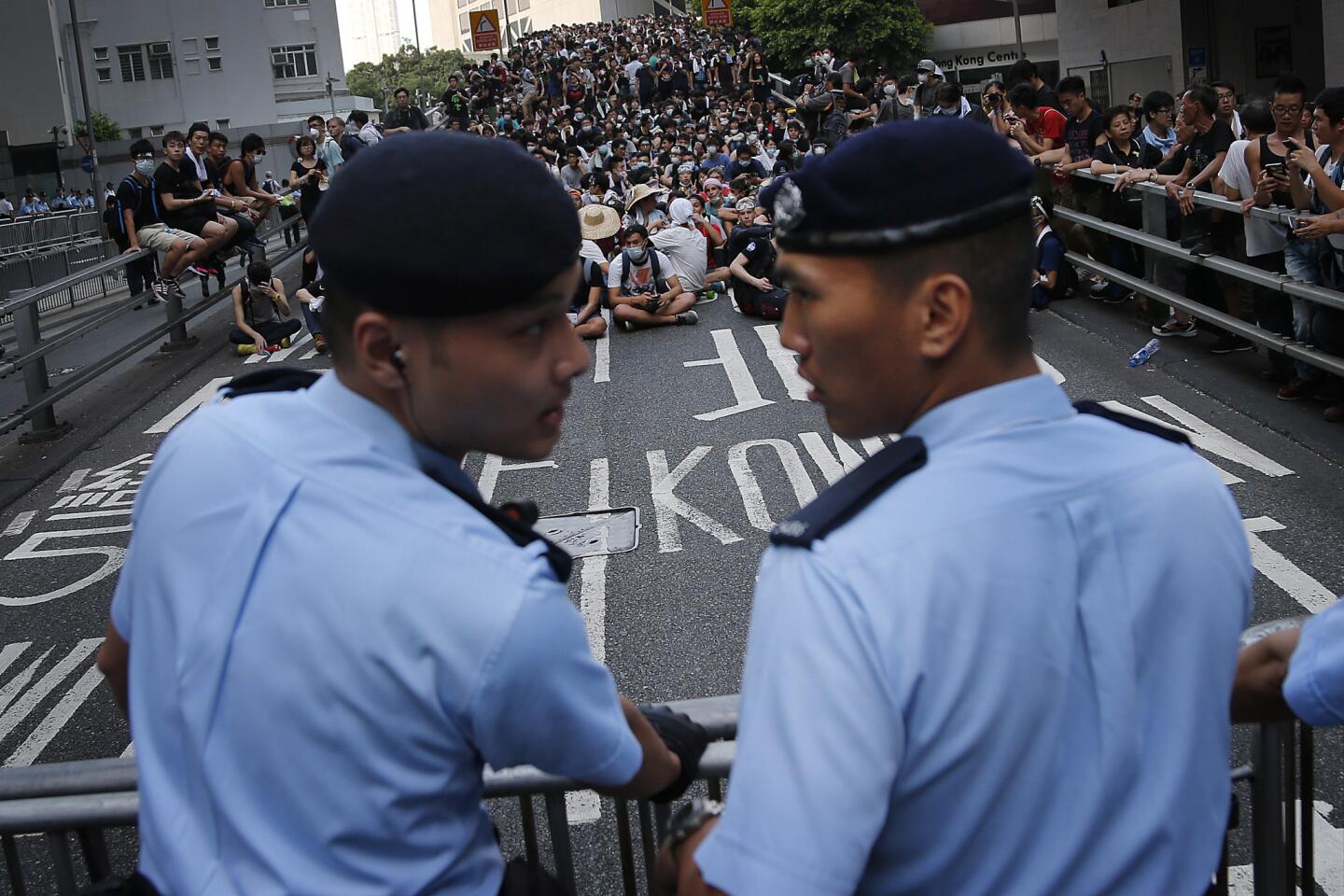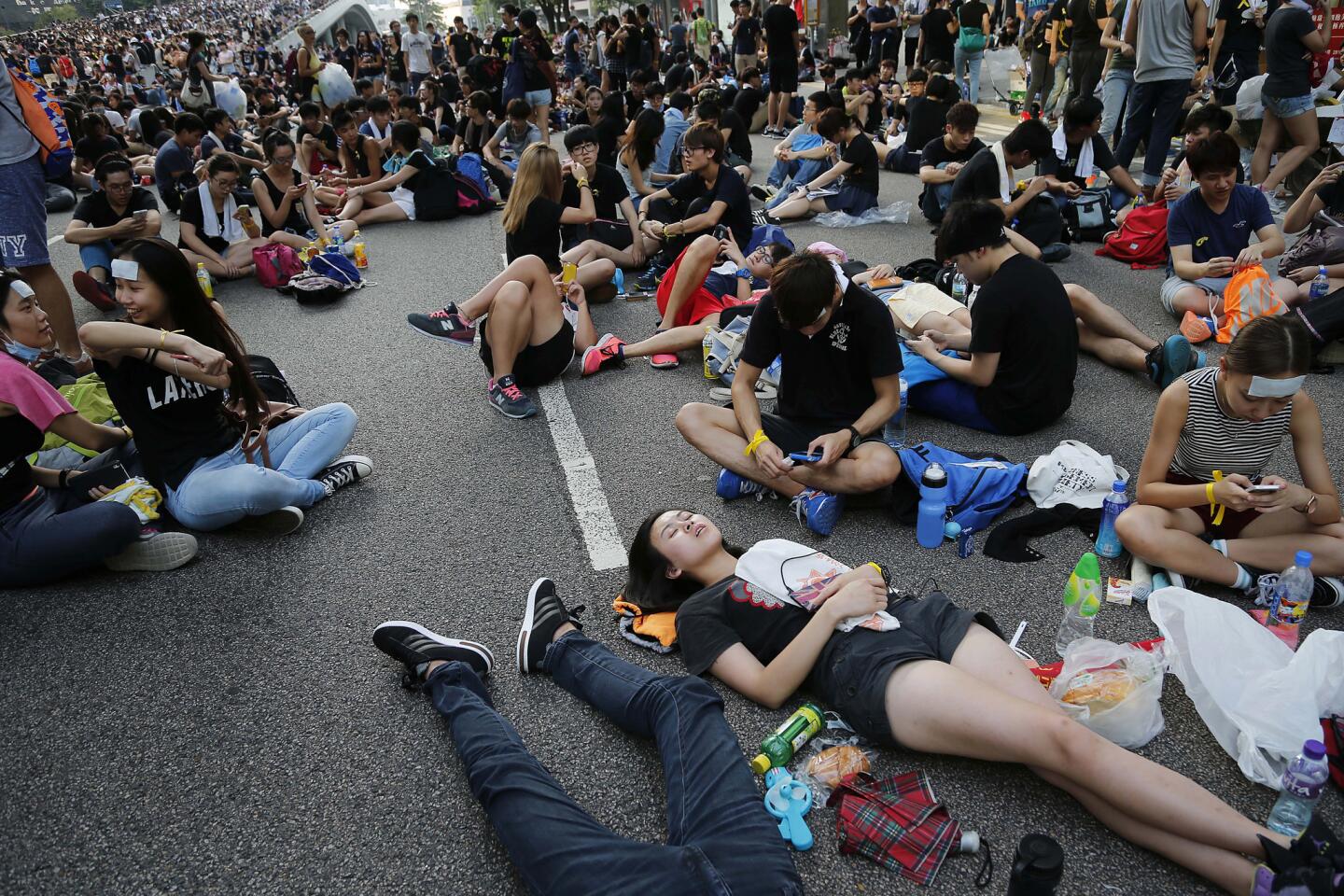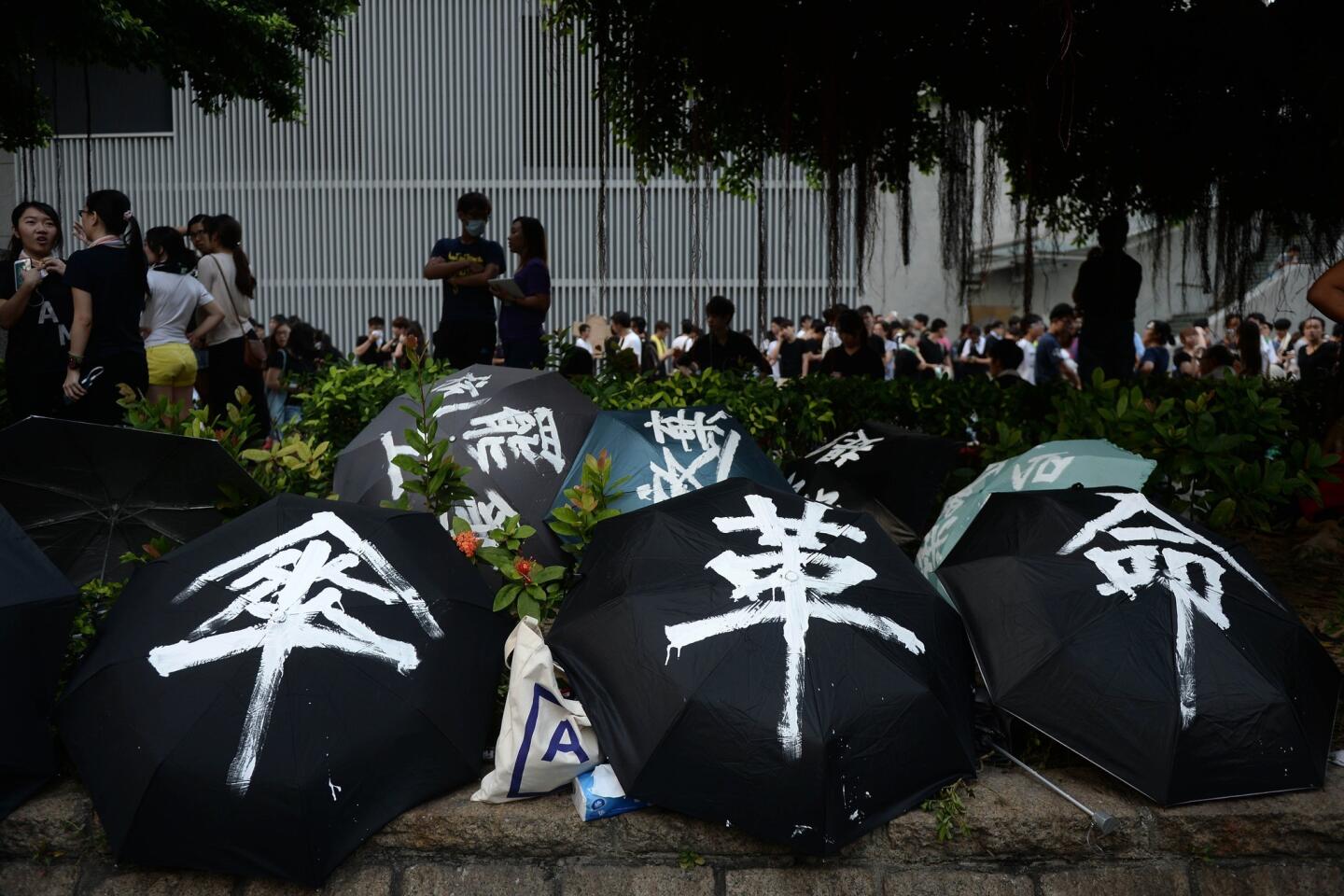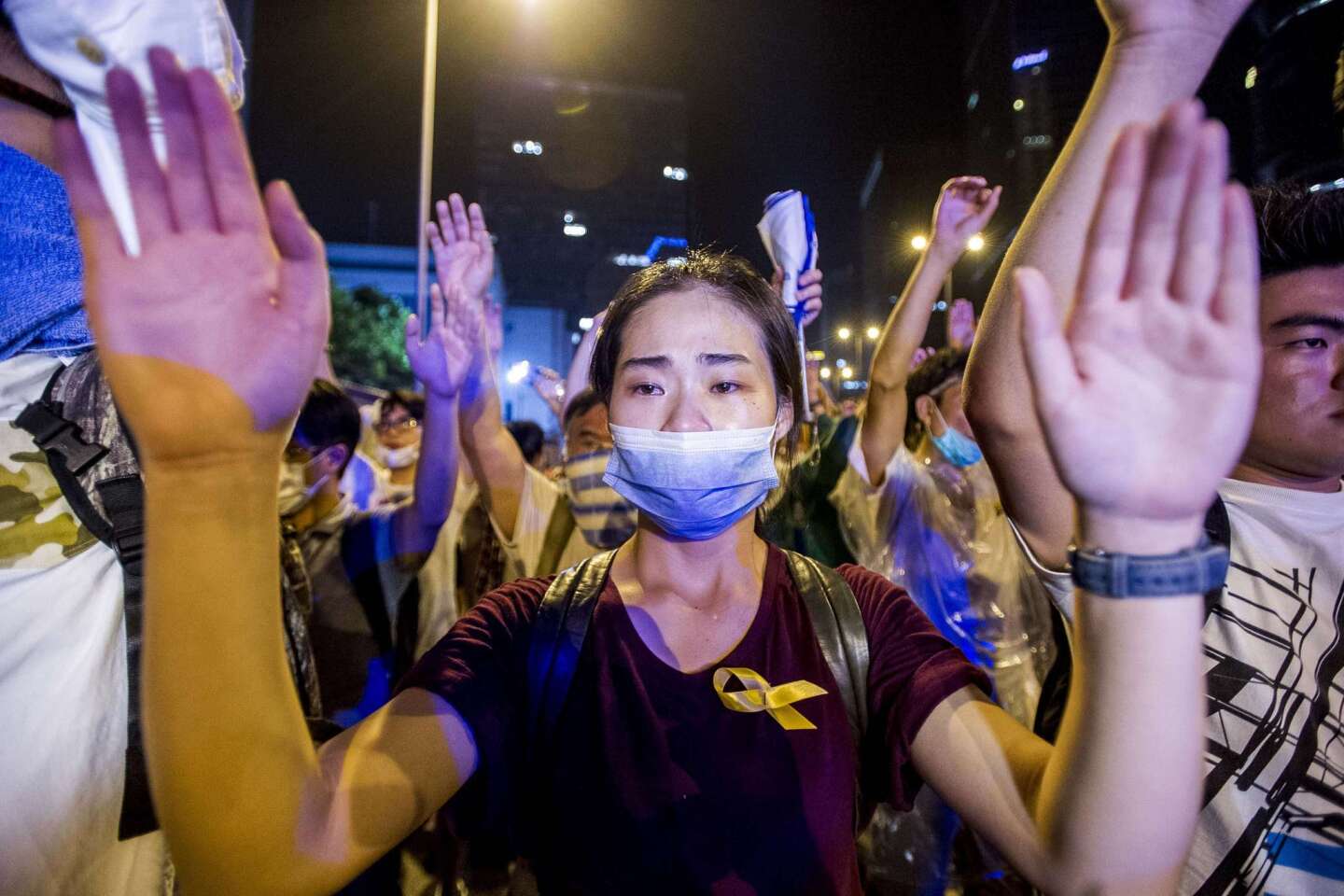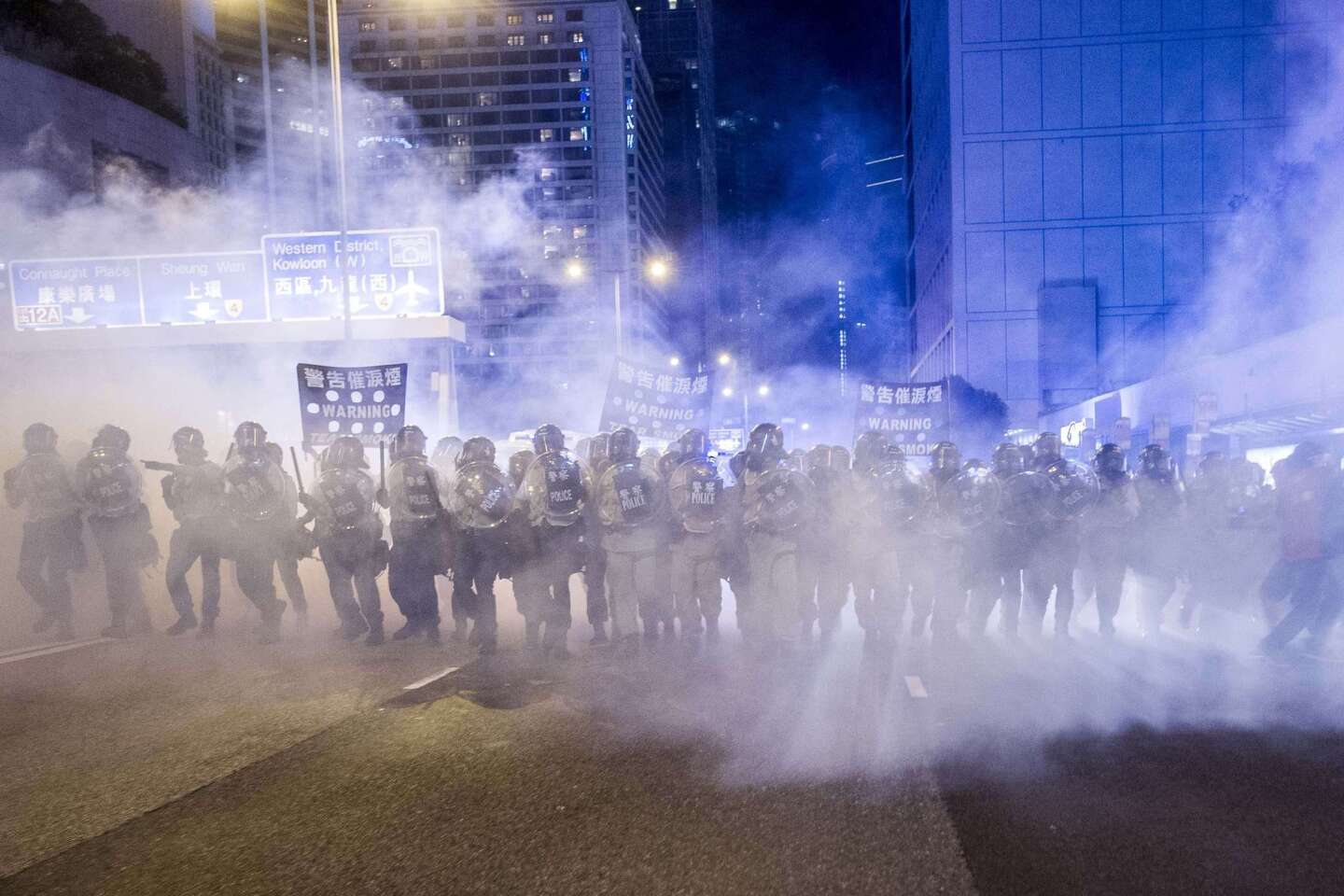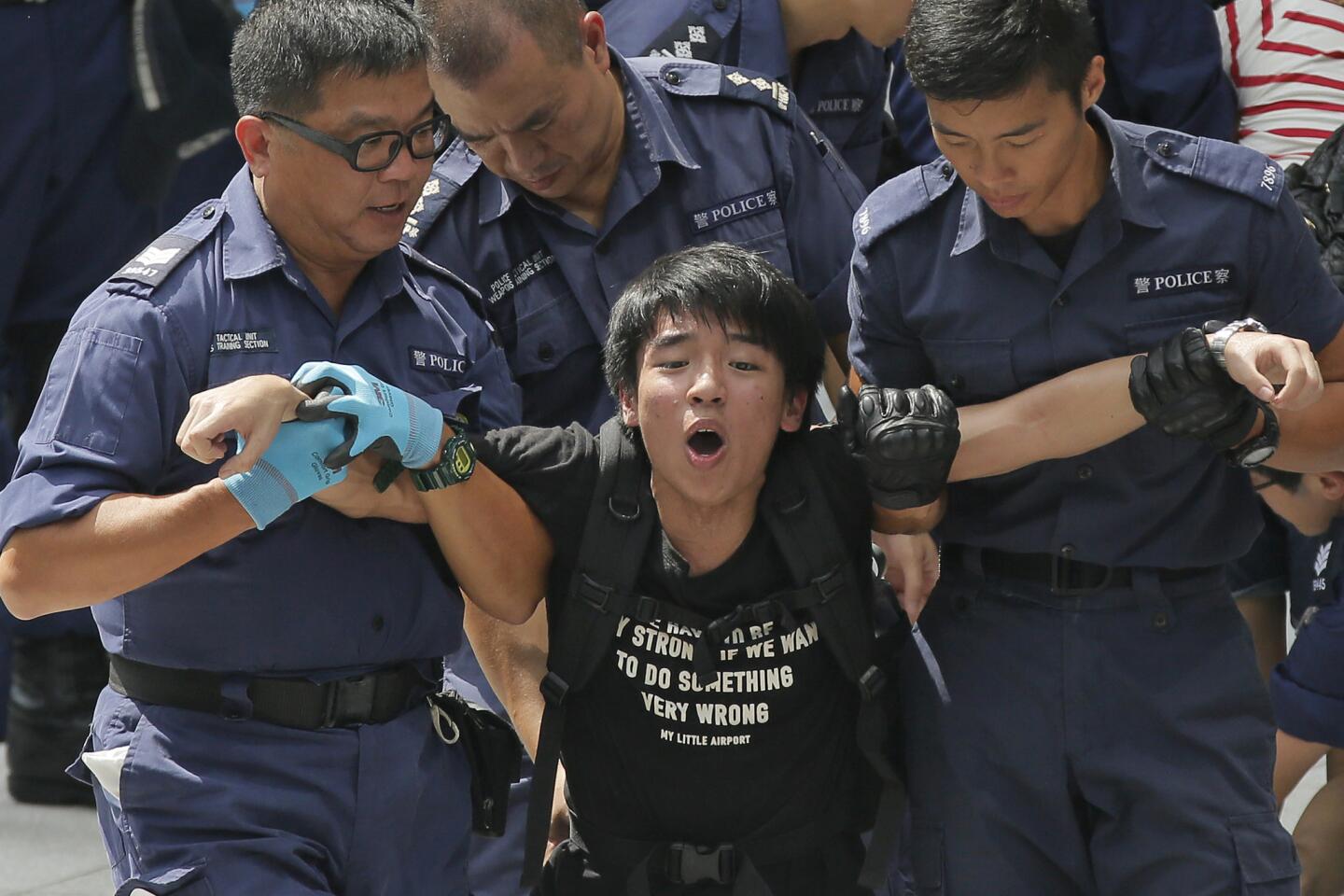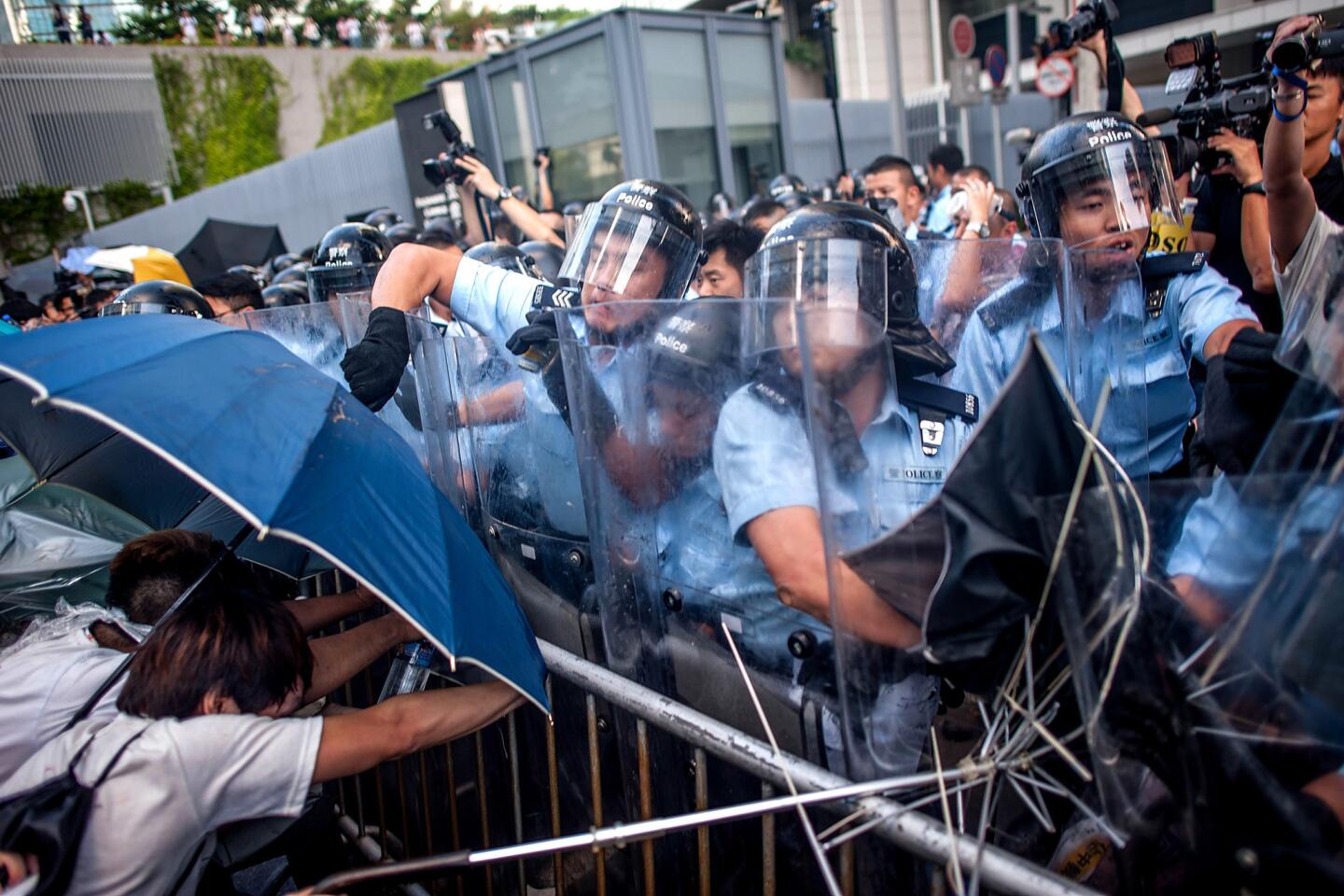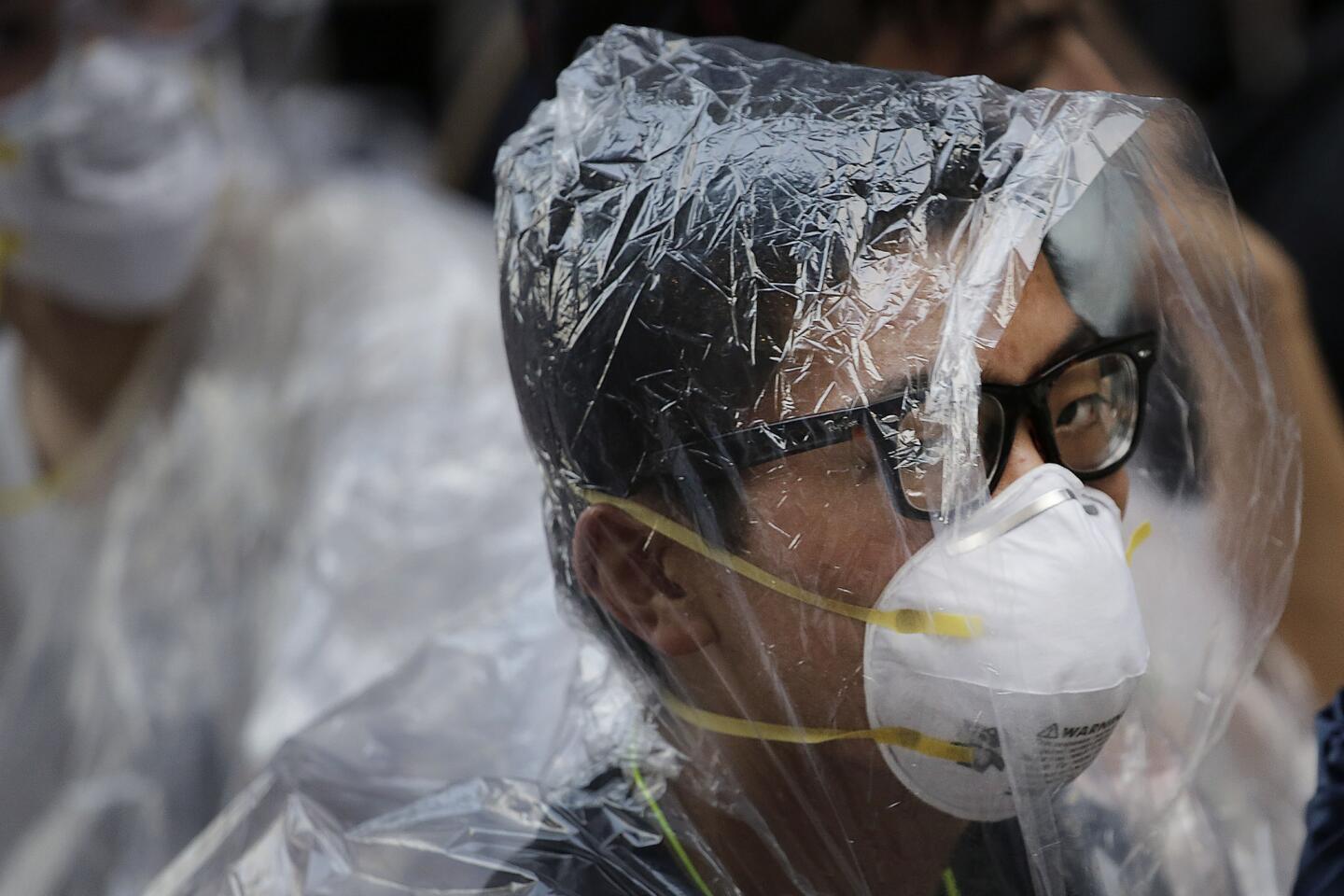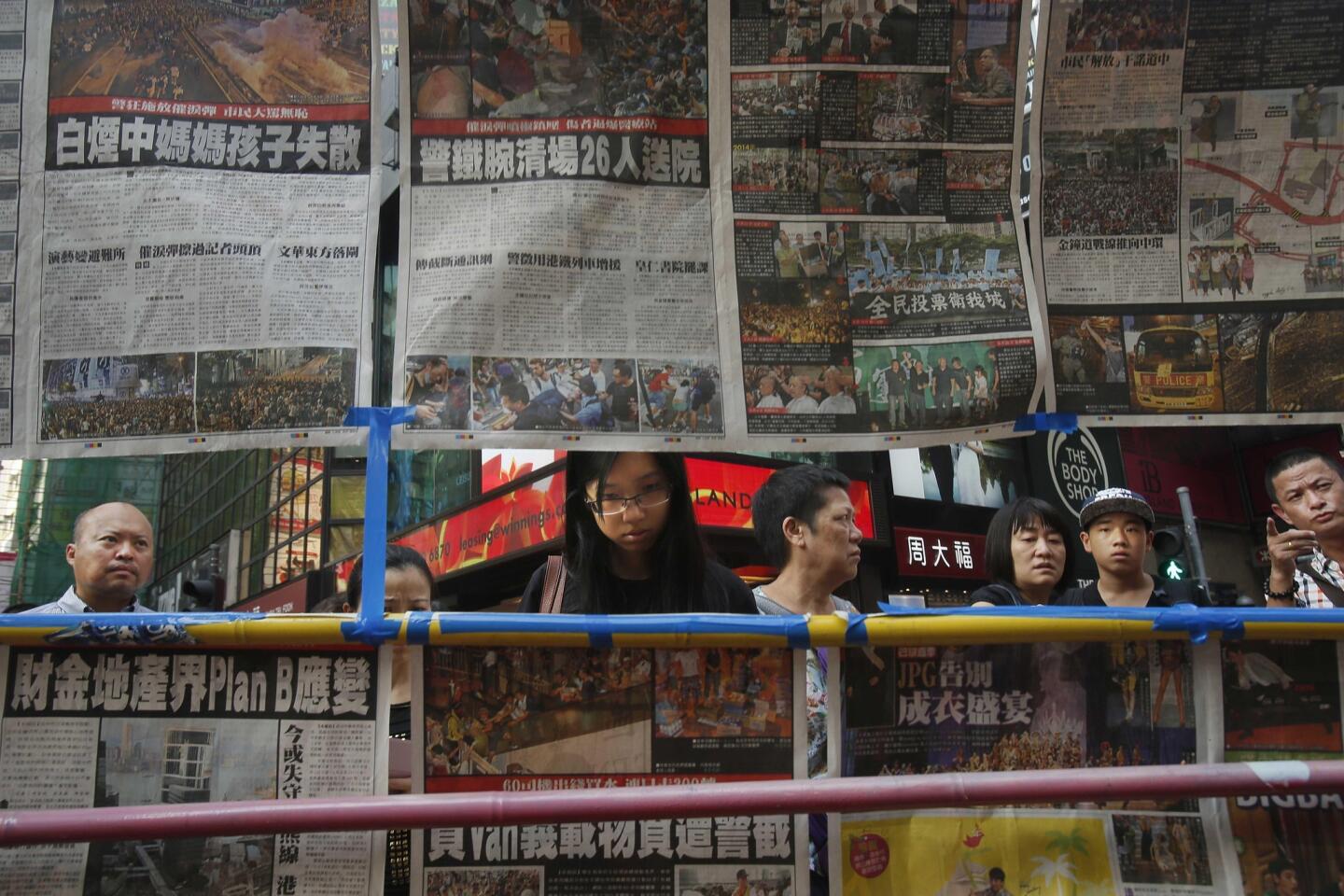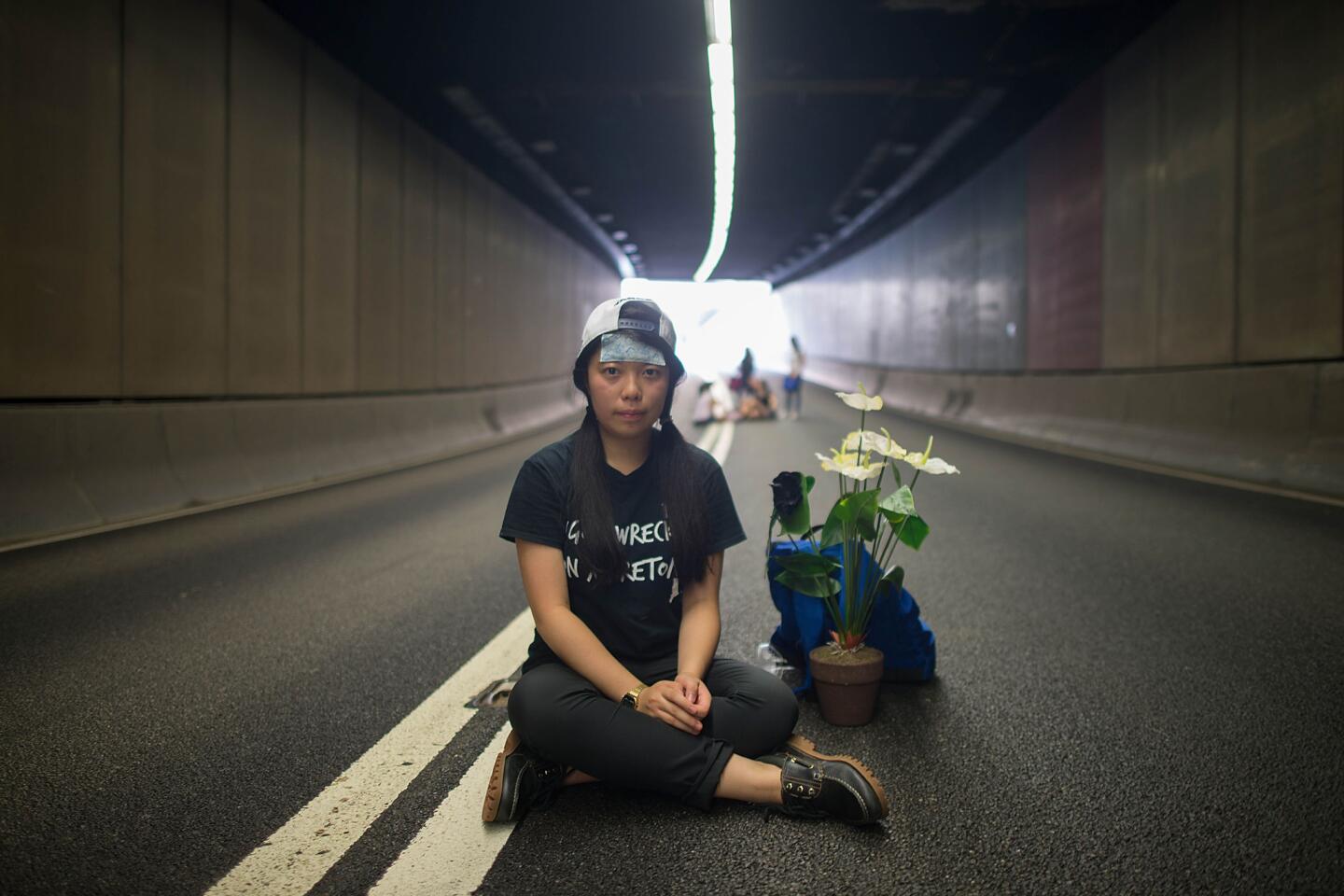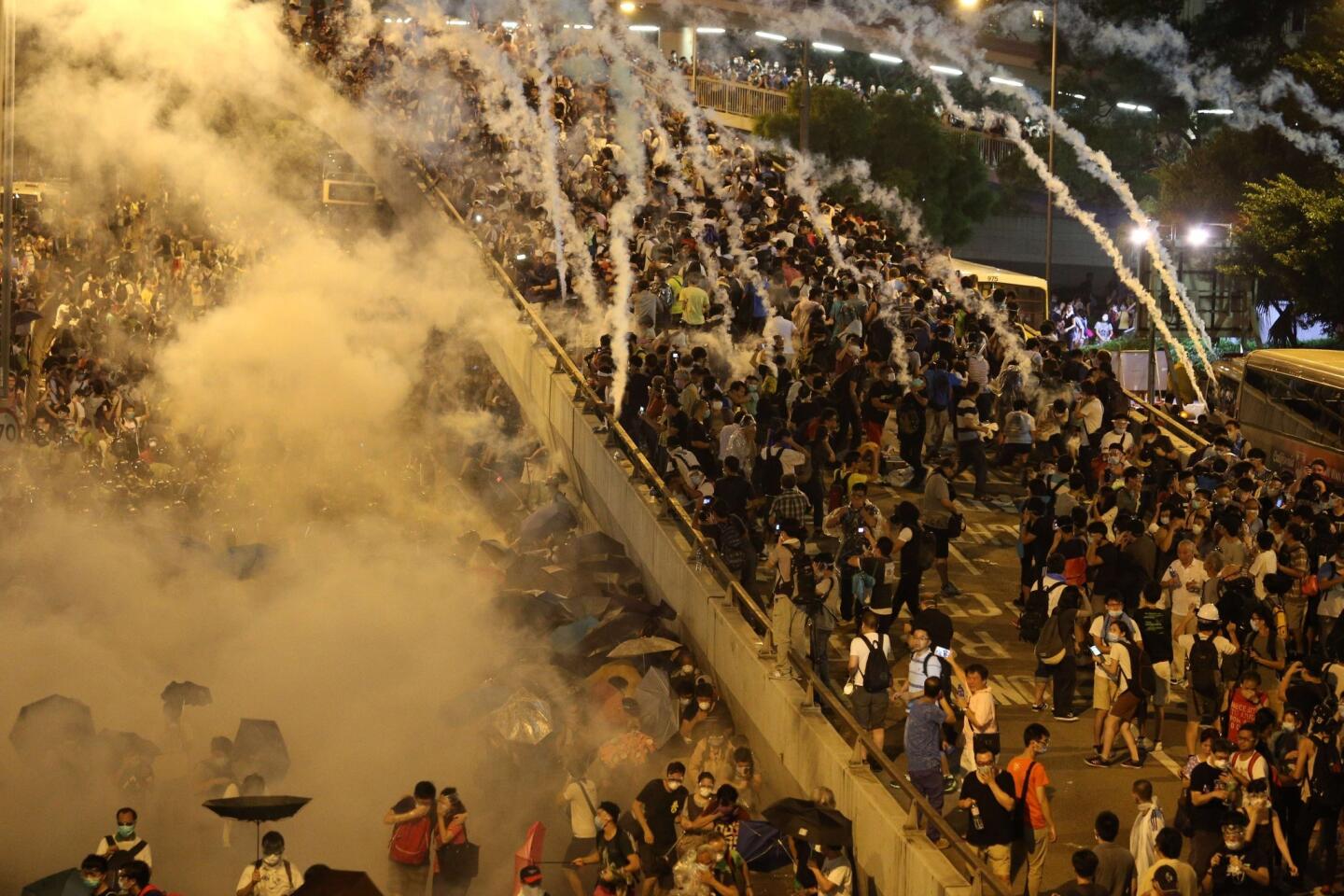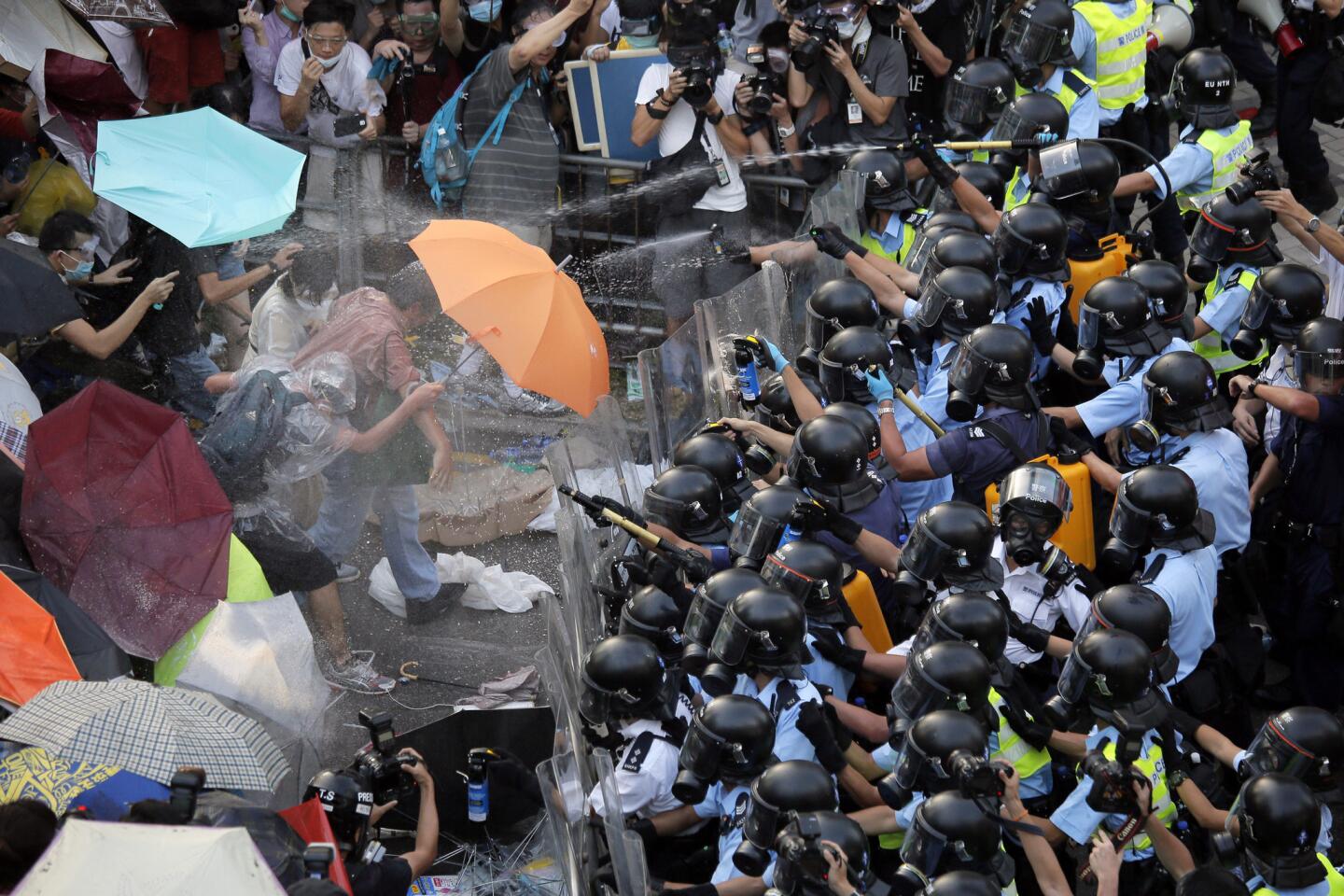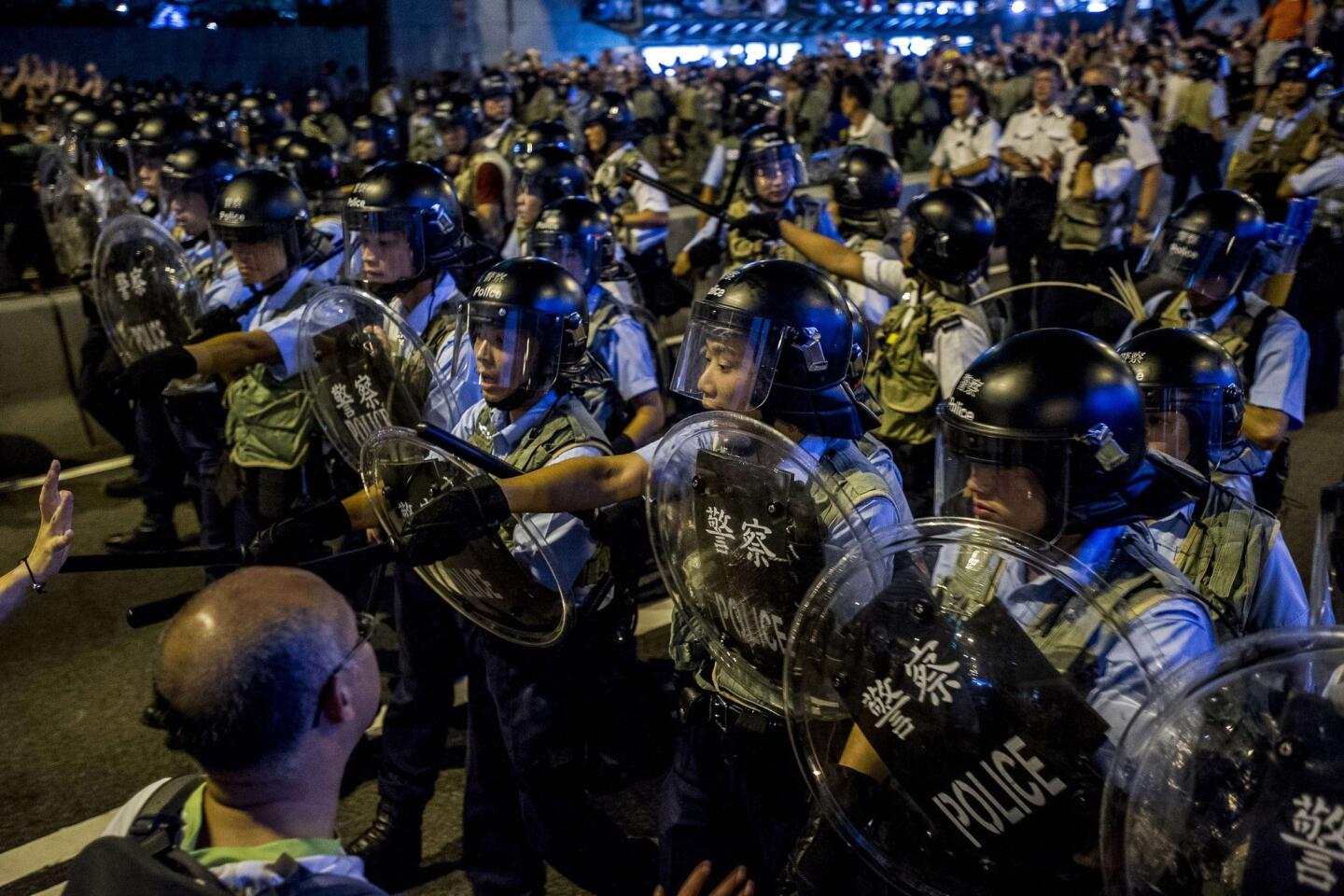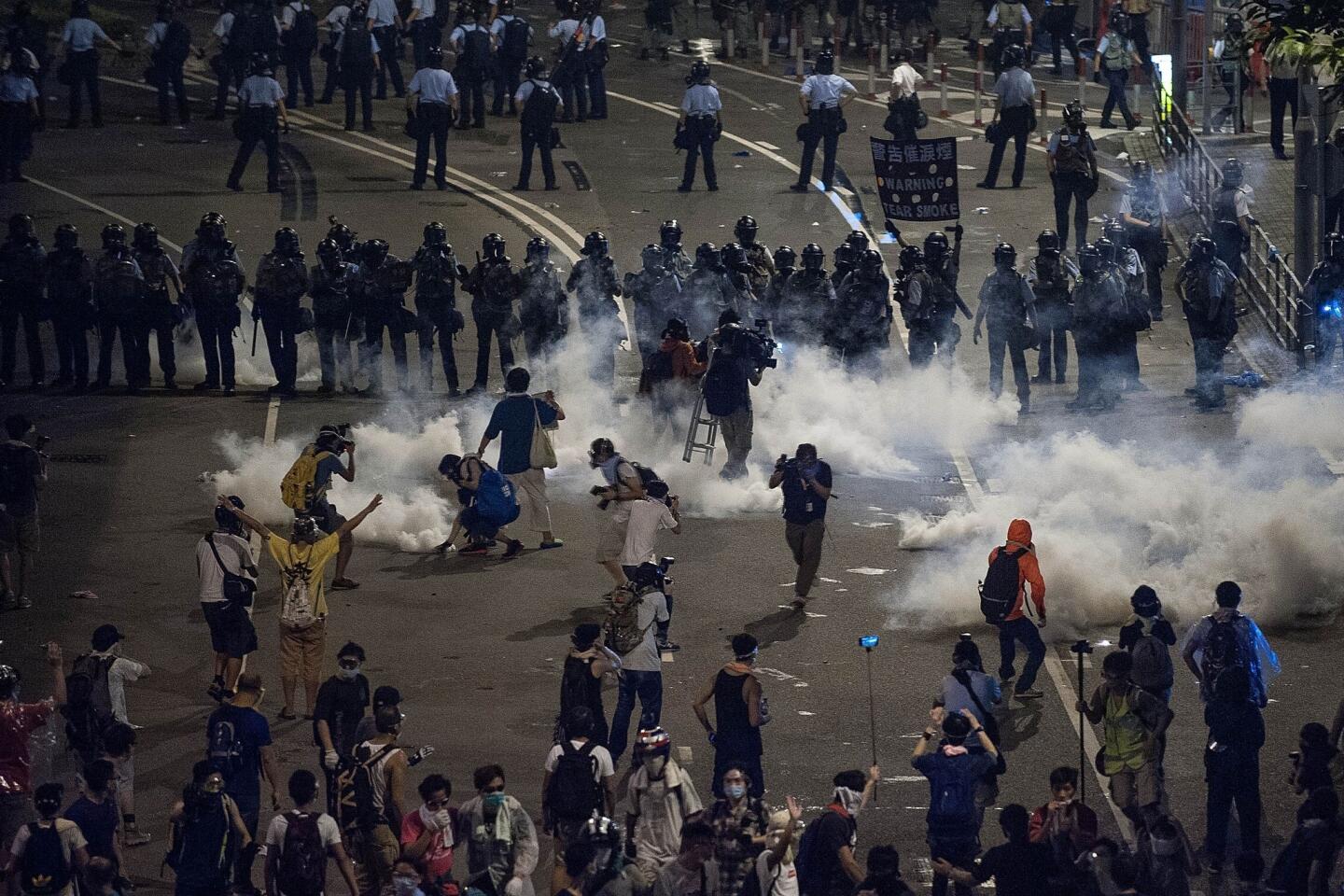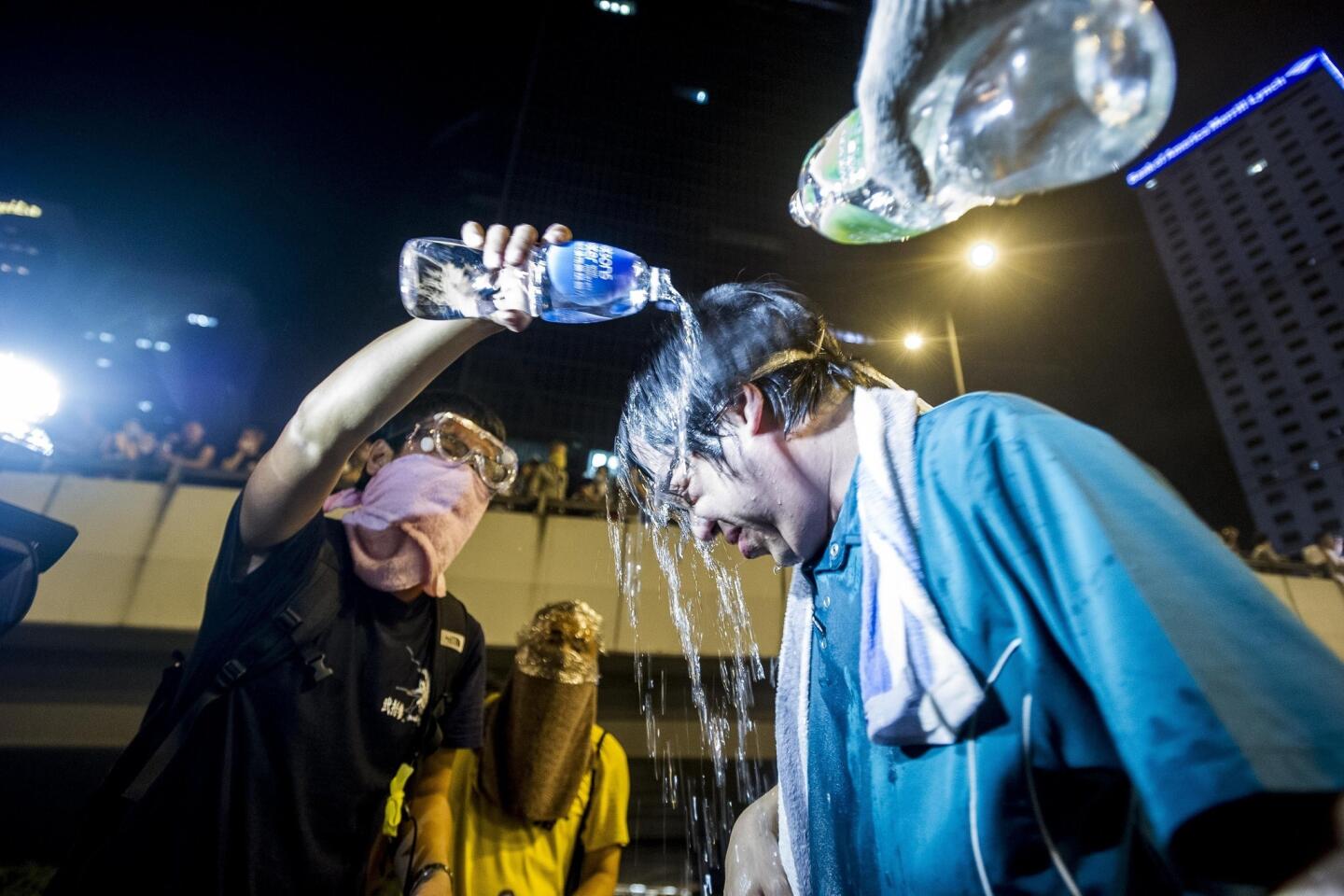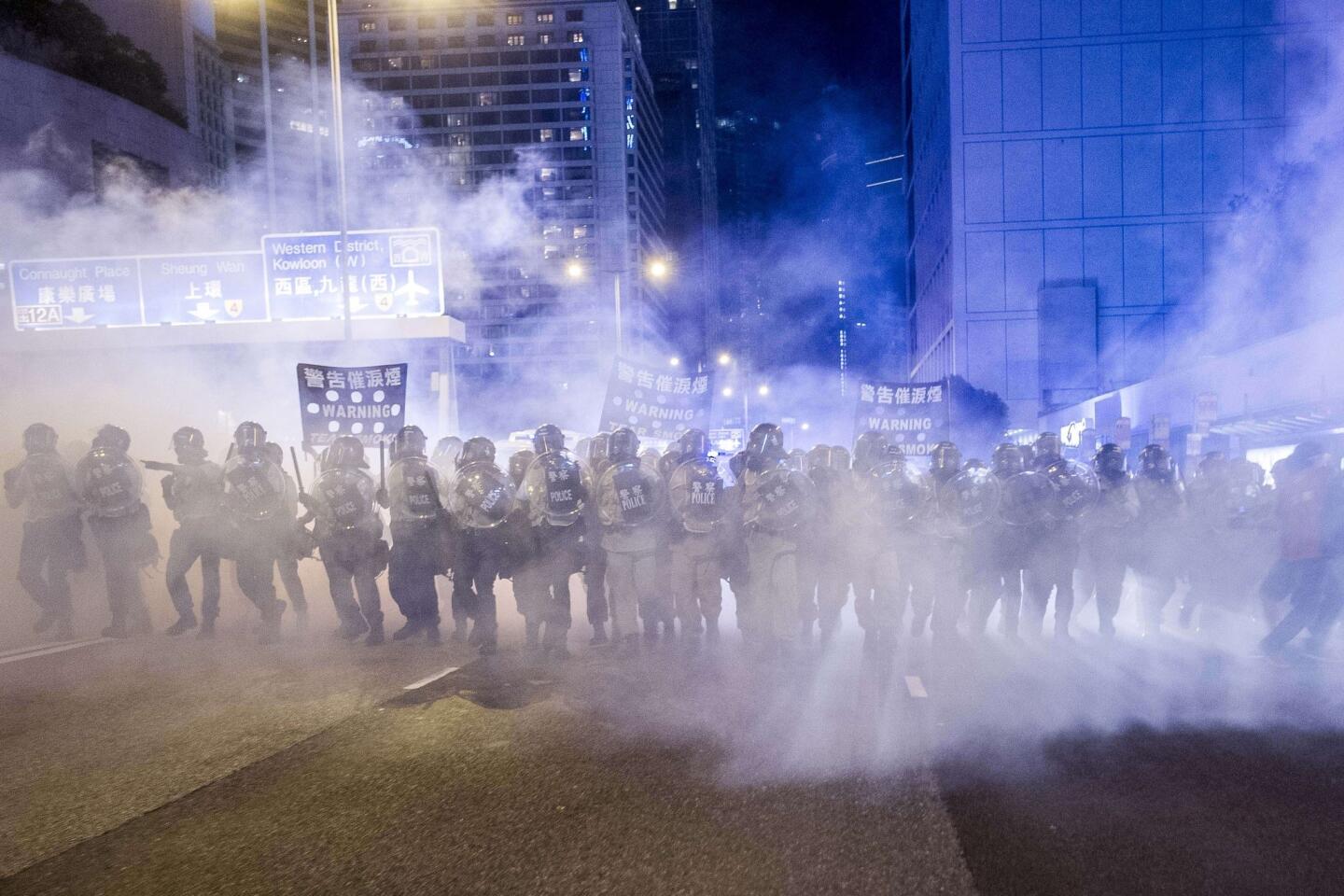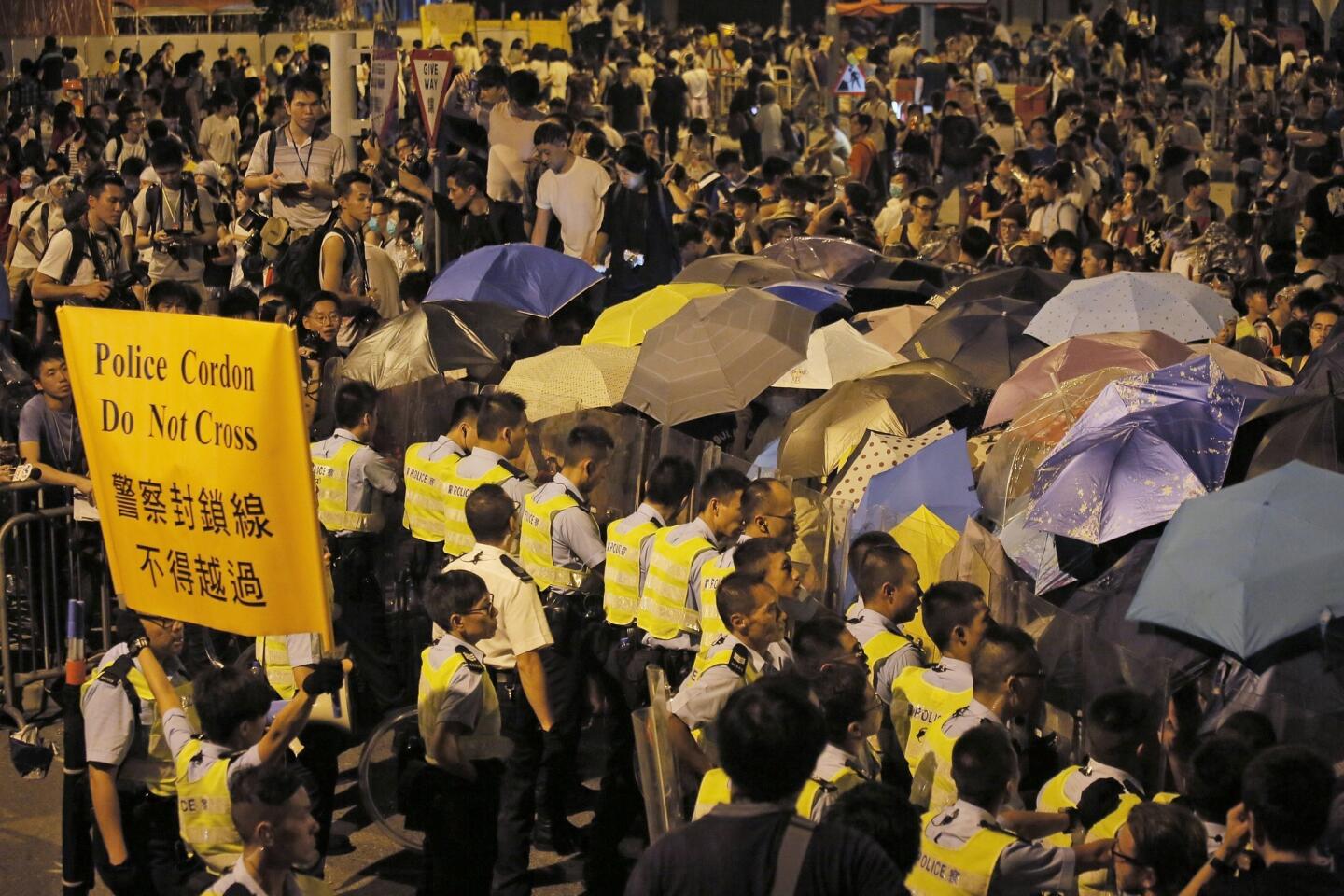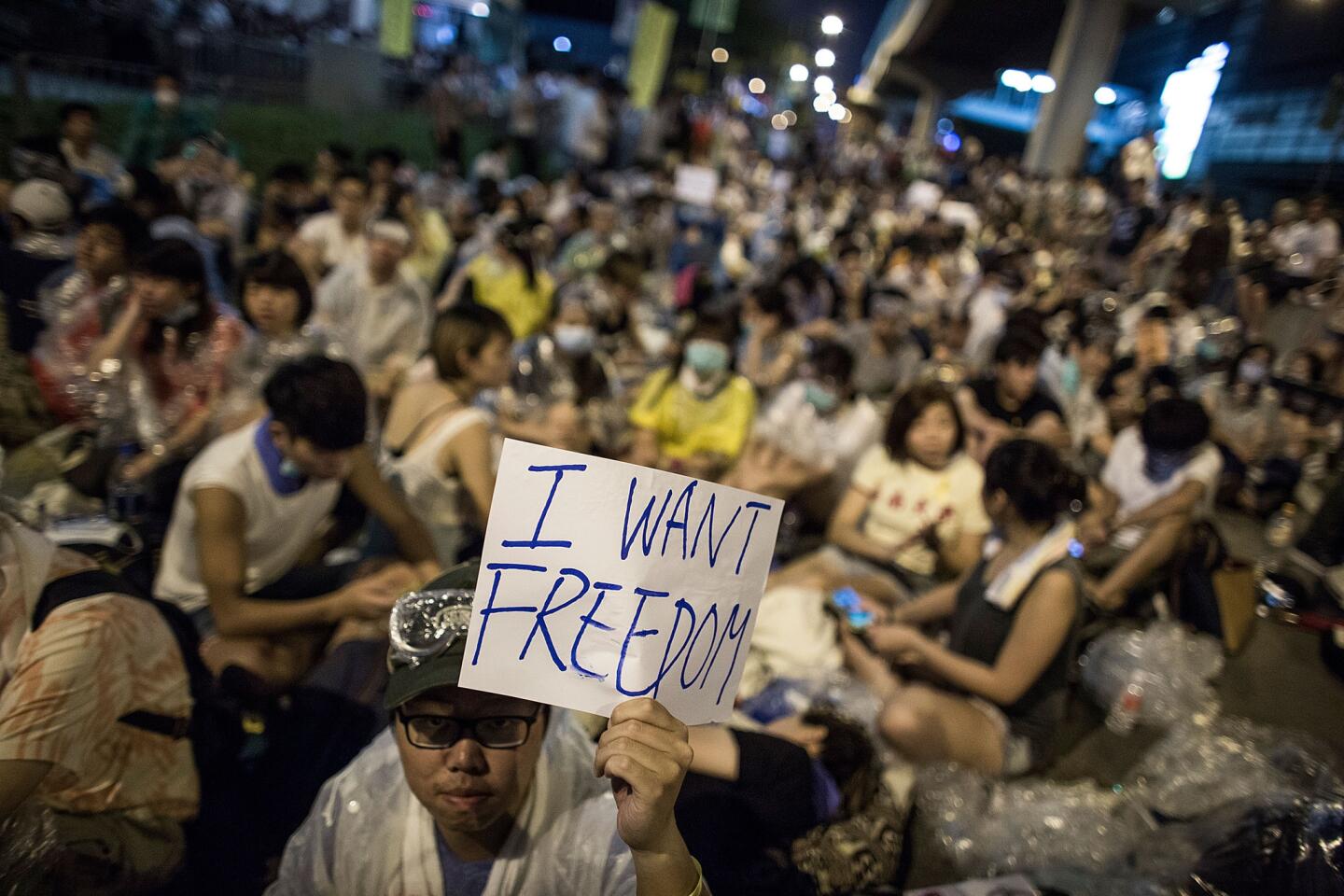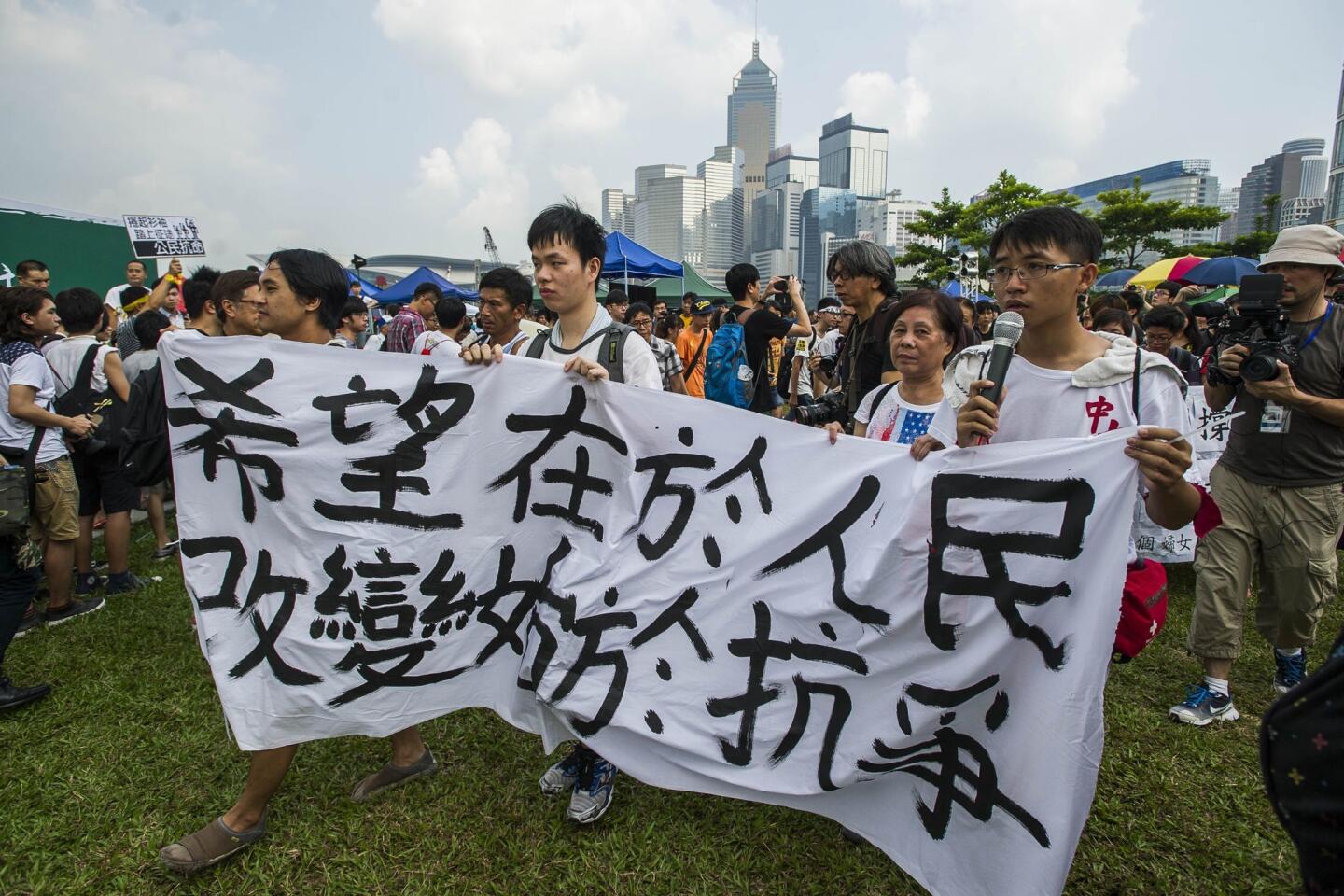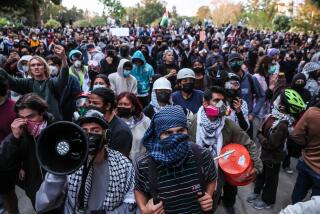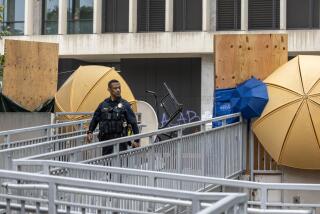Reporting from Hong Kong — Testifying at their trial Friday, student leaders of Hong Kong’s pro-democracy Umbrella Movement accused the government of clamping down on their right to demonstrate, which they said had driven them into civil disobedience in order to fight for democracy.
“We know neither the central government in Beijing nor our government would accept our idea of a free and fair election,” said Alex Chow, 25, one of three student leaders on trial. “So we decided we needed to use civil disobedience in order to establish a democratic system.”
Chow, a former president of the college group Hong Kong Federation of Students, faces a charge of participating in an unlawful assembly. Joshua Wong, 19, the movement’s best-known face and founder of the high school activist group Scholarism, is charged with participating in an unlawful assembly and inciting others to join. Nathan Law, 22, current president of the college federation, also was charged with inciting.
All three pleaded not guilty. The charges stem from a demonstration in which students stormed a newly fenced-off public plaza, a popular venue for protests, at the territory’s main government compound.
“I felt very angry about the fence,” said Wong. “My understanding is that it’s the right of every Hong Kong citizen to participate in demonstrations.”
Under cross-examination, Wong said that “based on my experience over the past three years of organizing protests, I never anticipated direct physical conflicts with the authorities. But these days in Hong Kong, even peaceful nonviolent demonstrations can carry legal consequences.”
In order to convict the students, the prosecution must prove they intended to cause physical injuries to people or property during an unlawful assembly.
I felt very angry about the fence. My understanding is that it’s the right of every Hong Kong citizen to participate in demonstrations.
— Hong Kong student protest leader Joshua Wong
Over the last two days, the student leaders endured hours of grilling from prosecutor David Leung, who sought to paint them as reckless colluders in a violent mass action, even as they professed to adhere to the principle of peaceful nonviolence in their protests.
“All night long you prodded others into using violence,” said Leung. “You were being a hypocrite, were you not?”
“I disagree,” said Law.
Hong Kong, a former British colony of 7.3 million people that’s now a semiautonomous Chinese territory, has maintained an independent judiciary under a separate constitution, which is to remain in force for 50 years after the 1997 transfer of sovereignty.
Under the constitution, the territory is guaranteed the right to vote for its leader at a future date. However, in August 2014, the standing committee of mainland China’s National People’s Congress decided to limit the choice of candidates for Hong Kong’s highest office to two or three candidates handpicked by a pro-Beijing committee.
The decision prompted a boycott of classes organized by the student leaders and escalated into the storming of the plaza, known as Civic Square to local activists.
The students all elected to testify after the judge had found that there was sufficient evidence for the government to bring charges against them.
Immediately after the storming of the plaza, police arrested Chow, Wong and at least 70 others. During the student leaders’ prolonged detention, demonstrators massed and police in riot gear failed to disperse them despite using force.
1/75
A pro-democracy protester rests in his tent with suitcase ready, before the police arrive to clear the main protest site in the Admiralty district of Hong Kong on Dec. 11. (Pedro Ugarte / AFP/Getty Images)
2/75
Workers clear barricades at an occupied area in the Mong Kok district of Hong Kong on Dec. 11. (Vincent Yu / Associated Press)
3/75
Workers remove a barricade in the Mong Kok district of Hong Kong on Nov. 25. (Philippe Lopez / AFP/Getty Images)
4/75
A student reads a book in his tent at the pro-democracy movement’s main protest site in the Admiralty district of Hong Kong on Dec. 2. (Johannes Eisele / AFP/Getty Images)
5/75
A security staff member, center, removes a barricade outside the Citic Tower at a protest site in the Admiralty district of Hong Kong on Nov 18. (Philippe Lopez / AFP/Getty Images)
6/75
An older man shares his opposing views with pro-democracy student protesters in Mong Kok. (Wally Santana / Associated Press)
7/75
Pro-democracy protesters push against police as they break down barricades and retake streets in Mong Kok. (Chris McGrath / Getty Images)
8/75
Police armed with bolt cutters, chainsaws and sledgehammers made a renewed attempt to remove barricades along a stretch of the main protest site held by pro-democracy demonstrators in Hong Kong on October 14, 2014. (Philippe Lopez / AFP/Getty Images)
9/75
Police officers arrest a protester in the Admiralty district of Hong Kong. Dozens of masked men rushed barricades at Hong Kong’s main pro-democracy site, triggering clashes as demonstrators tried to push them back and police struggled to contain the chaos.
(Pedro Ugarte / AFP/Getty Images) 10/75
Police cordon an area where pro-democracy demonstrators confront those protesting them in the Admiralty district of Hong Kong on Oct. 13. (Philippe Lopez / AFP/Getty Images)
11/75
A policeman, left, confronts a pro-democracy protester in the Admiralty district of Hong Kong on Oct. 13. (Xaume Olleros / AFP/Getty Images)
12/75
Pro-democracy demonstrators shout slogans at those protesting them in the Admiralty district of Hong Kong. (Pedro Ugarte / AFP/Getty Images)
13/75
A pro-democracy protester in the Admiralty district of Hong Kong, where police started removing street barricades at sites where demonstrators have been holding rallies, paralyzing parts of the Chinese financial hub. (Ed Jones / AFP/Getty Images)
14/75
Pro-democracy protesters stand next to barricades as police officers gather in the central district of Hong Kong on Oct. 13. (Ed Jones / AFP/Getty Images)
15/75
A pro-democracy protester sits in front of Hong Kong police in the Wan Chai area of Hong Kong on Oct. 13.
(Rolex Dela Pena / EPA) 16/75
A woman walks past a wall of messages of support for protesters in Hong Kong on Oct. 7. (Philippe Lopez / AFP/Getty Images)
17/75
A pro-democracy protester sleeps beneath messages of support in the Admiralty district of Hong Kong on Oct. 7. (Ed Jones / AFP/Getty Images)
18/75
A woman steps on a portrait of Hong Kong Chief Executive Leung Chun-ying depicted as a vampire as she steps around barricades set up by pro-democracy demonstrators in Hong Kong on Oct. 7.
(Philippe Lopez / AFP/Getty Images) 19/75
A government loyalist demonstrator shouts at democracy protesters in the Mong Kok area of Hong Kong on Oct. 3. (Jerome Taylor / AFP/Getty Images)
20/75
A group of men in masks rough up a man, right, who tried to stop them from removing barricades from a pro-democracy protest area in the Causeway Bay district of Hong Kong on Friday. (Alex Ogle / AFP/Getty Images)
21/75
Police take an injured man from the confrontation of pro-democracy student protesters and angry local residents in Mong Kok, Hong Kong, on Friday. (Wally Santana / Associated Press)
22/75
A pro-democracy student protester scales a traffic light pole in defiance of local residents demanding them to leave their occupied roads in Hong Kong on Friday. (Wally Santana / Associated Press)
23/75
A woman shouts during violent scenes in Mong Kok on Day 6 of the mass civil disobedience campaign Occupy Central in Hong Kong. (Alex Hofford / EPA)
24/75
A Hong Kong police officer confronts a protester. (Julie Makinen / Los Angeles Times)
25/75
Pro-democracy demonstrators face policemen outside the Legislative Counsel office in Hong Kong. Protesters want the territory’s Beijing-backed chief executive, Leung Chun-ying, to step down. He says he won’t. (Xaume Olleros / AFP/Getty Images)
26/75
An aerial view of violent scenes in Mong Kok, Hong Kong, on Day 6 of the mass civil disobedience campaign Occupy Central. (Alex Hofford / EPA)
27/75
Student demonstrators raise their hands to show their nonviolent intentions during a change of shift for local police. A mass gathering in Hong Kong is a reaction to an August decision by China’s central government that would require a pro-Beijing committee to screen candidates in the territory’s first direct elections for chief executive in 2017. (Wong Maye-E / Associated Press)
28/75
Protesters shout slogans at police outside the government headquarters in Hong Kong. (Anthony Wallace / AFP/Getty Images)
29/75
Notes of support are posted on the wall of an encampment of pro-democracy student protesters outside the government complex in Hong Kong. (Wally Santana / Associated Press)
30/75
A protester working as a medical volunteer sleeps in a makeshift supplies area on an overpass in Hong Kong. (Anthony Wallace / AFP/Getty Images)
31/75
A man passes umbrellas displaying slogans in the protesters’ encampment outside the Hong Kong government complex. (Wally Santana / Associated Press)
32/75
A protester and a Hong Kong police officer are wedged tightly together. (Alex Hofford / EPA)
33/75
A man holds a sign that reads “Don’t go to school” as a pro-democracy rally continues in Hong Kong. (Xaume Olleros / AFP/Getty Images)
34/75
A demonstrator near government headquarters in Hong Kong checks his phone. (Philippe Lopez / AFP/Getty Images)
35/75
A pro-democracy protestor sits in the road near the Hong Kong government headquarters. (Laurent Fievet / AFP/Getty Images)
36/75
A pro-democracy protester sleeps at Tamar Park in the Admiralty district of Hong Kong. (Xaume Olleros / AFP/Getty Images)
37/75
A Civil Disobedience sign written on the street in chalk in Hong Kong, where thousands of pro-democracy supporters continue to occupy the streets surrounding Hong Kong’s financial district. (Chris McGrath / Getty Images)
38/75
A woman holds a placard at a large pro-democracy protest in Hong Kong. (Alex Ogle / AFP/Getty Images)
39/75
Barricades are installed to block traffic on a multilane highway as pro-democracy protests take place in Hong Kong. (Alex Ogle / AFP/Getty Images)
40/75
Umbrellas are painted with slogans at the protest site as the numbers of protesters continue to grow in Hong Kong. (Paula Bronstein / Getty Images)
41/75
A pro-democracy activist shouts slogans on a street near the government headquarters where protesters have made camp. (Wong Maye-E / Associated Press)
42/75
Mainland China tourists walk past the luxury boutiques of Tsim Shai Tsui district in Hong Kong. Despite the expansion of the pro-democracy protests to the luxury shopping district, most mainlanders were more interested in shopping than in political activities. (Wally Santana / Associated Press)
43/75
Pro-democracy demonstrators sit on tram tracks with a graffito of an umbrella on the fourth day of the mass civil disobedience campaign in Hong Kong. (Dennis M. Sabangan / EPA)
44/75
Pro-democracy demonstrators display placards as they gather near a ceremony marking China’s 65th National Day in Hong Kong on Wednesday. (Philippe Lopez / AFP/Getty Images)
45/75
Protesters shout slogans outside a flag-raising ceremony marking China’s National Day on Wednesday where Hong Kong’s embattled leader Leung Chun-ying attended. (Vincent Yu / AP)
46/75
Protesters sing and wave their cellphones after a massive thunderstorm passed over outside the Hong Kong government complex on Sept. 30. (Chris McGrath / Getty Images)
47/75
Pro-democracy protesters hold up their mobile phones after heavy rain in Hong Kong. (Anthony Wallace / AFP/Getty Images)
48/75
Thousands of pro democracy supporters continue to occupy the streets surrounding Hong Kong’s financial district on Sept. 30. (Anthony Kwan / Getty Images)
49/75
A pro-democracy demonstrator gestures after police fired tear gas near the Hong Kong government headquarters. (Xaume Olleros / AFP/Getty Images)
50/75
Pro-democracy protesters use umbrellas to shield themselves from heavy rain. (Anthony Wallace / AFP/Getty Images)
51/75
Protesters sing and wave their cellphones after a massive thunderstorm outside the Hong Kong government complex. (Chris McGrath / Getty Images)
52/75
High school students hand out water and food outside the Hong Kong government center. (Chris McGrath / Getty Images)
53/75
A pro-democracy protester confronts the police during a demonstration in Hong Kong. (Xaume Olleros / AFP/Getty Images)
54/75
A police car is blocked by protesters after thousands of people block a main road to the financial central district outside the government headquarters in Hong Kong. (Vincent Yu / Associated Press)
55/75
Pro-democracy demonstrators hold up their mobile phones during a protest near the Hong Kong government headquarters on Sept. 29. (Dale de la Rey / AFP/Getty Images)
56/75
A protester sings songs and plays guitar on a street in Hong Kong as thousands of pro-democracy supporters have remained in the streets of Hong Kong for another day of protests. (Anthony Kwan / Getty Images)
57/75
Pro-democracy protesters sit on a road as they face off with police in Hong Kong. (Wong Maye-E / Associated Press)
58/75
Pro-democracy protesters take afternoon naps on the streets in Hong Kong on Monday. (Wong Maye-E / Associated Press)
59/75
Umbrellas used to shield demonstrators from pepper spray and the sun are displayed during a pro-democracy protest near the Hong Kong government headquarters. (Dale de la Rey / AFP/Getty Images)
60/75
A demonstrator gestures opposite policemen during a pro-democracy protest in Hong Kong. (Xaume Olleros / AFP/Getty Images)
61/75
Police officers stand in a cloud of tear gas during a demonstration in Hong Kong. (Xaume Olleros / AFP/Getty Images)
62/75
A student is taken away by policemen at the government headquarters in Hong Kong. (Vincent Yu / Associated Press)
63/75
Police officers reacts outside a government complex in Hong Kong, as thousands of students started a week-long boycott of classes in protest against Beijing’s conservative framework for political reform in Hong Kong. (Anthony Kwan / Getty Images)
64/75
A student pro-democracy protester covers his face in plastic wrap to protect against pepper spray in the event that activists face a stand-off with local police on Monday. (Wong Maye-E / AP)
65/75
Visitors view the latest newspaper coverage following clashes between activists and police at a sit-in protest in Hong Kong on Monday. (Wally Santana / AP)
66/75
A protester sits in the middle of a tunnel in Central on Monday in Hong Kong. (Anthony Kwan / Getty Images)
67/75
Police fire tear gas at pro-democracy demonstrators near the Hong Kong government headquarters on Sept. 28, 2014. (Aaron Tam / AFP/Getty Images)
68/75
Riot police use pepper spray against protesters after thousands of people blocked a main road to the financial central district in Hong Kong on Sept. 28. (Vincent Yu / Associated Press)
69/75
Police confront pro-democracy protesters. (Xaume Olleros / AFPGetty Images)
70/75
Demonstrators disperse as tear gas is fired by police on Sept. 29, 2014. (Anthony Kwan / Getty Images)
71/75
Protesters pour water over the head of a fellow demonstrator during riots that followed a pro-democracy protest on Sept. 28, 2014. (Xaume Olleros / AFPGetty Images)
72/75
Police officers stand in a cloud of tear gas. (Xaume Olleros / AFPGetty Images)
73/75
Pro-democracy protesters confront police in Hong Kong early Saturday. (Vincent Yu / Associated Press)
74/75
A protester holds a sign during a pro-democracy rally in a plaza at Hong Kong’s main government compound Saturday. (Lam Yik Fei / Getty Images)
75/75
Students protesting for greater democratic rights march in Hong Kong on Sept. 24. (Xaume Olleros / AFP / Getty Images)
The emboldened demonstrators then took over major roadways in encampments, which were eventfully cleared on court orders. But little political change has been achieved since.
Although police arrested a total of 48 people in early 2015 for their alleged involvement in the pro-democracy protests, only Wong, Chow and Law have been prosecuted so far.
In contrast to the colorful mass sit-in that had transfixed the world for weeks, the five-day trial was a decidedly low-key affair. No cameras are allowed inside Hong Kong courtrooms, and local laws forbid participants from commenting on ongoing cases. The student defendants have refrained from commenting on social media lest they run afoul of the gag order and be found in contempt of the court.
The trial was attended by a score of spectators, who flashed looks of disgust and whispered disapproval as prosecutors relentlessly pressed the students to recall details of their deliberations in the lead-up to the storming.
As the student defendants left the courthouse Friday afternoon at a bouncy gait, they were greeted by a dozen elderly supporters, including one man in his 80s using a walking stick.
“Civic Square belongs to us citizens,” the group said in a chorus, some pumping their fists.
The students remain free on $64 bail. A verdict is expected by late May or early June at the earliest.
Law is a special correspondent.
